
View Cart Checkout
- No products in the cart.
Subtotal: £ 0.00
Training and certification
- Careers at Sea

Cruise ship industry
Quick links, recruitment process.
CV’s, Letter and Application forms
Interview Guidance
Useful links
Social media
Industry overview
Recruitment
Oil and Gas
Merchant navy, renewable energy, commercial diving, cruise ship training, training and certification required for the cruise ship industry.
Welcome to our section on training and certification required to work onboard cruise ships. Here you’ll find everything you need to know about what is required to work onboard cruise ships.
If you are just starting a career at sea you will need the following mandatory STCW courses:
Elementary First Aid Personal Survival Techniques Personal Safety and Social Responsibilities Fire Prevention and Fire Fighting Proficiency in Security Awareness (as of 1st January 2014)
Although these modules can be done separately it is far more cost effective to be done as a package – the STCW Basic Safety Training package – which will save you over 25%:
STCW-95 Basic Safety Training package
Additional courses to help kick start your career in the cruise industry:
STCW Proficiency in Designated Security Duties
Crowd Management STCW Crisis Management & Human Behaviour
Passenger Safety (get in touch directly for more information)
What else will you need?
ENG1 Medical certificate – Find your nearest approved doctor in the UK (fixed fee of £80)
Seamans Discharge book and card – Click here for more information
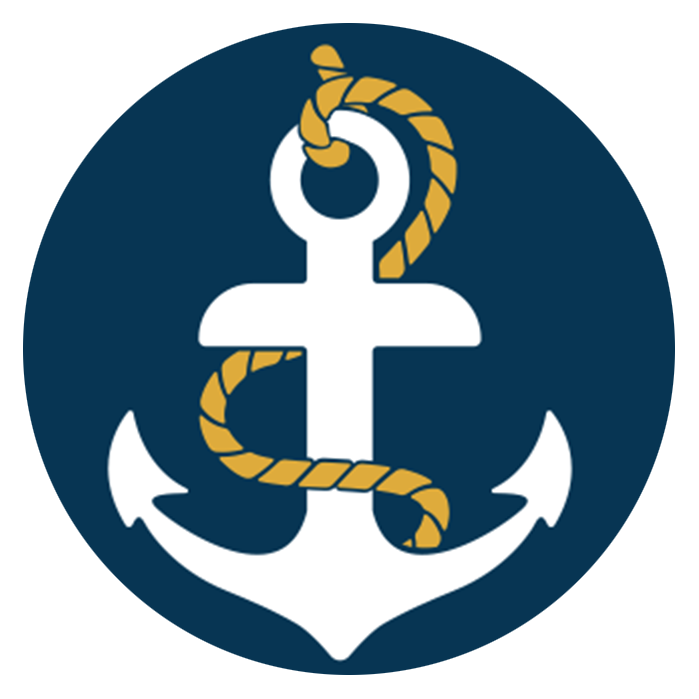
NEED HELP Deciding a course?


Understanding Cruise Ship Officer Stripes
Let’s talk about stripes, baby. Nope, we’re not talking about zebras, we are talking about the stripes on the shoulders and sleeves of so many uniforms onboard a cruise ship. These stripes, more formally known as epaulettes, denote not only what rank an officer is, but can also offer insight into which department they work in as well as in some cases what they do on onboard. This post will help you understand what cruise ship officer ranks correspond to what cruise ship officer stripes .
While most people know there are 3 departments onboard a cruise ship – Technical, Deck, and Hotel – when it comes to stripes though there are a few extra categories to know about, namely: medical, environmental, IT, and human resources.
Can You Still Have a Cruise Ship Officer Rank Without Stripes?
Now, not every crew member onboard a ship that has “officer privileges” wears a uniform with stripes. When I was working onboard I never had a uniform with epaulettes. There is a tricky category that exists in the cruise ship world known as “stripe equivalents”. These are crew that’s uniforms do not feature stripes but they get privileges and benefits as if they had that equivalent amount of stripes. These are hotel positions and are things like: Cruise Director, Cruise Staff, Shore Excursions, Youth Programs, Production Managers, Cast Members, etc. For a deeper understanding of overall cruise ship rank structure, take a look at this post Understanding Cruise Ship Ranks . (Note: on some cruise lines some of the above positions will be uniformed striped positions)
Take a look at the below guide to understand how cruise ship crew officer ranks affect how many stripes they wear. The next time you’re onboard you can play a little bit of I-Spy and who’s who and impress your friends! Onboard ship these stripes are part of a much larger cruise ship rank system and the jobs listed here are just a sampling of all of the different jobs that exist on a cruise ship. Understanding what the epaulettes mean is just part of understanding the complex system that keeps a cruise ship running.
Without any further a-do, let’s talk about stripes.
Note: For nearly everything below, aside from the top four or so positions and especially within the hotel department there are differences between cruise lines. This is to act as a general guide and not a definitive guide.
The Color Between the Stripes Denotes Department, Not Rank
You may have noticed while onboard that some of the stripes have colors between them. Here’s a quick outline of what those mean:
Note: 1) This outline is based on what it is on many cruise lines. It is not the same amongst every cruise line but the base concepts are the same. 2) Gold stripes are most conventional; however, silver stripes are sometimes used. These can for instance be seen on some TV shows showing yacht-life.
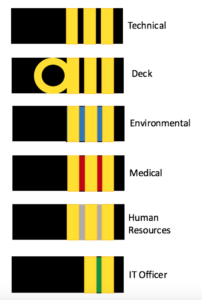
- Technical Department : Gold stripes, no cloth in between stripes, no loop at the top; they do sometimes have propellers at the top.
- Deck Department : Gold stripes, no cloth in between stripes, with a loop, diamond, or anchor at the top.
- Hotel Department : Gold stripes, white cloth in between stripes, no loop or propeller. **Reliable sources have told me that some cruise lines hotel departments have silver stripes instead of gold.**
- Medical : Gold stripes, red cloth in between, no loop or propeller
- Environmental : Gold stripes, blue cloth in between. No loop or propeller.
- Human Resources Department : Gold stripes, grey cloth in between. No loop or propeller.
- IT : Gold stripes, green cloth in between. No loop or propeller. (Green on some lines is for environmental)
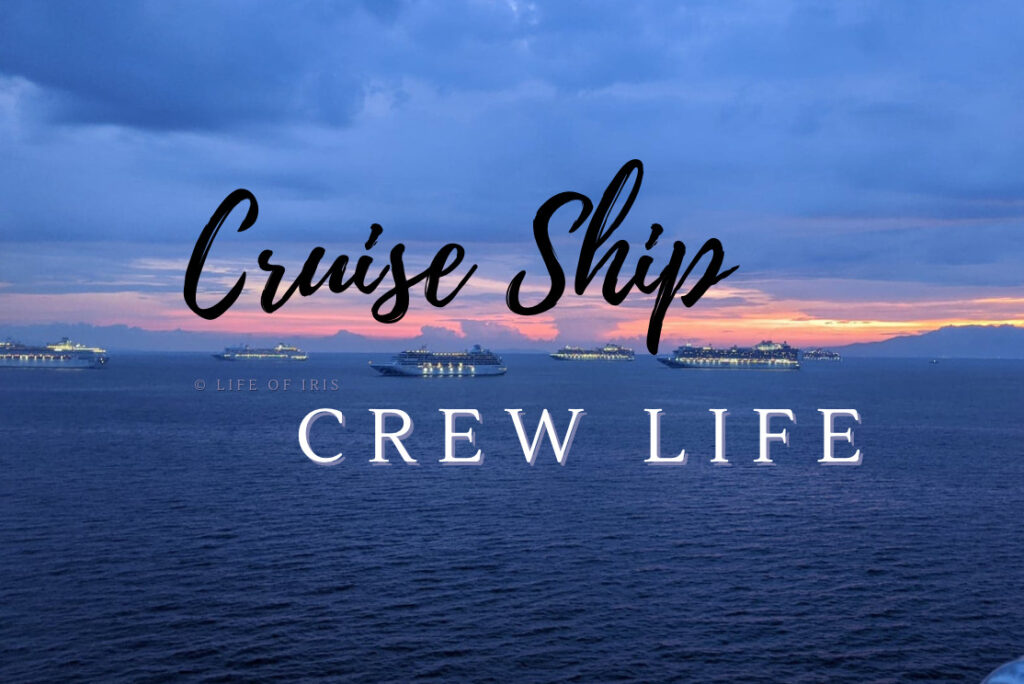
Want to know more about cruise ship crew life? From dating onboard to how crew get their mail…here’s a guide to cruise ship crew life .
How Many Stripes Do Different Cruise Ship Officer Ranks Have?
As you may have guessed, with greater stripes comes greater responsibility. Yes, the more stripes you have the higher your rank.
Rank Affects Onboard Privileges
There are slight differences in privileges amongst the cruise ship officer ranks. The most notable (other than responsibility and salary) is cabin. Typically from two stripe up the cabin will have a porthole. Three stripe and up might even have a regular sized window.
There are some subtle other differences. Some cruise ship officers of a certain rank might get free dinners in certain specialty restaurants, may get a discount in the onboard shops, or might even get to sit on a bar stool in a passenger lounge. There are lots of subtle ways that how many stripes and the corresponding rank affect life onboard a cruise ship.
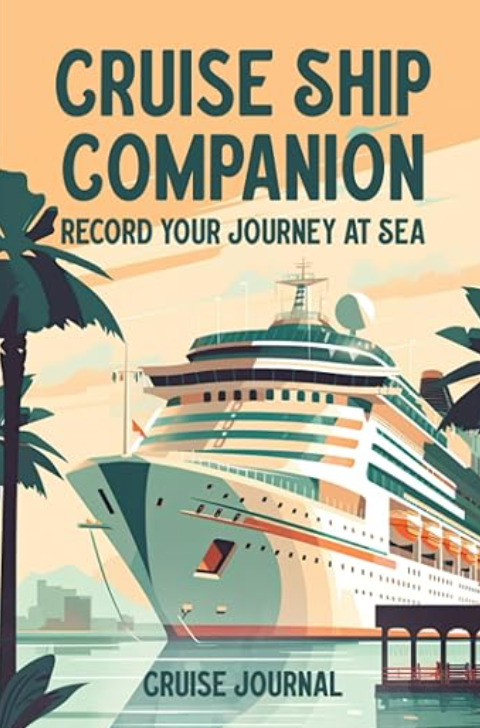
Half Stripes Are a Thing
Did you know that you can have a half stripe? Half stripes can appear in three ways. The first is the rank itself. You can be a 1/2 stripe officer, this could be as a cadet, or certain positions in the Hotel Department. The second is at the top of the epaulette. If the half stripe is at the top of the epaulette it means that it is a ranked position. (See below with Staff Chief Engineer being a half stripe below Chief Engineer).
Lastly, the last way a half stripe appears is in between two full sized stripes. This means that is the highest that your position can go, that you’ve been in the job for a set number of years – typically three or five, and normally that there isn’t a direct next step in advancement. This is sometimes referred to as a “frustration stripe”, as in, you are frustrated that you can’t move up or if there is an advancement opportunity you haven’t moved up (yet).
*Note: Below I have only noted 1/2 stripe cruise ship officer ranked positions versus writing out possible positions.
*Note: Amazon Affiliate. If you click on links from Amazon and make a purchase I may receive a small commission at no cost to you.
What Stripe Does the Captain Have?
4 stripe with a heavy bottom stripe and a loop (or diamond/ anchor / other insignia) :.

What Are 4 Stripe Officer Positions on a Cruise Ship? :
So, who has four stripes? The highest ranking officers onboard have four stripes. These are typically the Chief Engineer, Staff Captain, and Hotel Director. Some cruise lines will also have the Staff Chief Engineer as four stripes. These are all considered “staff officer” positions. (That particular title might differ between cruise lines but they’re the highest ranking that likely have additional privileges).
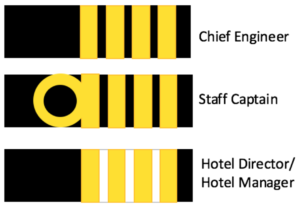
- On some cruise lines: Staff Chief Engineer
- Staff Captain
- Hotel Director (also known as Hotel Manager/Hotel General Manager)
3 ½ Stripe Officers:
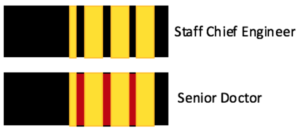
- Staff Chief Engineer (Staff Officer Rank) Note: On some cruise lines this position has four stripes.
- Senior Doctor
- Assistant Hotel General Manager/Hotel Director
What Are 3 Stripe Officer Positions on a Cruise Ship? :
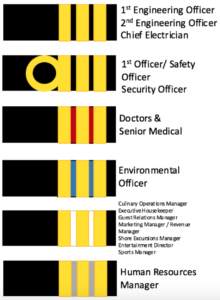
- 1 st Officer (sometimes called Safety Officer)
- Security Officer (on some lines this is 2 stripes)
- Environmental Officer (blue stripe in between)
- Senior Medical Officer
- 1 st Engineering Officer (sometimes called AC Engineer)
- 2 nd Engineering Officer
- Chief Electrician
- Executive Housekeeper
- Culinary Operations Manager/Food and Beverage Director
- Guest Relations Manager
- Marketing Manager / Revenue Manager
- Shore Excursions Manager
- Entertainment Director
- Sports Manager
- Human Resource Manager (grey stripe in between)
2 ½ Stripes Officers:

What Are 2 Stripe Officer Positions on a Cruise Ship? :
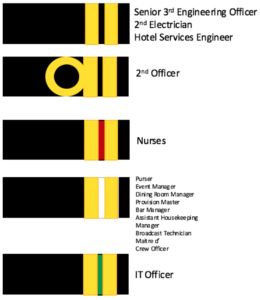
- 2 nd Officer
- Security Officer (on some lines this is 3 stripes)
- Senior 3 rd Engineer
- 2 nd Electrician
- Hotel Service Engineer
- Event Manager – for some lines this is 1 stripe, and Entertainment Director role would often be 3 stripes
- Dining Room Manager
- Provision Master
- Bar Manager
- Assistant Housekeeping Manager
- Production Manager (sometimes 3 stripes)
- Broadcast Technician
- Crew Officer
- IT Officer (green stripe in between)
What Are 1 Stripe Officer Positions on a Cruise Ship?:
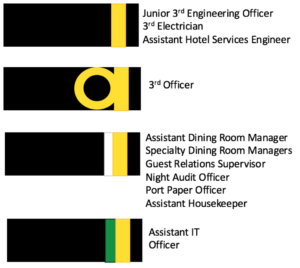
- 3 rd Officer
- Junior 3 rd Engineer
- 3 rd Electrician
- Assistant Hotel Service Engineer
- Assistant Dining Room Manager
- Specialty Dining Room Managers
- Guest Relations Supervisor
- Night Audit Officer
- Port Paper Officer
- Assistant Housekeeper
What Are the Officer Positions On A Cruise Ship?
It might seem like officer positions are the same on every cruise ship and with every cruise line, but that’s not the case! Specifically within the Hotel Department which positions are officers can be different by different cruise lines. The Technical (engineers) and Deck (Navigation) departments are much more consistent.
Want to know more about how cruise ship officer rank affects life onboard? Take a look at this post about Understanding Cruise Ship Ranks .
There Is a Lot to Understand about Cruise Strip Officer Stripes
Now, the next time you’re onboard you’ll have a better idea of what the cruise ship officer stripes mean and how to tell the different cruise ship officer ranks based on their epaulettes!
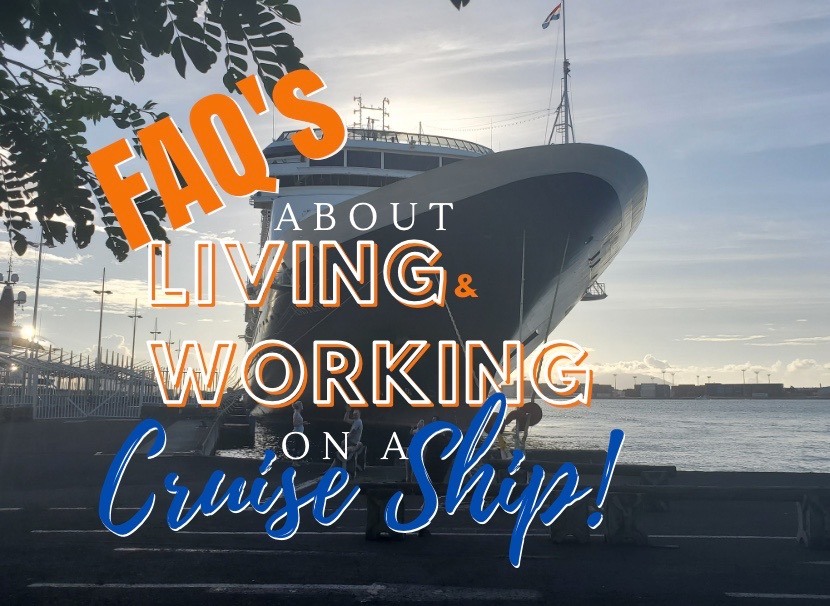
Curious what life is like onboard a cruise ship? Take a look at these FAQ’s About Living and Working on a Cruise Ship .
Thinking of Taking a Cruise?
Thinking of going on a cruise and not sure where to start? Talk to a travel advisor! My favorite local agency would be happy to help you. Call 1-877-MILNE4U or email me at [email protected] and I will get you in touch!
Ever wonder what it takes to become a cruise ship officer? Check out this interview with a cruise ship engineering officer to find out.
Join Our Mailing List!
A once a week email with the latest posts and exclusive updates.
Similar Posts
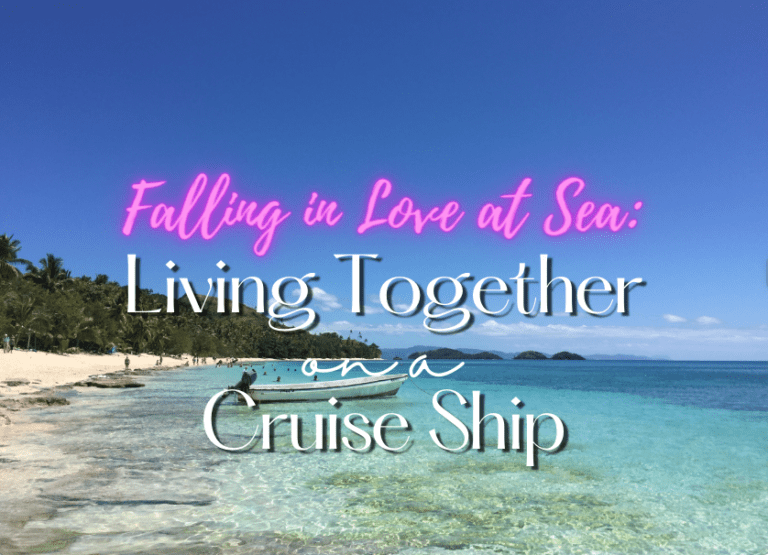
Falling in Love at Sea: Living Together On a Cruise Ship
Continuing on with our journey of falling in love at sea, today we are going to talk about being in a committed relationship onboard. In last weeks edition, “Dating On a Cruise Ship” we looked at what it was like when you first get those butterflies in your stomach. Today we’re going to look at…

The Only Constant Is Change
I’ve been onboard for a couple of weeks now. This is my first time onboard a cruise ship since the pandemic “pause”. The ship I am on has been sailing a lovely California Coastal cruise. Things are relatively normal onboard. I can go see a show and I can eat in a specialty restaurant. Some…
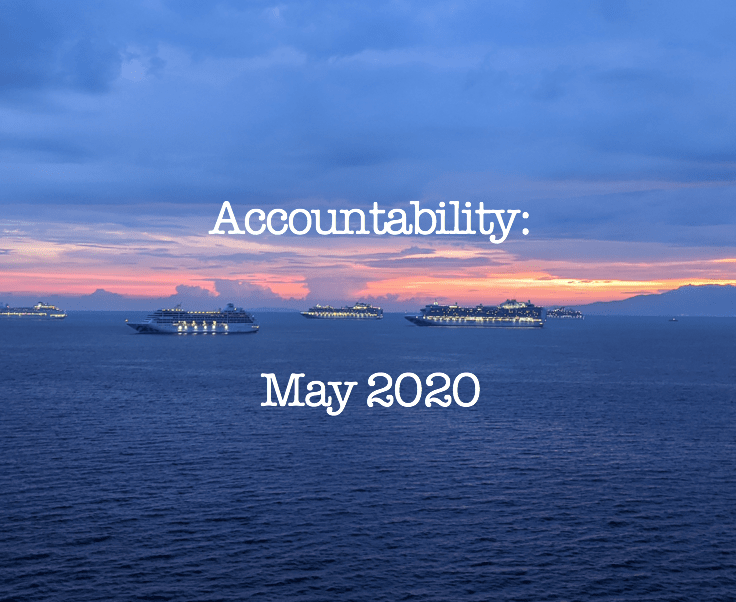
Accountability: May 2020
I have a friend that writes a personal finance blog and as such her monthly accountability posts are about how she’s doing with her personal finances. How logical. While I still don’t feel like I know exactly what my blog is about or might evolve into over time, the line that’s on the homepage of…

Falling in Love at Sea: “Happily Ever After”
In this week’s installment of Falling in Love at Sea we are going to talk about what happens next. The “Happily Ever After” and answer the age-old question, “do cruise ship couples ever get married?” If you missed the first couple of weeks we had Dating On A Cruise Ship, taking a look at what…
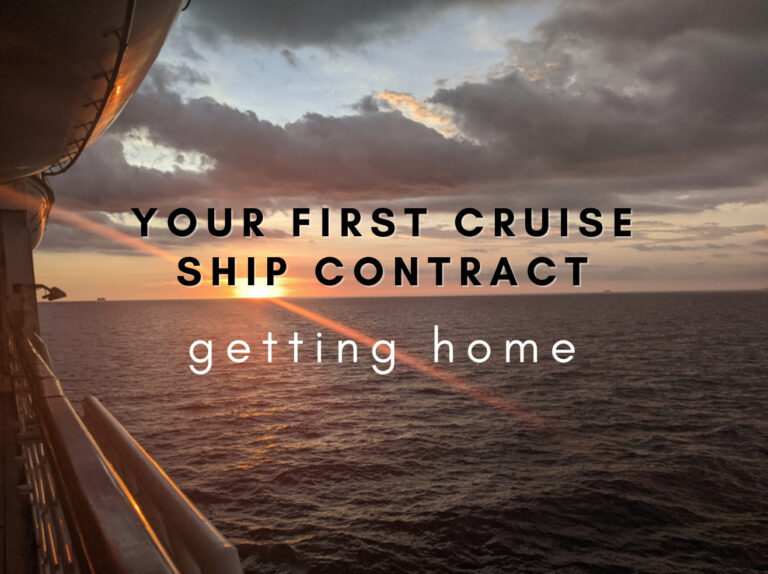
Your First Cruise Ship Contract: Getting Home
You’re almost done your first cruise ship contract. You’re excited to go home but sad to leave your friends. Thrilled to get some rest but also sad to miss out on the next incredible places the ship is going. But, you can’t rest on those bittersweet memories for that long as there is still a…
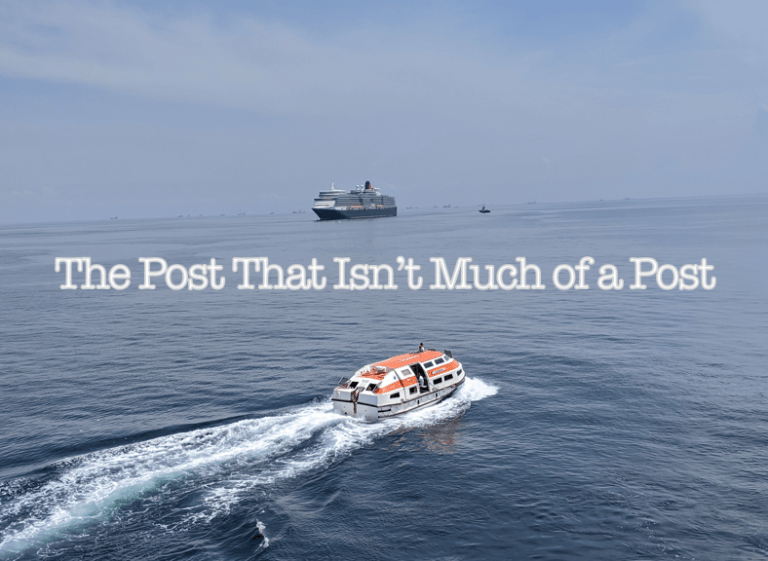
The Post That Isn’t Much of a Post
Somehow when I woke up this morning it was Thursday, and now as I’m posting it it’s Friday morning on my side of the world and just barely still Thursday on the east coast in the US. I decided a few months ago I would put posts up every Tuesday and every Thursday. I am…
Leave a Reply Cancel reply

Cruise Lines
How to become a cruise ship officer.
I’ve always held the conviction that the ocean beckons to those in search of excitement and a life that’s anything but mundane. Should you be one who senses that attraction, then pursuing a career as a cruise ship officer could very well be your calling.
In this article, I’ll share my years of experience and knowledge on how to embark on this exciting career. From education and training requirements to understanding the responsibilities and challenges, we’ll navigate the waters together and set you on course to success.
Table of Contents
Key Takeaways
- Obtain a bachelor’s degree in hospitality management or a related field
- Gain relevant work experience through internships, volunteering, and part-time jobs in the hospitality industry
- Consider your interests and strengths when choosing a specialization within the industry
- Understand the role and responsibilities of a cruise ship officer, including ensuring safety and providing exceptional customer service
Education and Training Requirements
To become a cruise ship officer, you’ll need to meet specific education and training requirements.
Pursuing a career in this field offers exciting career opportunities and a promising salary potential.
To start, a bachelor’s degree in hospitality management or a related field is often required. This provides a strong foundation in areas such as customer service, event planning, and leadership skills.
Additionally, completing a maritime academy program or obtaining a Merchant Mariner Credential (MMC) is essential. These programs provide specialized training in ship operations, safety procedures, and navigation.
By acquiring the necessary education and credentials, you can position yourself for various roles onboard, such as deck officer, engineer officer, or hotel officer.
Now, let’s explore how gaining relevant work experience can further enhance your journey towards becoming a successful cruise ship officer.
Gaining Relevant Work Experience
Start by gaining relevant work experience in the hospitality or customer service industry. This experience will provide a strong foundation for a career as a cruise ship officer. Here are some ways to gain this experience:
Look for internship opportunities at hotels, resorts, or restaurants. These internships will allow you to learn about customer service, teamwork, and problem-solving in a fast-paced environment.
Consider volunteering at local events or organizations. This will not only give you valuable experience working with people, but also show your dedication and commitment to serving others.
Seek part-time or seasonal jobs in the hospitality industry. Working as a server, hostess, or front desk agent will give you hands-on experience in dealing with customers and handling various situations.
By gaining this relevant work experience, you will be better prepared for the challenges and responsibilities of a cruise ship officer.
Now, let’s explore how to choose a specialization within this field.
Choosing a Specialization
When choosing a specialization, consider your interests and strengths to determine which area of the hospitality industry you would excel in. Each specialization offers unique job opportunities and salary expectations.
As someone who has worked in the cruise ship industry for many years, I can attest to the importance of choosing the right path. Whether you are interested in food and beverage, guest services, or entertainment, it is crucial to align your skills and passions with the specific role you pursue. By doing so, you can increase your chances of success and job satisfaction.
Understanding the role and responsibilities of your chosen specialization is imperative to thrive in the competitive cruise ship industry. Let’s dive deeper into the intricacies of each position and how they contribute to the overall guest experience.
Understanding the Role and Responsibilities
As you explore different specializations in the hospitality industry, understanding the role and responsibilities of each position is essential for your success and the overall guest experience. When it comes to becoming a cruise ship officer, there are certain role expectations and daily tasks that you should be familiar with.
Ensuring the safety and security of passengers and crew members is a top priority for a cruise ship officer. This includes conducting regular safety drills, monitoring the ship’s systems, and responding to emergency situations.
Managing the day-to-day operations of the ship is another key responsibility. This may involve overseeing various departments such as housekeeping, food and beverage, entertainment, and guest services, to ensure smooth and efficient operations.
Providing exceptional customer service is a crucial aspect of the role. Cruise ship officers are expected to interact with guests, address their concerns, and ensure their overall satisfaction throughout their journey.
Understanding these role expectations and daily tasks will help you navigate the responsibilities of a cruise ship officer effectively.
Now, let’s explore another important aspect: meeting health and fitness requirements.
Meeting Health and Fitness Requirements
When it comes to working on a cruise ship, maintaining good health and physical fitness is of utmost importance. As a cruise ship officer, I have personally gone through rigorous medical exams and certifications to ensure that I am fit to perform my duties onboard.
These exams not only assess our overall health but also screen for any potential medical conditions that could pose a risk to ourselves or others while at sea.
Additionally, cruise ship officers are expected to meet certain physical fitness expectations to ensure that we are physically capable of handling the demands of the job, such as emergency situations and long hours of standing and walking.
Medical Exams and Certifications
To become a cruise ship officer, it’s important to obtain the necessary medical exams and certifications. As a maritime professional, ensuring the safety and well-being of passengers and crew is of utmost importance. To meet the medical requirements, you will need to undergo a thorough medical examination to determine your physical fitness for the demanding nature of the job. Additionally, certain certifications are required to ensure you have the knowledge and skills necessary to perform your duties effectively. These may include certifications in first aid, CPR, and firefighting. Below is a table outlining some of the common medical exams and certification requirements for cruise ship officers:
Physical Fitness Expectations
Meeting the physical fitness expectations is crucial for individuals pursuing a career in the maritime industry. As a seasoned professional in the field, I understand the importance of meeting fitness standards and maintaining physical health. The maritime industry demands a high level of physical fitness due to the physically demanding nature of the job.
From handling heavy equipment to working long hours on deck, being physically fit is essential to perform the duties effectively and ensure the safety of oneself and others. Regular exercise, proper nutrition, and maintaining a healthy lifestyle are key factors in meeting these expectations. By prioritizing our physical well-being, we can excel in our maritime careers and handle the challenges that come our way.
Ensuring we meet the physical fitness expectations is just the first step in pursuing a career in the maritime industry. The next crucial aspect is obtaining the necessary certifications to validate our skills and knowledge.
Obtaining the Necessary Certifications
As a seasoned cruise ship officer, I understand the importance of obtaining the necessary certifications to excel in this role.
There are several certifications that officers are required to have, including STCW (Standards of Training, Certification, and Watchkeeping) certificates and specific certifications for different positions such as navigation, engineering, and safety.
Fortunately, there are various training programs available both online and in-person that can help aspiring officers acquire these certifications and enhance their skills.
However, it is crucial to ensure the validity of these certifications, as some programs may not be recognized by certain cruise lines or regulatory authorities.
Required Certifications for Officers
One certification that is required for cruise ship officers is the STCW certificate. Obtaining this certificate is essential for anyone aspiring to work in the maritime industry. The STCW, or Standards of Training, Certification, and Watchkeeping, sets forth the minimum training requirements for seafarers worldwide.
To obtain the STCW certificate, there are several training options available. These can include attending approved training centers or maritime academies, where you will receive the necessary education and practical skills required for working on a cruise ship. In addition to completing the training programs, there are also required documents that must be submitted, such as medical certificates, passport copies, and proof of sea service. These documents are essential for ensuring that you meet the eligibility criteria set by cruise ship companies.
Transitioning into the subsequent section about training programs available, it is crucial to explore the different options that cater to the specific needs and career goals of aspiring cruise ship officers.
Training Programs Available
After obtaining the necessary certifications, it’s time to explore the various training programs available to aspiring cruise ship officers. These programs not only enhance your skills but also provide valuable hands-on experience in a maritime setting.
Here are some of the training options that can help you kickstart your career:
Bridge simulator training: This immersive experience allows you to practice navigation skills and learn how to handle different scenarios at sea.
Safety and emergency response training: This comprehensive training equips you with the knowledge to ensure the safety and security of passengers and crew in emergency situations.
Leadership and management courses: These programs focus on developing your leadership skills and preparing you for the responsibilities of an officer role.
Customer service training: Enhancing your customer service skills is essential for creating a positive experience for passengers.
On-the-job training: Many cruise lines offer training programs specifically designed to prepare individuals for officer positions.
By taking advantage of these training options, you will not only gain the necessary skills and knowledge but also increase your job opportunities in the cruise ship industry.
Now, let’s delve into the validity of these certifications and the importance of staying up-to-date.
Validity of Certifications
The validity of these certifications is crucial for ensuring that aspiring cruise ship officers are equipped with the necessary skills and knowledge to perform their duties effectively.
In today’s digital age, online certifications have become increasingly popular as an alternative pathway to gaining the necessary qualifications. However, it is important to carefully evaluate the validity of these online certifications.
When considering an online program, it is essential to research the institution offering the certification and ensure that it is recognized and accredited by reputable organizations in the maritime industry. Additionally, it is advisable to seek feedback from current or former students who have completed the program to gauge its effectiveness and credibility.
Valid certifications, whether obtained online or through traditional means, provide aspiring cruise ship officers with the foundation they need to excel in their careers.
As a cruise ship officer, developing strong leadership and communication skills is essential for effectively managing a team and maintaining a positive guest experience.
Developing Leadership and Communication Skills
To become a cruise ship officer, you should focus on developing your leadership and communication skills. Leadership training is crucial in this role as you will be responsible for managing a team and making important decisions. Effective communication is also essential as you will need to communicate with crew members, passengers, and other departments on the ship. By honing these skills, you will be able to handle any situation that arises and provide exceptional service to passengers.
To illustrate the importance of leadership and communication, let’s take a look at the following table:
As you can see, developing these skills leads to positive outcomes such as success, motivation, and collaboration.
Networking and Building Industry Connections
As someone who’s worked in the cruise ship industry for several years, I understand the importance of networking and building industry connections.
Networking allows you to expand your professional circle, gain valuable insights, and open up new opportunities.
In this discussion, I’ll share my experiences and strategies for effective networking and building industry connections in the cruise ship industry.
Importance of Networking
Networking is essential for aspiring cruise ship officers to build connections and open doors to potential job opportunities. As someone who has worked in the cruise industry for many years, I can attest to the numerous benefits of networking.
It allows you to meet professionals in the field, gain valuable insights, and increase your visibility within the industry.
To maximize the benefits of networking, it is important to employ effective strategies. First, attend industry events and conferences where you can meet fellow professionals and establish connections.
Second, utilize online platforms such as LinkedIn to connect with industry leaders and join relevant groups.
Lastly, don’t be afraid to reach out and initiate conversations with professionals in the field. By actively networking, you can pave the way towards a successful career as a cruise ship officer.
Now, let’s explore some strategies for building industry connections.
Industry Connection Strategies
After understanding the importance of networking in the cruise ship industry, it’s crucial to develop effective strategies for building industry connections.
One of the most effective networking strategies is attending industry events and conferences. These events provide a great opportunity to meet professionals and key decision-makers in the industry.
Additionally, joining professional associations and organizations related to the cruise ship industry can help in expanding your network.
Engaging with industry professionals on social media platforms and participating in online forums and discussions are also effective ways to connect with people in the industry.
Building industry connections requires consistent effort and genuine interest in the field. By utilizing these networking strategies, you can establish valuable relationships and increase your chances of finding employment as a cruise ship officer.
Now, let’s transition into the next section, which focuses on researching cruise ship companies without using the word ‘step.’
Researching Cruise Ship Companies
Before you start applying, research different cruise ship companies to find the best fit for your career goals.
Finding reputable cruise ship companies is crucial in ensuring a successful and fulfilling career as a cruise ship officer. It is important to thoroughly research each company to understand their reputation, values, and work culture. Look for companies with a strong track record of safety, guest satisfaction, and employee development.
Additionally, researching job opportunities and salary expectations in the cruise ship industry will help you make informed decisions about which companies align with your career goals. Consider factors such as job responsibilities, advancement opportunities, and compensation packages.
Applying for Cruise Ship Officer Positions
When it comes to applying for cruise ship officer positions, there are certain necessary qualifications and experience that you should possess. These include a valid maritime license, previous experience in a similar role, and excellent communication and leadership skills.
The application and interview process typically involves submitting a resume and cover letter, followed by multiple rounds of interviews to assess your suitability for the position.
Necessary Qualifications and Experience
To become a cruise ship officer, you’ll need the necessary qualifications and experience. In terms of education requirements, most cruise lines prefer candidates with a bachelor’s degree in hospitality management, maritime studies, or a related field. However, some companies may also consider applicants with a high school diploma or equivalent, as long as they have relevant work experience.
Additionally, there are required certifications that aspiring cruise ship officers must obtain. These certifications include a valid passport, STCW (Standards of Training, Certification, and Watchkeeping for Seafarers) certification, and a medical fitness certificate. These certifications ensure that you are equipped with the necessary skills and knowledge to handle the responsibilities of a cruise ship officer.
Once you have acquired the required qualifications and certifications, you can move on to the next stage of the process – the applying and interview process.
Applying and Interview Process
After gaining the necessary qualifications and work experience, the next step in becoming a cruise ship officer is applying and going through the interview process.
It’s important to note that cruise lines often have specific health and fitness requirements for their officers. This is because working on a cruise ship can be physically demanding and requires individuals to be in good health. These requirements may include passing a medical examination, having a certain level of physical fitness, and being able to handle the rigors of life at sea.
It’s crucial to ensure that you meet these requirements before applying for a position. Once you’ve met the health and fitness requirements, you can move on to the interview process, which will be discussed in the next section.
Interviewing and Nailing the Selection Process
Make sure you’re well-prepared for the interview and focus on nailing the selection process to increase your chances of becoming a cruise ship officer. Interview preparation is key to standing out from other candidates and showcasing your skills and qualifications.
Research the cruise line you are applying to, familiarize yourself with their values and mission, and understand the specific role of a cruise ship officer. Practice common interview questions and prepare thoughtful answers that highlight your experience and abilities.
Utilize effective interview techniques such as maintaining good eye contact, displaying confidence, and actively listening to the interviewer. Additionally, dress professionally and arrive early to make a positive first impression.
By mastering interview preparation and techniques, you will be well on your way to securing your dream role as a cruise ship officer.
Transitioning into the subsequent section about ‘preparing for life at sea,’ it is important to not only focus on the interview process but also on the practical aspects of working and living on a cruise ship.
Preparing for Life at Sea
After successfully navigating the selection process and securing a position as a cruise ship officer, it’s important to prepare for the unique challenges of life at sea. One of the most exciting aspects of this lifestyle is the opportunity to meet new people from all around the world. As an officer, you will interact with passengers and crew members, fostering a sense of community and camaraderie. However, it’s also important to recognize that life at sea can present its own set of challenges. From adjusting to the constant motion of the ship to dealing with homesickness, it’s crucial to develop resilience and adaptability. Additionally, being away from loved ones for extended periods can be emotionally challenging. Nonetheless, with the right mindset and support network, these challenges can be overcome.
As you prepare to embark on this exciting journey, it’s important to be mentally and emotionally prepared for the unique challenges that life at sea presents.
Adjusting to the Cruise Ship Lifestyle
Adjusting to the cruise ship lifestyle can be challenging, but with the right mindset and support network, it can also be incredibly rewarding.
As a cruise ship officer, I have learned the importance of adjusting my mindset to this unique environment. The constant movement, long hours, and separation from loved ones can initially be overwhelming. However, by embracing the adventure and focusing on the amazing opportunities that come with this career, I have found great fulfillment.
Building relationships with fellow crew members and passengers is crucial in navigating the challenges of ship life. These connections provide support, friendship, and a sense of belonging. By fostering positive relationships, I have been able to create a strong support network that has helped me adjust and thrive in this lifestyle.
Transitioning into the next section, advancing your career as a cruise ship officer requires dedication and a proactive approach.
Advancing Your Career as a Cruise Ship Officer
Advancing your career as a cruise ship officer can be achieved through dedication, hard work, and a proactive approach. As someone who has worked in the industry for years, I understand the importance of continuous career growth and professional development.
To excel in this field, it is crucial to seek out opportunities for learning and improvement. Take advantage of onboard training programs, attend industry conferences, and stay updated with the latest trends in the cruise industry.
Additionally, building strong relationships with colleagues and superiors can open doors for mentorship and advancement. While the path to success may have its challenges, maintaining a positive attitude, adaptability, and professionalism are key.
Navigating Challenges and Maintaining Professionalism
Navigating the challenges of the cruise ship industry requires maintaining professionalism and a positive attitude. As a cruise ship officer, I have encountered numerous obstacles that test my skills and abilities. However, through my years of experience, I have learned the importance of staying professional and composed in the face of adversity.
One of the key aspects of maintaining professionalism is being able to handle difficult situations with grace and composure. Whether it be dealing with difficult passengers, resolving conflicts among crew members, or managing emergencies, it is crucial to remain calm and level-headed. By doing so, I am able to effectively overcome challenges and find solutions that benefit both the passengers and the crew.
Another aspect of maintaining professionalism is having a positive attitude. It is no secret that working on a cruise ship can be demanding and exhausting. However, by approaching each day with optimism and enthusiasm, I am able to inspire and motivate my team. This positive attitude not only helps us overcome challenges, but also creates a welcoming and enjoyable environment for both passengers and crew members.
Frequently Asked Questions
What are the salary and benefits typically offered to cruise ship officers.
As a cruise ship officer, the salary and benefits offered are quite competitive. The salary can vary based on experience and position, but typically ranges from $40,000 to $100,000 per year. Additionally, benefits may include free accommodation, meals, and access to onboard amenities.
How Long Is the Average Contract for a Cruise Ship Officer?
The average contract length for a cruise ship officer varies depending on the company and position. As an officer, my job responsibilities include overseeing operations, ensuring passenger safety, and managing the crew.
Are There Any Age Restrictions for Becoming a Cruise Ship Officer?
There are age restrictions for becoming a cruise ship officer. However, it’s best to check with the specific cruise line you’re interested in, as age requirements may vary.
Can You Choose Your Preferred Cruise Ship Destination or Route as a Cruise Ship Officer?
As a cruise ship officer, I have the freedom to choose my preferred destinations and routes, allowing me to navigate through stunning seas like a seasoned sailor searching for buried treasure.
What Is the Average Work Schedule Like for a Cruise Ship Officer?
As a cruise ship officer, the average work schedule can vary depending on the position and cruise line. It is important to maintain a good work-life balance, as the job can be demanding at times.
In conclusion, becoming a cruise ship officer requires dedication, hard work, and a passion for the high seas. By obtaining the necessary education and training, gaining relevant work experience, and choosing a specialization, you can embark on an exciting career in this industry.
It is crucial to understand the role and responsibilities of a cruise ship officer, as well as meet the health and fitness requirements. Preparing for life at sea and adjusting to the unique cruise ship lifestyle are essential for success.
As you advance your career, remember to navigate challenges with professionalism and maintain your dedication to excellence. Bon voyage!
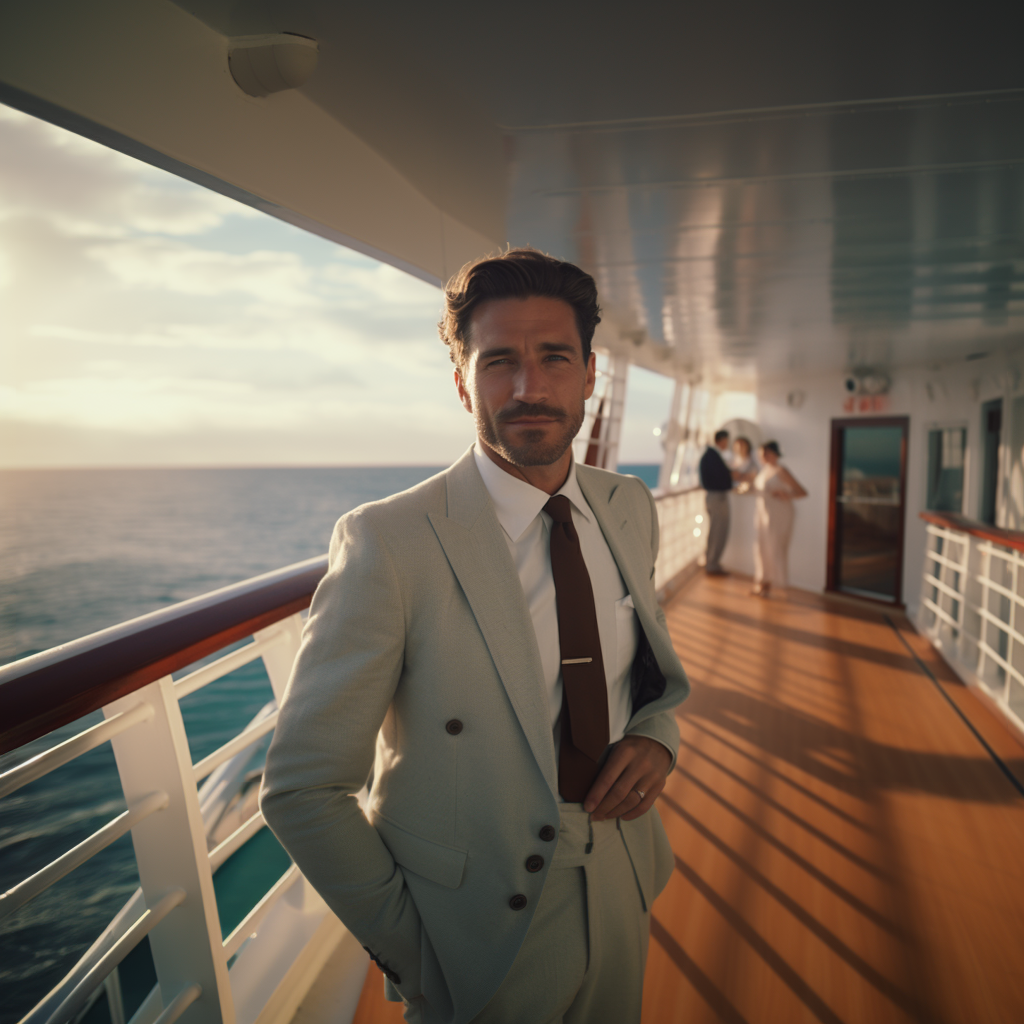
Alfons is the visionary leader and driving force behind Voyager Info’s success. As the Editor in Chief, he brings a wealth of experience and an unwavering passion for travel to the helm of our cruise-centric platform.
With a lifelong fascination for exploring new horizons, Alfons discovered his love for the ocean and cruising at a young age. From sailing across pristine Caribbean waters to embarking on daring expeditions to far-flung destinations, he has amassed a treasure trove of first-hand experiences in the world of cruising.
How Long Do Cruise Ship Workers Work
What Is Disney Cruise

Alfons is the visionary leader and driving force behind Voyager Info’s success. As the Editor in Chief, he brings a wealth of experience and an unwavering passion for travel to the helm of our cruise-centric platform. With a lifelong fascination for exploring new horizons, Alfons discovered his love for the ocean and cruising at a young age. From sailing across pristine Caribbean waters to embarking on daring expeditions to far-flung destinations, he has amassed a treasure trove of first-hand experiences in the world of cruising.

You may like
How much does a carnival cruise director make.

As the Director of Carnival Cruise, I often receive questions about my salary. Such inquiries are typical both from individuals looking to pursue a career as cruise directors and from curious travelers. In this conversation, my goal is to shed some light on this topic.
Did you know that the average salary range for Carnival Cruise Directors is $50,000 to $90,000 per year? That’s right! But it’s important to note that several factors can affect a cruise director’s salary, such as experience, performance, and the ship they are assigned to.
In this article, we will delve into the role of a Carnival Cruise Director and explore the responsibilities and duties they undertake. We will also discuss the qualifications and skills required for this position.
Furthermore, we’ll uncover career progression opportunities and challenges faced by cruise directors. So if you’re interested in learning more about the financial aspects of being a Carnival Cruise Director or considering a career in this field, keep reading!
- The average salary range for a Carnival Cruise Director is $50,000 to $90,000 per year.
- Factors such as experience, performance, and ship assignment can affect a cruise director’s salary.
- The role of a cruise director is multifaceted, including overseeing entertainment, activities, and events, and creating a sense of community onboard.
- In addition to salary, cruise directors enjoy perks such as complimentary accommodations, discounted rates for family and friends, and access to exclusive onboard amenities.
The Role of a Carnival Cruise Director
The role of a Carnival cruise director is multifaceted, encompassing various responsibilities and requiring exceptional interpersonal skills. Cruise directors play a vital role in ensuring that guests have a memorable and enjoyable experience onboard.
They are responsible for overseeing all aspects of entertainment, activities, and events on the ship, from organizing live shows to hosting themed parties.
The cruise director’s role extends beyond just entertainment; they act as a liaison between guests and the ship’s staff, addressing any concerns or issues that may arise.
Their presence creates a sense of community onboard and helps foster lasting memories for passengers. Without cruise directors, the overall guest experience would be lacking in excitement and engagement.
As we delve into the responsibilities and duties of a cruise director, their importance in shaping the atmosphere on a Carnival cruise becomes even more evident.
Responsibilities and Duties of a Cruise Director
As a Carnival cruise director, your responsibilities will encompass:
- Coordinating entertainment programs
- Managing staff and schedules
- Fostering a welcoming atmosphere aboard the ship
You’ll need to have exceptional communication and organizational skills to effectively engage with passengers and create a seamless experience. Additionally, you’ll play a crucial role in planning special events such as theme nights or talent shows.
Your duties may also include:
- Conducting safety drills
- Addressing any guest concerns or complaints promptly
Being a cruise director requires multitasking abilities, adaptability, and strong leadership qualities to ensure smooth operations throughout the voyage.
Transitioning into the subsequent section about the ‘qualifications and skills required for the position,’ it is essential to possess certain attributes that make you an ideal candidate for this exciting role.
Qualifications and Skills Required for the Position
Step into the spotlight and let your vibrant personality shine as you embrace the challenge of becoming the conductor of unforgettable experiences at sea. To qualify for the position of a Carnival Cruise Director, there are certain qualifications and skills that are necessary.
- Experience in the entertainment industry: A background in performing arts or event management is highly preferred.
- Strong communication skills: As a Cruise Director, you will be interacting with guests from diverse backgrounds, so excellent verbal and written communication skills are essential.
- Leadership abilities: You will be responsible for managing a team of staff members, so strong leadership qualities are crucial.
- Organizational skills: From planning activities to coordinating schedules, being able to multitask and stay organized is important.
These required qualifications and necessary skills enable cruise directors to create an engaging atmosphere onboard Carnival cruises.
Now let’s transition into discussing the average salary range for Carnival Cruise Directors without missing a beat.
Average Salary Range for Carnival Cruise Directors
The average salary range for Carnival Cruise Directors is quite generous, allowing them to enjoy the rewards of their passion for creating unforgettable experiences at sea.
Compared to other positions in the industry, the average salary of a Carnival Cruise Director is highly competitive. The job market demand for cruise directors has been steadily increasing, leading to an upward trend in salaries.
Cruise directors are well-compensated for their expertise and responsibilities on board, with an average annual salary ranging from $50,000 to $80,000. However, it is important to note that factors such as experience, qualifications, and performance can greatly impact a cruise director’s salary.
Moving forward into the next section about factors affecting salary growth in this profession…
Factors that Affect a Cruise Director’s Salary
Factors that affect a cruise director’s salary include:
- Level of experience: Cruise directors with more years of experience often command higher salaries.
- Qualifications: Higher qualifications, such as advanced degrees or certifications, can also lead to increased earning potential.
- Performance: Exceptional performance reviews and high customer satisfaction ratings can result in higher compensation.
- Demand for cruise directors: If there is a high demand for experienced directors within the industry, salaries may increase due to competition among cruise lines for top talent.
Considering these factors can help you understand how much you can potentially earn as a cruise director.
Moving on to the next section about additional perks and benefits of the job…
Additional Perks and Benefits of the Job
Now that we have discussed the factors that affect a cruise director’s salary, let’s delve into the additional perks and benefits of the job. Working as a carnival cruise director not only offers a competitive salary, but also provides various enticing incentives that contribute to overall job satisfaction. These perks can include complimentary accommodations in luxurious cabins, discounted rates for family and friends, access to exclusive onboard amenities, and opportunities to explore exotic destinations during off-duty hours. Moreover, carnival cruise directors often enjoy special privileges such as priority boarding and disembarkation, access to crew-only areas, and discounts on dining and entertainment options. These additional benefits not only enhance the overall experience of being a cruise director but also foster a sense of fulfillment and contentment in one’s career choice.
Moving forward into the subsequent section about career progression and advancement opportunities…
Career Progression and Advancement Opportunities
Moving up the ladder in this profession is like embarking on an exciting journey with endless possibilities for growth and advancement. The cruise industry offers numerous career progression opportunities for ambitious individuals who are dedicated to their professional development.
Here are four key avenues for career growth as a Carnival Cruise Director:
Promotion to Senior Cruise Director: After gaining experience and proving your skills, you can be promoted to a senior position overseeing multiple ships.
Land-based Positions: There are opportunities to transition into shore-side roles such as managing entertainment operations or training new cruise directors.
Corporate Management: With further experience, you may qualify for corporate management positions within the cruise line’s headquarters.
Entrepreneurship: Many experienced cruise directors go on to start their own consulting or event planning businesses.
As we explore the challenges and rewards of being a cruise director, it becomes evident that this dynamic profession requires resilience and adaptability.
Challenges and Rewards of Being a Cruise Director
Embarking on the journey of being a cruise director brings both challenges and rewards that you’ll experience firsthand.
The role of a cruise director is demanding and requires exceptional organizational skills, as well as the ability to handle various responsibilities simultaneously.
One major challenge is managing the diverse needs and expectations of passengers from different backgrounds and cultures. It can be challenging to ensure that everyone has an enjoyable experience while maintaining a high level of customer satisfaction.
However, the rewards are equally fulfilling. As a cruise director, you have the opportunity to travel to breathtaking destinations around the world, meet interesting people from all walks of life, and create unforgettable memories for both yourself and your passengers.
Transitioning into the subsequent section about ‘insider’s perspective: interviews with cruise directors’, let’s delve into their experiences on how they navigate these challenges while reaping the rewards in this captivating industry.
Insider’s Perspective: Interviews with Cruise Directors
Imagine the thrill of hearing firsthand accounts from experienced cruise directors as they share their insider perspectives on navigating challenges and reaping rewards in this captivating industry.
Behind the scenes, the daily life of a cruise director is a whirlwind of activity, coordinating entertainment, managing staff, and ensuring guests have an unforgettable experience. It’s a job that requires excellent organizational skills, adaptability, and a knack for problem-solving.
From handling last-minute itinerary changes to mediating guest complaints, cruise directors face numerous challenges on a daily basis. However, the triumphs are equally rewarding. Witnessing the joy on passengers’ faces during exciting activities or seeing them form lifelong friendships onboard is incredibly gratifying.
These stories from experienced cruise directors highlight both the highs and lows of this unique profession.
As we delve deeper into tips for aspiring cruise directors: how to get started in the industry, it becomes clear that passion and dedication are key to success in this fast-paced environment.
Tips for Aspiring Cruise Directors: How to Get Started in the Industry
Gaining a foothold in the cruise industry requires aspiring directors to cultivate their passion, hone their organizational skills, and seek out opportunities for hands-on experience. To become a successful cruise director, it is essential to undergo proper training. Many cruise lines offer specific programs or courses that focus on developing the necessary skills for this role. These training programs cover various aspects such as event planning, customer service, public speaking, and leadership.
Additionally, it is crucial to stay updated on the latest trends and developments in the industry by attending conferences and workshops.
In terms of job outlook, the demand for cruise directors remains strong as the cruising industry continues to grow. With more people opting for cruises as a vacation choice, there are ample opportunities for aspiring directors to enter this field. However, competition can be fierce, so it is important to stand out from the crowd by showcasing your unique skills and experiences. Networking with professionals already working in the industry can also provide valuable insights and potential job leads.
Overall, with determination and dedication towards building your career as a cruise director, you can pave your way towards success in this exciting industry.
What is the work schedule like for a Carnival Cruise Director?
As a Carnival Cruise Director, my work schedule is demanding but rewarding. I am responsible for overseeing all aspects of onboard entertainment and activities, ensuring a fun-filled experience for guests. Maintaining work life balance can be challenging due to the fast-paced nature of the job.
Are Carnival Cruise Directors responsible for organizing all onboard entertainment activities?
Carnival cruise directors are responsible for organizing all onboard entertainment activities, including shows, games, and parties. They ensure guests have a fun-filled experience. The salary of a carnival cruise director can range from $50,000 to $80,000 per year.
What are the living arrangements like for Carnival Cruise Directors while on board?
While on board, Carnival Cruise Directors have comfortable living arrangements with their own cabins. They also have the opportunity to socialize with other crew members and participate in various onboard activities during their free time.
Is there any room for creativity and personalization in the role of a Carnival Cruise Director?
As a carnival cruise director, I have found that while there are some creativity limitations in the role, there are also ample opportunities for personalization. It allows me to add my own unique touch and create unforgettable experiences for our guests.
Do Carnival Cruise Directors have any say in the itinerary and ports of call for each cruise?
As a Carnival Cruise Director, I have significant influence over the cruise itinerary and decision-making power for ports of call. It is my responsibility to ensure an enjoyable and diverse experience for our passengers.
In conclusion, being a Carnival Cruise Director is not only a rewarding career but also a lucrative one. With an average salary range that can reach six figures, this role offers financial stability and growth opportunities.
However, it’s important to note that the salary can vary depending on factors such as experience, qualifications, and the size of the ship.
Just like navigating through rough waters, the journey to becoming a cruise director may have its challenges, but with passion and dedication, it can lead to a fulfilling career in the exciting world of cruising.
How Much Does A Cruise Director Make On Carnival
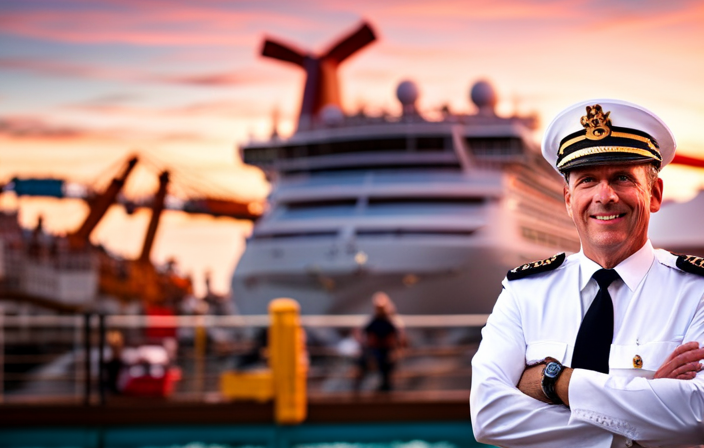
Wondering what a cruise director at Carnival makes? You’ve hit the jackpot because I’m ready to share everything! As a former cruise director, I’m in a unique position to give you an insider’s view of this exciting and lucrative career.
In this article, we will explore the job responsibilities of a cruise director, their base salary and compensation package, performance-based bonuses and incentives, career progression opportunities, and how their salary compares to other positions in the cruise industry.
We will also delve into the factors that determine salary negotiation and provide insights from current and former cruise directors. Whether you’re considering a career as a cruise director or simply curious about their earning potential, this article will give you all the information you need.
So, let’s set sail and discover just how much a cruise director can make on Carnival!
- Factors that influence cruise director salary include the size and prestige of the cruise line, demand for cruise directors, the current state of the industry, and specific responsibilities and expectations of the role.
- Qualifications that impact cruise director salary include experience in the industry, level of education, additional certifications, ability to overcome job challenges, and articulation of problem-solving abilities.
- Tips for aspiring cruise directors include having a background in entertainment, hospitality, or customer service, strong leadership skills, effective communication abilities, excellent organizational skills, and previous experience in event planning or public speaking.
- The average salary range for cruise directors on Carnival is $45,000 to $60,000 per year, with potential benefits including free accommodation, meals, and travel opportunities.
Overview of the Job Responsibilities of a Cruise Director
So, you’re probably wondering what exactly does a cruise director on Carnival do? Well, let me tell you.
As a cruise director, my job is to oversee all the entertainment and activities onboard the ship. I am responsible for planning and organizing a wide range of events, from live shows and parties to trivia contests and dance classes. It’s my duty to ensure that guests have a memorable and enjoyable experience throughout their cruise.
To be a successful cruise director, you need excellent communication and organizational skills, as well as a vibrant and outgoing personality. The job comes with its challenges, such as managing a diverse team and handling guest complaints, but the rewards are immense. Seeing guests having the time of their lives and creating unforgettable memories is truly fulfilling.
Now let’s talk about the base salary and compensation package.
Base Salary and Compensation Package
Imagine, as a cruise director on Carnival, you’ll be pleasantly surprised by the generous base salary and compensation package that awaits you. Here are four reasons why the perks and benefits of being a cruise director will contribute to your overall job satisfaction:
Competitive Base Salary: Carnival offers a competitive base salary for cruise directors, ensuring that you are fairly compensated for your hard work and dedication.
Free Accommodation and Meals: As a cruise director, you’ll enjoy the luxury of free accommodation and meals throughout your contract. This not only saves you money but also allows you to fully immerse yourself in the cruise experience.
Travel Opportunities: Being a cruise director means you get to travel to different destinations around the world. This gives you the chance to explore new cultures, meet interesting people, and create unforgettable memories.
Access to Ship Facilities: As a cruise director, you’ll have access to various ship facilities, including entertainment venues, pools, and fitness centers. This allows you to relax and enjoy the amenities during your downtime.
With these incredible perks and benefits, it’s no wonder that being a cruise director on Carnival is a highly rewarding career.
Now, let’s delve into the exciting world of performance-based bonuses and incentives.
Performance-Based Bonuses and Incentives
Performance-based bonuses and incentives are an exciting part of being a cruise director on Carnival. They not only provide a financial boost to your base salary but also serve as a testament to your hard work and dedication. Carnival offers various ways to earn these bonuses. This includes exceeding guest satisfaction goals, achieving high ratings on performance evaluations, and meeting revenue targets. These incentives not only motivate cruise directors to go above and beyond in their roles but also contribute to job satisfaction and career growth. The opportunity to earn bonuses based on performance creates a sense of accomplishment and encourages continuous improvement. As a cruise director, the prospect of earning these rewards and the satisfaction that comes with it make the job even more fulfilling.
As you excel in your role as a cruise director, exciting opportunities for career progression and advancement open up to you.
Promotional Opportunities: Cruise directors who consistently demonstrate exceptional leadership and organizational skills may be considered for higher-level positions within the cruise industry, such as shore excursion manager or entertainment director. These roles offer increased responsibility and a chance to oversee larger teams.
Training and Development: Cruise lines often provide ongoing training and development programs for cruise directors looking to enhance their skills and knowledge. These programs may include workshops, seminars, and mentoring opportunities, allowing cruise directors to continuously improve their expertise in areas such as customer service, event planning, and budget management.
Job Satisfaction: With each career milestone reached, cruise directors experience a sense of accomplishment and fulfillment, knowing that their hard work and dedication have paid off. The opportunity for career growth not only provides financial rewards but also boosts job satisfaction, as cruise directors can see their professional journey unfold and make a lasting impact in the cruise industry.
Transitioning into the next section about ‘comparison with other positions in the cruise industry,’ cruise directors have a unique career path that sets them apart from other roles in the industry.
Comparison with Other Positions in the Cruise Industry
While cruise directors may not have the highest salary in the industry, their unique combination of leadership, organizational skills, and ability to create memorable experiences sets them apart from other positions.
In the cruise director job market, their salary is typically compared to other roles such as onboard entertainers, shipboard managers, and guest service managers. While these positions may offer higher salaries, they often require a more specialized skill set or have different responsibilities.
Cruise directors, on the other hand, are responsible for overseeing all onboard entertainment and activities, managing a team of staff members, and ensuring that guests have a fantastic experience throughout their cruise. This level of responsibility and the ability to create lasting memories for passengers make the role of a cruise director highly valued.
Moving forward, let’s explore the average salary range for cruise directors on Carnival.
Average Salary Range for Cruise Directors on Carnival
The average salary range for cruise directors on Carnival is quite competitive and can be quite lucrative. Here are some key factors to consider when looking at the salary range for this position:
Experience: Cruise directors with more experience often command higher salaries.
Ship Size: The size of the ship can affect the salary range, as larger ships may have more responsibilities and higher salaries.
Job Responsibilities: Cruise directors have a wide range of responsibilities, including organizing onboard activities, managing staff, and ensuring guest satisfaction. The salary range may reflect the level of expertise and workload required.
Performance: Excellent performance and positive guest feedback can lead to salary increases and bonuses.
These factors contribute to the salary negotiation process for cruise directors. Understanding the job responsibilities and considering these factors can help determine the appropriate salary range for this position.
Factors That Determine Salary Negotiation
Negotiating salary for a cruise director position involves carefully considering several factors that can greatly impact the final offer.
One of the key factors is the candidate’s experience and qualifications. Cruise directors with extensive experience and a proven track record of success are likely to have more negotiating power and can command a higher salary.
Additionally, the size and reputation of the cruise line also play a role in determining the salary. Larger and more prestigious cruise lines like Carnival tend to offer higher salaries compared to smaller companies.
Other factors that can influence salary negotiation include the demand for cruise directors, the current state of the industry, and the specific responsibilities and expectations of the role.
Taking all these factors into account, candidates can strategically negotiate their salary to ensure a fair and competitive offer. Insights from current and former cruise directors provide valuable information for navigating the negotiation process.
Insights from Current and Former Cruise Directors
Insights from current and former cruise directors can provide valuable guidance when it comes to navigating salary negotiations for your dream job. There are certain qualifications that can influence your earning potential as a cruise director. Factors such as experience in the industry, level of education, and additional certifications can all play a role in determining your salary. It’s important to note, however, that the challenges of being a cruise director can also impact your compensation. The demanding nature of the job, long hours, and constant travel are all factors that should be considered during negotiations. Understanding these challenges and being able to articulate how you can overcome them can give you an advantage in salary discussions. Now, let’s move on to some tips for aspiring cruise directors on how to break into this exciting industry.
Tips for Aspiring Cruise Directors
As a former cruise director, I understand the dedication and passion it takes to excel in this role. If you aspire to become a cruise director on Carnival, there are certain qualifications you should possess. Firstly, having a background in entertainment, hospitality, or customer service is beneficial. Additionally, strong leadership, communication, and organizational skills are essential to effectively manage a team and ensure the smooth operation of onboard activities.
When it comes to the cruise director interview, it is important to showcase your enthusiasm, energy, and ability to engage with diverse audiences. Highlight any previous experience you have in event planning, public speaking, or hosting. Be prepared to answer questions about your problem-solving abilities and how you handle stressful situations.
To visually illustrate the importance of these skills, here is a table showcasing the top qualities of a successful cruise director:
In conclusion, becoming a cruise director on Carnival requires a combination of experience, skills, and passion for the job. But is it worth it? Let’s dive into that in the next section.
Conclusion: Is Being a Cruise Director on Carnival Worth It?
Deciding whether being a cruise director on Carnival is worth it ultimately depends on individual priorities and aspirations. When considering the financial aspect, it’s important to take into account the cruise director salary. The average salary for a cruise director on Carnival is around $45,000 to $60,000 per year, which may also include benefits like free accommodation, meals, and the opportunity to travel to different destinations.
Job satisfaction is another crucial factor to consider. As a cruise director, you’ll have the opportunity to interact with passengers from all walks of life, organize various activities and events, and be the face of the ship. This role requires excellent communication skills, a passion for hospitality, and the ability to handle any challenges that may arise. If you enjoy working in a dynamic and fast-paced environment and have a strong desire to provide exceptional customer service, being a cruise director on Carnival can be a rewarding and fulfilling career choice.
What is the required education or experience to become a cruise director on Carnival?
To become a cruise director on Carnival, a combination of education and experience is required. A bachelor’s degree in hospitality management or a related field, along with several years of cruise director experience, will greatly enhance your chances of landing this exciting role.
How many hours per week does a cruise director typically work?
As a cruise director, I typically work around 60-70 hours per week. The cruise director work schedule can vary depending on the specific cruise line and itinerary, but it often involves long hours and a demanding workload.
Are there any specific skills or qualifications that are highly valued in the role of a cruise director?
Specific skills and valuable qualifications are highly valued in the role of a cruise director. Strong communication, leadership, and organizational skills, as well as experience in hospitality and customer service, are essential for success in this position.
What are some common challenges faced by cruise directors on Carnival?
Managing a diverse and multinational staff can be challenging for cruise directors on Carnival. They also have to deal with unpredictable weather conditions and itinerary changes, requiring adaptability and effective communication skills.
How does the salary of a cruise director on Carnival compare to other cruise lines in the industry?
When comparing cruise director salaries across different cruise lines in the industry, it is important to consider variables such as job responsibilities, experience, and the size of the cruise line.
Do Carnival Cruise Directors Receive Free Parking at Port?
Carnival Cruise Directors do not receive free parking at port. The parking cost at Carnival Cruise is an additional expense for them and is not usually included in their benefits. It is important for Cruise Directors to factor in the parking cost at Carnival Cruise when planning for their trips.
After researching the salary and benefits of being a cruise director on Carnival, I can confidently say that it is a lucrative and rewarding career choice.
The base salary, combined with performance-based bonuses and incentives, provides a competitive compensation package.
Additionally, the opportunity for career progression and advancement is promising. However, it’s important to consider factors such as negotiation skills and industry demand when determining salary.
Overall, being a cruise director on Carnival offers the chance to travel, entertain, and make a comfortable living.
It’s a ‘shipshape’ career option for those seeking adventure and a vibrant work environment.
How Many People Go Missing On Cruise Ships

As someone who is passionate about cruising, the investigation into people disappearing on cruise ships captivates me. Often, this serious issue is eclipsed by the glamorous and luxurious appeal of these floating resorts. However, under the shiny facade lies a darker truth where many individuals go missing while on their ocean journeys.
This article aims to shed light on this issue by examining safety measures and regulations, high profile missing persons cases, and the role played by crew members and passengers. Additionally, we will explore the legal and jurisdictional challenges faced in investigating these disappearances and compare them to other forms of travel.
We’ll also discuss the support and resources available for victims’ families and explore steps towards prevention and awareness. Ultimately, our goal is to strike a balance between enjoying the thrill of cruise ship travel while ensuring everyone’s safety on board.
- The number of missing persons on cruise ships is relatively low compared to other forms of transportation.
- Cruise lines prioritize passenger safety and have comprehensive safety training programs for crew members.
- High-profile missing persons cases on cruise ships have received extensive media coverage and raised safety concerns.
- Collaboration and cooperation among countries are crucial in addressing missing persons cases on cruise ships due to jurisdictional challenges in international waters.
The Reality of Missing Persons on Cruise Ships
Let’s dive into the startling truth about how many people actually go missing on cruise ships.
It is indeed a concerning issue, but it’s important to understand that the numbers are relatively low compared to other forms of transportation. Cruise lines prioritize passenger safety and have implemented various safety precautions to minimize incidents.
When a person goes missing, an investigation process takes place immediately. The crew works closely with law enforcement agencies, utilizing surveillance footage, conducting interviews, and examining onboard records to gather information and piece together the events leading up to the disappearance.
It is crucial for cruise ships to maintain a transparent and efficient investigation process in order to ensure passenger confidence and satisfaction.
Now let’s move on to explore the stringent safety measures and regulations in place within the industry.
Safety Measures and Regulations
Ensure your safety and peace of mind while onboard by familiarizing yourself with the extensive safety measures and regulations in place. Cruise ships prioritize passenger safety through comprehensive safety training programs for crew members. These programs ensure that staff are equipped with the necessary skills to handle emergency situations effectively.
Additionally, cruise ships have strict emergency protocols in place, including mandatory lifeboat drills and evacuation procedures. The crew undergoes regular training sessions to maintain their readiness in case of any unforeseen events. Safety equipment such as life jackets, fire extinguishers, and alarm systems are strategically placed throughout the ship to provide easy access in case of emergencies.
By adhering to these protocols and being aware of the onboard safety measures, passengers can feel confident that their well-being is a top priority.
Now let’s delve into high-profile examples of missing persons cases without skipping a beat.
Missing Persons Cases: High Profile Examples
Immerse yourself in the intriguing world of high-profile missing persons cases, where mysterious disappearances have captivated the public’s imagination and left authorities puzzled. These missing persons investigations often receive extensive media coverage, as the public becomes engrossed in the search for answers.
One such case is that of Rebecca Coriam, a crew member who vanished from a Disney cruise ship in 2011. Despite thorough investigations and media attention, her disappearance remains unsolved.
Another high-profile example is George Smith IV, who disappeared during his honeymoon aboard a Royal Caribbean cruise ship in 2005. The case gained significant media coverage and highlighted concerns about safety on cruise ships.
These notable cases underscore the importance of understanding the complexities involved in missing persons investigations and analyzing media coverage to shed light on these mysteries.
As we delve into the next section about ‘the role of crew members and passengers,’ we will explore how their actions can impact these cases without taking any missteps.
The Role of Crew Members and Passengers
Crew members and passengers play a crucial role in the captivating world of missing persons cases on cruise ships, adding intrigue and complexity to these intriguing mysteries.
The role of crew training is paramount in ensuring the safety and security of everyone on board. Trained crew members are responsible for conducting regular checks, maintaining surveillance systems, and responding quickly to any suspicious or concerning situations.
Passengers also have their own set of responsibilities when it comes to preventing incidents and assisting in investigations. They are encouraged to report any unusual behavior or concerns to the crew immediately. Additionally, they should familiarize themselves with emergency procedures and participate in safety drills.
Overall, the collaboration between well-trained crew members and vigilant passengers can greatly enhance the chances of resolving missing persons cases on cruise ships. These combined efforts contribute to a comprehensive approach that addresses both prevention and response strategies.
Moving into the next section about ‘legal and jurisdictional challenges’, we delve deeper into understanding how these complexities impact missing persons investigations at sea.
Legal and Jurisdictional Challenges
When it comes to legal and jurisdictional challenges in cases of missing persons on cruise ships, there are several key points to consider.
First, the issue of international waters and maritime law can complicate investigations and determine which country has jurisdiction over the case.
Second, collaboration and cooperation among countries becomes crucial in order to effectively address these cases, as they often involve multiple jurisdictions.
Lastly, understanding the legal rights and recourse available for victims’ families is essential in providing them with support and justice during such challenging times.
International Waters and Maritime Law
You can’t ignore the fact that international waters and maritime law play a significant role in understanding the mysterious disappearances of individuals on cruise ships. The jurisdictional challenges faced when dealing with crimes or incidents that occur on a cruise ship in international waters can be complex. International cooperation and legal challenges arise due to the involvement of multiple countries, each with their own legal systems and jurisdictional boundaries.
To illustrate this complexity, consider the following table:
Understanding these challenges highlights the importance of collaboration and cooperation among countries to effectively address incidents occurring on cruise ships. This transition into discussing collaboration emphasizes the need for international efforts to ensure passenger safety and investigate disappearances at sea without delay or complications arising from legal obstacles.
Collaboration and Cooperation Among Countries
After discussing the complexities of international waters and maritime law, it is evident that collaboration and cooperation among countries are crucial in addressing the issue of missing persons on cruise ships.
When a person goes missing on a cruise, it often involves multiple jurisdictions and legal systems, making the investigation and search efforts even more challenging. Therefore, effective collaboration between different nations becomes essential in ensuring a thorough investigation and increasing the chances of locating missing individuals.
International cooperation enables sharing resources, information, and expertise among countries involved in these cases. By working together, governments can establish protocols for handling missing persons cases at sea and develop standardized procedures for investigations. This collaboration not only improves efficiency but also promotes transparency and accountability across borders.
With this foundation of international cooperation established, we can now delve into understanding the legal rights and recourse available to victims’ families when such unfortunate incidents occur.
Legal Rights and Recourse for Victims’ Families
Now let’s explore the legal rights and recourse available to families affected by these unfortunate incidents on cruise ships.
When a loved one goes missing on a cruise ship, families often seek legal compensation for their loss. Depending on the circumstances, families may be entitled to financial compensation from the cruise line or other parties involved.
It is important for families to consult with an attorney who specializes in maritime law to understand their rights and navigate the complex legal process.
In addition to legal compensation, families also need emotional support during this difficult time. Cruise lines should provide resources such as counseling services or support groups to help families cope with their grief.
Moving forward, it is crucial for the cruise industry to address these issues and ensure that proper measures are in place to prevent such incidents from occurring again.
The Impact on the Cruise Industry
When it comes to the impact on the cruise industry, there are several key points that need to be discussed.
First and foremost, reputation and public perception play a significant role in how the industry is perceived by potential customers.
Secondly, industry standards and accountability are crucial in ensuring the safety and satisfaction of passengers.
Lastly, efforts to improve safety measures should be a top priority for cruise companies in order to regain trust from the public.
Reputation and Public Perception
Despite the occasional disappearance of passengers at sea, cruise ships have managed to maintain a stellar reputation and are often seen as floating paradises. This is largely due to the cruise industry’s emphasis on reputation management and public relations.
Cruise lines invest significant resources in creating an image of luxury, safety, and fun for their passengers. They carefully curate their social media presence, showcasing breathtaking destinations, luxurious amenities, and happy guests having the time of their lives.
Cruise companies also prioritize guest satisfaction by providing excellent customer service throughout the voyage. Any negative incidents that occur onboard are swiftly addressed and resolved to prevent damage to their reputation. Additionally, they implement strict safety protocols and undergo regular inspections to ensure passenger safety.
However, it is crucial for the industry to continually improve industry standards and accountability. By enhancing transparency and implementing more rigorous safety measures, cruise lines can further bolster their reputation as safe and enjoyable vacation options.
Next up: Industry standards and accountability play a critical role in ensuring passenger safety on cruise ships.
Industry Standards and Accountability
With a strong focus on industry standards and accountability, cruise lines can ensure the safety and peace of mind of every passenger on board. To achieve this, they adhere to strict industry regulations that govern everything from ship design to crew training.
First, ships are required to follow international safety standards set by organizations like the International Maritime Organization (IMO).
Second, cruise lines implement rigorous training programs for their crew members, ensuring they are well-prepared to handle any emergency situation.
Third, there is a push for greater accountability and transparency within the industry. Cruise lines are now required to report incidents and maintain detailed records of safety measures taken onboard.
These efforts highlight the commitment of the cruise industry towards improving safety measures for all passengers on their ships.
Transitioning into the subsequent section about ‘efforts to improve safety measures,’ it is clear that cruise lines are continuously working towards enhancing passenger security without compromising their comfort and enjoyment.
Efforts to Improve Safety Measures
The cruise industry is making efforts to improve safety measures in various ways. One of these is by investing in and improving surveillance technology on board their ships. This includes installing high-quality cameras throughout the ship and implementing facial recognition software to enhance security measures.
In addition to this, cruise lines are prioritizing emergency response training for their staff members. Crew members now undergo rigorous training programs that cover a wide range of emergency scenarios, including man overboard situations. These efforts aim to ensure that crew members are well-prepared and equipped to respond effectively in times of crisis.
By continuously enhancing surveillance technology and providing comprehensive emergency response training, the cruise industry is taking proactive steps to prioritize passenger safety. This commitment reflects the industry’s dedication to ensuring a secure environment for travelers on board their ships.
Moving forward, it is important to consider how cruise ship disappearances compare to other forms of travel-related incidents.
Cruise Ship Disappearances vs. Other Forms of Travel
Passengers on cruise ships vanish mysteriously far more often than travelers who opt for other modes of transportation. According to statistics on missing persons, the number of disappearances on cruise ships is alarmingly high compared to other forms of travel. This raises concerns about the safety measures and security protocols in place on these ships. To highlight this point, I have included a table below that compares the number of missing persons cases reported on cruise ships versus airplanes and trains.
The table clearly demonstrates that there is a significant difference in the number of disappearances on cruise ships compared to other modes of transportation. These statistics emphasize the need for improved safety measures and support for victims’ families. Transitioning into the next section, it is important to address the resources available for those affected by these incidents without skipping a beat.
Support and Resources for Victims’ Families
Imagine the overwhelming grief and despair that families affected by these tragic incidents must face, with limited support and resources available to help them navigate through such difficult times. It is crucial for these families to have access to support services that can provide emotional assistance, counseling, and guidance throughout the process.
Additionally, legal implications often arise in cases of cruise ship disappearances, and families need the necessary resources to understand their rights and seek justice. Some organizations and initiatives offer support groups, hotlines, and online forums where families can connect with others who have experienced similar situations. Others provide legal advice or connect families with attorneys specializing in maritime law. These resources are essential in helping victims’ families cope with their loss and find a sense of closure.
Transitioning into steps towards prevention and awareness, it is imperative that cruise lines prioritize safety measures to prevent future incidents from occurring.
- Support services: Emotional assistance, counseling, guidance
- Legal implications: Understanding rights, seeking justice
- Support groups: Connecting with others who have experienced similar situations
- Legal advice: Guidance on maritime law
- Closure: Finding a sense of closure through resources provided
Transitioning into steps towards prevention and awareness
Steps Towards Prevention and Awareness
In discussing steps towards prevention and awareness on the issue of missing persons on cruise ships, it is important to acknowledge the industry initiatives and campaigns that have been implemented.
These efforts aim to improve safety measures and protocols onboard, ensuring a safer environment for both crew members and passengers.
Additionally, education and training programs are crucial in equipping crew members with the necessary skills to respond effectively in emergency situations.
Lastly, public awareness and media coverage play a vital role in raising awareness about this issue and holding cruise lines accountable for implementing adequate safety measures.
Industry Initiatives and Campaigns
The numerous industry initiatives and campaigns aimed at addressing the issue of people going missing on cruise ships are captivating. They act as a beacon shining light on the vast ocean. The cruise ship industry recognizes the importance of collaboration in finding solutions to this problem. They actively work together with organizations such as International Cruise Victims (ICV) and Cruise Lines International Association (CLIA) to improve public perception and raise awareness about onboard safety measures. These initiatives include implementing stricter security protocols, improving surveillance systems, and conducting thorough investigations when incidents occur.
By implementing these measures, the industry aims to create an environment where passengers feel safe and reassured during their journey. As we transition into the next section about education and training for crew and passengers, it becomes evident that these industry efforts are just one piece of a comprehensive approach to preventing disappearances at sea.
Education and Training for Crew and Passengers
A key component of addressing the issue of disappearances at sea is providing education and training to both crew members and passengers, ensuring that everyone onboard understands their roles in maintaining a safe and secure environment. By equipping crew members with proper emergency response training, they are better prepared to handle any potential incidents or emergencies that may arise during a cruise. Similarly, educating passengers about their responsibilities onboard helps create a collective sense of responsibility for safety and security. This can be achieved through informative sessions and drills that highlight important procedures such as reporting suspicious activities or following evacuation protocols. By empowering both crew members and passengers with knowledge, we can minimize the risks associated with disappearances at sea and enhance overall safety on cruise ships.
Moving forward into the subsequent section about ‘public awareness and media coverage’, it is crucial to acknowledge the role these factors play in shaping public perception and understanding of missing persons cases at sea.
Public Awareness and Media Coverage
One important aspect to consider is the significant impact that public awareness and media coverage have on shaping perceptions of disappearances at sea.
When a person goes missing on a cruise ship, the level of public response and media attention can greatly influence how the incident is perceived by the general public.
High-profile cases often receive extensive media coverage, which can lead to increased public concern about safety on cruise ships. This heightened awareness can prompt individuals to question the security measures in place and may even discourage potential travelers from booking cruises altogether.
On the other hand, incidents with less media attention might be perceived as isolated occurrences rather than systemic issues.
In conclusion, balancing the enjoyment and safety of cruise ship travel requires addressing concerns raised by public response and media attention while also recognizing that these incidents are relatively rare compared to the number of people who safely enjoy their vacations at sea.
Conclusion: Balancing the Enjoyment and Safety of Cruise Ship Travel
Begin your cruise ship journey with excitement and anticipation, but remember to always be aware of the delicate balance between enjoying your trip and prioritizing safety.
Balancing safety and enjoyment is crucial for a smooth sailing experience. While cruise ships offer a multitude of activities and amenities, it’s essential to stay informed about safety procedures and follow them diligently. Passengers should familiarize themselves with emergency exits, muster drills, and lifeboat locations.
Additionally, maintaining situational awareness while onboard can help prevent accidents or incidents. It’s important to pay attention to signage, follow instructions from crew members, and report any suspicious activity promptly.
The enjoyment of a cruise ship vacation shouldn’t overshadow the importance of passenger awareness when it comes to personal safety. By staying informed and alert throughout the journey, passengers can ensure a memorable and safe experience on their cruise ship adventure.
How many people go missing on cruise ships every year?
Every year, a significant number of missing persons cases occur on cruise ships. There are various reasons why people go missing, such as accidents, suicides, and even intentional disappearances for personal reasons.
Are all missing persons cases on cruise ships considered suspicious?
Not all missing persons cases on cruise ships are considered suspicious. However, the suspiciousness of a case can have legal implications and may lead to further investigation by authorities to determine if foul play is involved.
What actions are taken by cruise ship companies when someone goes missing?
When someone goes missing on a cruise ship, cruise ship companies take immediate action. They conduct thorough searches of the entire ship and notify the authorities. Investigations are launched to determine the circumstances surrounding the disappearance.
Are there any international protocols or agreements in place to address missing persons cases on cruise ships?
Yes, there are international regulations and agreements in place to address missing persons cases on cruise ships. These protocols ensure cruise ship safety and outline procedures for reporting, investigating, and responding to such incidents.
How does the media coverage of missing persons cases on cruise ships affect public perception and the industry as a whole?
The media’s coverage of missing persons cases on cruise ships has a significant impact on public perception and the industry. It is their responsibility to report accurately and ethically, as negative coverage can harm tourism.
Have Missing Persons Cases Been Reported on Sunk Royal Caribbean Cruise Ships?
Yes, there have been reports of missing persons cases on Royal Caribbean cruise ships. The company has a history of incidents involving passengers disappearing while on board. These cases have raised concerns about safety and security measures on Royal Caribbean cruise ships.
In conclusion, the captivating cruise ship travel can carry concealed dangers. While it’s rare for individuals to vanish mysteriously at sea, we must acknowledge the pressing need for heightened safety measures and regulations.
Crew members and passengers alike play a pivotal role in reporting any suspicious activity or missing persons promptly. Legal and jurisdictional challenges can hinder investigations, but support and resources are available for victims’ families.
By taking steps towards prevention and raising awareness, we can strike a harmonious balance between enjoyment and security on these majestic vessels of exploration.
Affiliate disclaimer
As an affiliate, we may earn a commission from qualifying purchases. We get commissions for purchases made through links on this website from Amazon and other third parties.
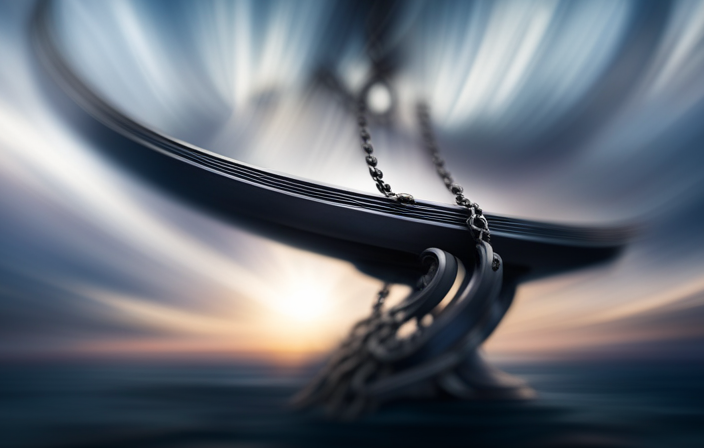
How Big Is A Cruise Ship Anchor

How Much Do Cruise Directors Get Paid

How Much Does A European River Cruise Cost

How Far Offshore Do Cruise Ships Go
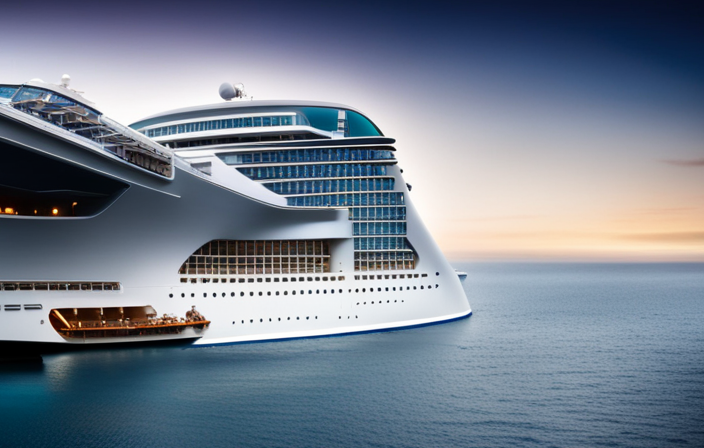
Which Celebrity Cruise Ships Have Been Refurbished

What Drinks Can You Bring On Princess Cruise

How To Turn On Cruise Control Tesla Model 3

What Is The Weather Like On A Transatlantic Cruise In April

How To Set Cruise Control Tesla Model Y

Azamara Onward: Origins, Renovation, and Future Plans

Anthony Bourdain: Unconventional Culinary Icon and Global Influencer
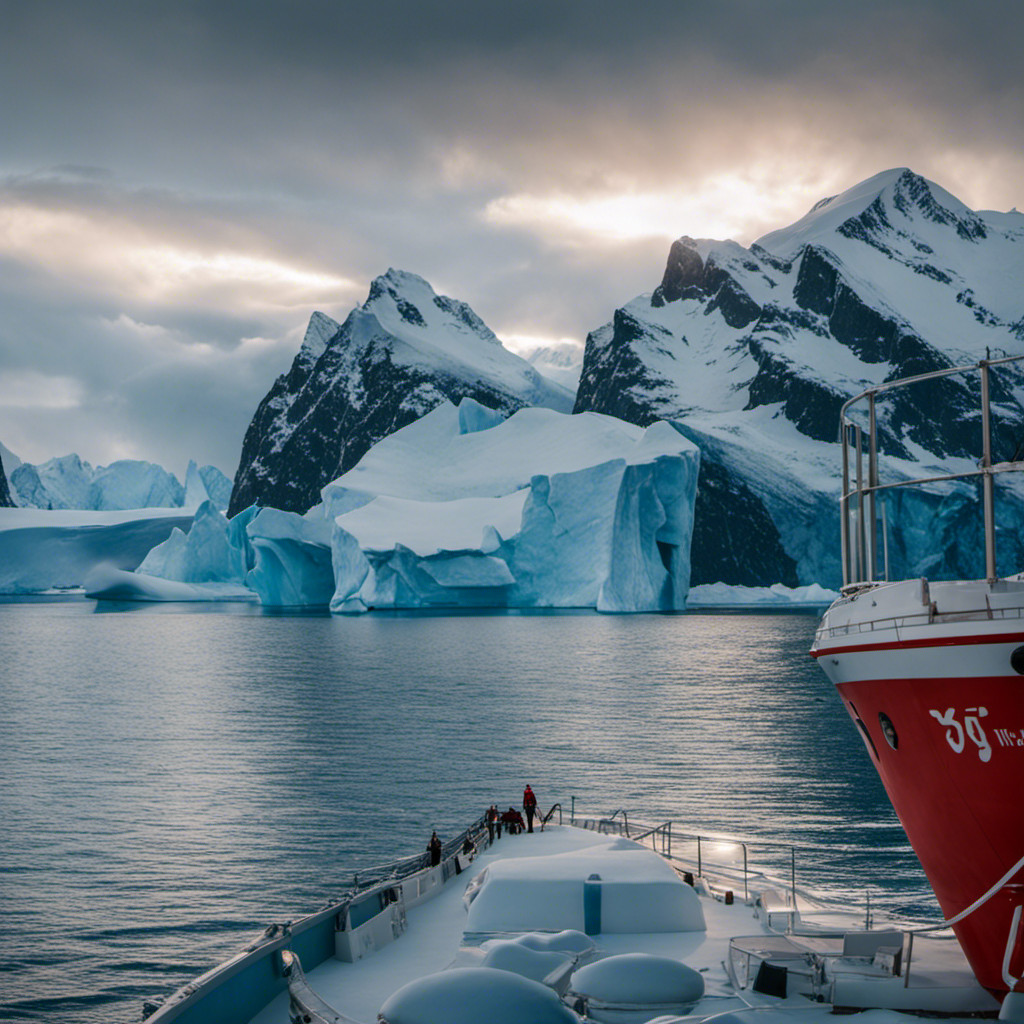
Arctic Adventure: Uncharted Destinations With Le Commandant Charcot
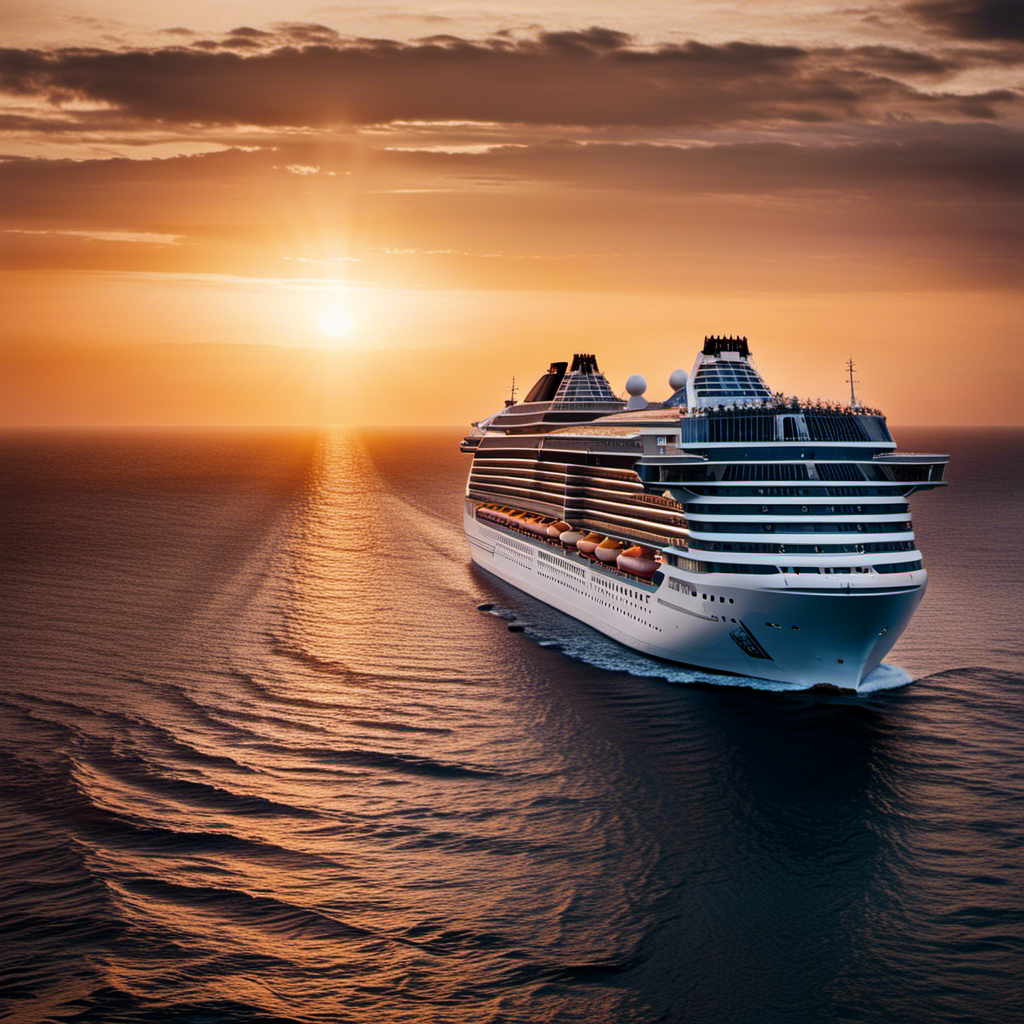
Atlas Ocean Voyages Welcomes World Traveller: A New Chapter Begins!
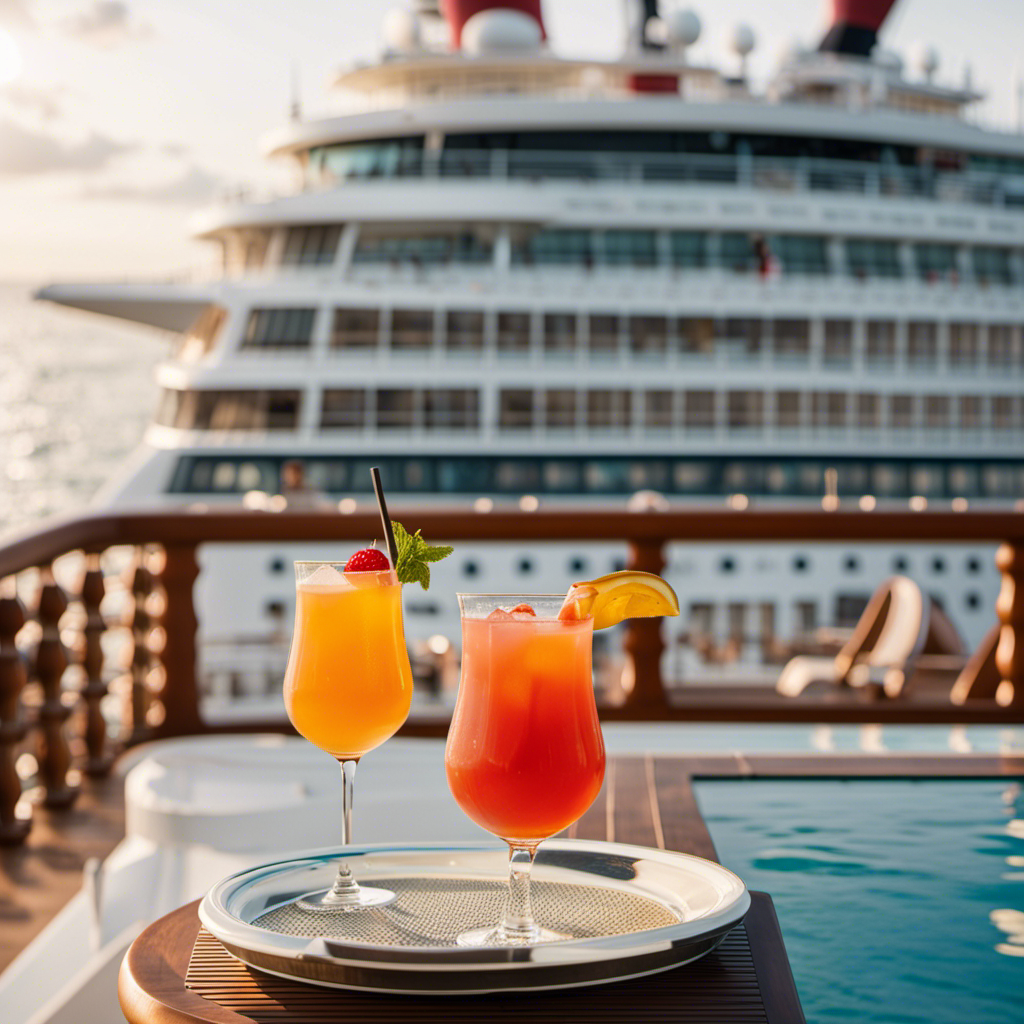
Are Luxury Cruises Worth the Price? Comparing Amenities, Staff Services, Gratuities, Beverages, Dining, Itineraries, Shore Excursions, and Special Memories

How To Check Weather For A Cruise

How To Get From Venice To Chioggia Cruise Terminal

How Do You Qualify For An Ultra Cruise On Carnival
Winter is here! Check out the winter wonderlands at these 5 amazing winter destinations in Montana
- Plan Your Trip
How To Be An Officer On A Cruise Ship
Published: December 20, 2023
Modified: December 28, 2023
by Sharon Sotelo
- Travel Guide
- Travel Tips
Introduction
Working on a cruise ship is an exciting and rewarding experience, offering a unique opportunity to travel the world while pursuing a career. Among the diverse range of roles available on a cruise ship, one of the most vital and challenging positions is that of an officer. Serving as a crucial part of the ship’s crew, officers ensure the smooth operation and safety of the vessel and its passengers.
An officer on a cruise ship holds a position of authority and responsibility, overseeing various operational aspects of the ship. Their primary focus is on maintaining the safety and security of the ship, managing the navigation and communication systems, and ensuring compliance with maritime regulations.
In this article, we will delve into the world of being an officer on a cruise ship, exploring the qualifications and skills required for the role, the training and education necessary to pursue this career, the job opportunities available, as well as the daily duties, challenges, and rewards that come with it. Whether you are a seasoned mariner or considering a career in the cruise industry, this guide will provide valuable insights into the life of a cruise ship officer.
Responsibilities of an Officer on a Cruise Ship
As an officer on a cruise ship, you will be entrusted with a wide range of responsibilities to ensure the smooth operation of the vessel and the safety of its passengers and crew. Your duties may vary depending on your specific rank and department, but here are some key responsibilities that officers commonly have:
- Navigation: One of the primary responsibilities of an officer is to assist the captain in navigating the ship safely. This entails monitoring and interpreting navigational charts, using radar and other navigational aids, and ensuring compliance with international maritime laws and regulations.
- Safety and Security: Officers play a crucial role in maintaining a safe and secure environment on board. They conduct regular safety drills, oversee the implementation of safety procedures, and respond quickly to any emergencies or incidents that may occur during the voyage.
- Communication: Effective communication is vital in the maritime industry, and officers are responsible for maintaining clear and efficient communication channels between the ship, shore-based authorities, and other vessels. This includes managing the ship’s communication equipment and ensuring all communications are recorded accurately and promptly.
- Equipment and Machinery: Officers oversee the maintenance, operation, and repair of various equipment and machinery on board. This includes the ship’s propulsion systems, electrical systems, fire detection and suppression systems, and life-saving equipment. They work closely with other departments and crew members to ensure all equipment is functioning properly.
- Passenger Services: While officers primarily focus on the technical and operational aspects of the ship, they also have a role in providing exceptional customer service to the passengers. This may involve assisting with passenger inquiries, resolving issues, and ensuring a positive overall experience for guests on board.
These are just a few examples of the responsibilities that officers hold on a cruise ship. It is a demanding role that requires a high level of professionalism, attention to detail, and the ability to work well under pressure. By fulfilling these responsibilities, officers contribute to creating a safe and enjoyable environment for everyone on board.
Qualifications and Skills Required
Working as an officer on a cruise ship requires a specific set of qualifications and skills to ensure the smooth and efficient operation of the vessel. While the exact requirements may vary depending on the cruise line and the specific position, here are some essential qualifications and skills often sought after by employers:
- Education and Certification: Most cruise lines require officers to have a minimum of a bachelor’s degree in a relevant field, such as maritime studies, navigation, or marine engineering. Additionally, obtaining appropriate certifications, such as a Officer of the Watch (OOW) or higher-level licenses, is usually necessary to work in a leadership position on board.
- Maritime Experience: Prior maritime experience is highly valued when seeking a position as an officer on a cruise ship. This can include working in the merchant navy, on cargo ships, or in other maritime sectors. It provides valuable knowledge and practical skills that are essential for navigating and operating a cruise ship.
- Technical Knowledge: Officers must possess a solid understanding of ship navigation systems, safety protocols, and machinery operation. This includes familiarity with electronic chart display systems (ECDIS), radar systems, communications equipment, and firefighting and life-saving apparatus. Additionally, knowledge of maritime regulations and standards is crucial for compliance and safety.
- Leadership and Communication: As officers hold positions of authority, strong leadership and communication skills are vital. They must be able to effectively convey instructions, delegate tasks, and coordinate with other crew members. The ability to remain calm under pressure and make quick and informed decisions is also essential in emergency situations.
- Problem-Solving and Adaptability: Cruise ship operations can be unpredictable, and officers must be adept at resolving any challenges that arise. They should possess excellent problem-solving skills, be able to think critically, and adapt to changing circumstances. Flexibility in scheduling and the ability to work long hours or extended periods at sea are often required.
These qualifications and skills are crucial for a successful career as an officer on a cruise ship. It is important to continually update and expand your knowledge through ongoing training and professional development to stay current with industry advancements and regulations. By possessing these competencies, you will be well-equipped to excel in this challenging and rewarding role.
Training and Education
Pursuing a career as an officer on a cruise ship requires a combination of education and practical training to develop the necessary skills and knowledge. Here are some key aspects of the training and education required:
- Maritime Academies: Many aspiring officers choose to enroll in maritime academies or nautical schools to obtain a formal education in maritime studies. These institutions offer comprehensive programs that cover subjects such as navigation, maritime law, ship operations, and safety procedures. Graduating from a reputable maritime academy can significantly enhance your career prospects as an officer.
- STCW Certification: The International Convention on Standards of Training, Certification, and Watchkeeping for Seafarers (STCW) sets the minimum training, certification, and watchkeeping standards for seafarers worldwide. STCW certification is mandatory for officers on cruise ships and can be obtained through approved training institutions. This certification covers various aspects, including firefighting, first aid, personal survival techniques, and ship security.
- On-the-Job Training: Practical experience is invaluable in the maritime industry. Once you have completed your formal education and obtained the necessary certifications, you will likely undergo on-the-job training on a cruise ship. This allows you to apply your theoretical knowledge in a real-world setting under the guidance of experienced officers. During this period, you will gain hands-on experience in navigation, safety procedures, equipment maintenance, and communication protocols.
- Continuing Education: As a professional in the maritime industry, it is important to continuously update your knowledge and skills. This can be achieved through ongoing professional development courses, attending seminars and conferences, and keeping abreast of industry trends and regulations. By staying informed and proactive in your learning, you can enhance your career prospects and advancement opportunities.
Training and education are ongoing processes throughout your career as an officer on a cruise ship. It is essential to maintain high standards of competence and professionalism, as the maritime industry is constantly evolving. By investing in your training and education, you can ensure that you are well-equipped to navigate the challenges and responsibilities of this demanding role.
Job Opportunities
The cruise industry offers a wide array of job opportunities for aspiring officers. Cruise lines around the world are constantly seeking skilled professionals to join their crews. Here are some of the job opportunities available for officers on a cruise ship:
- Deck Officer: Deck officers, also known as navigation officers, play a vital role in the safe navigation and operation of the ship. They are responsible for overseeing the ship’s navigation, ensuring compliance with international maritime regulations, and supervising the deck crew.
- Engine Officer: Engine officers are responsible for the smooth and efficient operation of the ship’s engine room and machinery. They oversee the maintenance and repair of the ship’s propulsion systems, electrical systems, and auxiliary equipment. Engine officers work closely with the engineering crew to ensure the vessel operates at peak performance.
- Staff Captain: The staff captain assists the captain in the overall management of the ship. They oversee various departments, coordinate crew activities, and ensure the ship operates in accordance with company policies and regulations. Staff captains possess strong leadership and management skills.
- Safety Officer: Safety officers are responsible for implementing and maintaining safety protocols and practices on board the ship. They conduct regular safety drills, inspections, and audits to ensure adherence to safety standards. Safety officers work closely with the crew to promote a safe environment for both passengers and staff.
- Environmental Officer: With a growing emphasis on environmental sustainability, cruise lines are increasingly hiring environmental officers. These officers ensure compliance with environmental regulations, implement waste management procedures, and educate the crew and passengers on reducing the ship’s environmental impact.
These are just a few examples of the job opportunities available for officers on a cruise ship. Depending on your qualifications, experience, and career goals, you may have the opportunity to specialize in a specific area or progress to higher ranks and positions of greater responsibility.
It is important to research different cruise lines and their specific job requirements and opportunities. Each cruise line may have its own recruitment processes and preferences. Networking, attending job fairs, and utilizing online job platforms dedicated to cruise ship employment can also help you discover and apply for job opportunities in the industry.
Promotion and Career Progression
The cruise industry offers ample opportunities for career progression and advancement for officers who demonstrate dedication, skills, and a strong work ethic. Here are some ways in which you can experience promotion and career progression within the industry:
- Rank Advancement: As an officer, you can progress through the ranks by gaining experience and completing additional training. Starting at an entry-level position such as Third Officer or Junior Engineer, you can work your way up to higher ranks like Second Officer, Chief Officer, or Chief Engineer. With each promotion, you will have increased responsibilities and opportunities for leadership.
- Specialization: Cruise ship officers often have the opportunity to specialize in a particular area of expertise. This could be in navigation, safety, environmental management, or other technical aspects. By acquiring advanced certifications and gaining experience in your chosen field, you can enhance your professional profile and become a sought-after specialist in the industry.
- Transfer to Shore Positions: Some officers may choose to transition from working on a cruise ship to shore-based positions within the cruise industry. This could involve roles in maritime administration, vessel operations management, safety and security, or even corporate positions in cruise line headquarters. Transferring to a shore-based role can provide new challenges and career growth opportunities.
- Management and Leadership: For those with excellent leadership skills, there are opportunities to move into management and leadership positions. Taking on roles such as Staff Captain, Safety Officer, or Environmental Officer can pave the way for more senior leadership positions within the cruise industry. These positions require strong managerial abilities, decision-making skills, and the ability to motivate and inspire a team.
It’s important to note that career progression in the cruise industry is often a combination of experience, education, and performance evaluations. Demonstrating a strong commitment to professional development, seeking out additional training opportunities, and consistently delivering high-quality work can greatly enhance your chances of promotion and career advancement.
Keep in mind that building a successful career in the cruise industry requires patience, hard work, and perseverance. It is crucial to stay up-to-date with industry trends, network with professionals in the field, and continuously seek opportunities to improve your skills and knowledge. By doing so, you can carve a fulfilling and rewarding career path as an officer on a cruise ship.
Daily Duties and Routine
The daily duties and routine of an officer on a cruise ship can be demanding, but also dynamic and rewarding. While the specific tasks may vary depending on the position and department, here is an overview of what you can expect as an officer:
Morning Briefings: Each day typically begins with a morning briefing, where officers gather to discuss the ship’s itinerary, weather conditions, and any updates or important information. This is an opportunity to communicate with other departments and ensure everyone is informed and prepared for the day ahead.
Navigation and Safety Checks: Navigational officers will spend a considerable amount of time on the bridge, overseeing the ship’s navigation systems, updating charts, and monitoring the vessel’s position and course. Safety checks are conducted regularly to ensure all safety equipment, such as lifeboats, life rafts, and firefighting equipment, is in good working order.
Crew Coordination: Officers are responsible for coordinating and supervising the work of the crew members under their command. This involves delegating tasks, providing guidance and support, and ensuring that all operations are carried out efficiently and safely.
Safety Inspections and Drills: Regular safety inspections and drills are crucial on a cruise ship. Officers participate in and supervise these drills, including fire drills, emergency evacuation exercises, and man-overboard drills. They also conduct routine inspections of various ship areas to identify and address any safety hazards or maintenance issues.
Communication: Communication is vital for smooth operations on a cruise ship. Officers must maintain clear and effective communication with other departments, the captain, shore-based authorities, and other vessels. This includes transmitting and receiving messages via radio, keeping logs and records, and ensuring accurate and timely communication flow.
Administrative Duties: Officers are responsible for various administrative tasks, such as maintaining logbooks, updating reports, and completing paperwork related to operational matters. They may also be involved in crew scheduling, managing work rosters, and approving leave requests.
Passenger Interaction: While officers primarily focus on the technical aspects of ship operations, they also have opportunities to interact with passengers. This may involve attending social events, responding to passenger inquiries or concerns, and ensuring a positive guest experience.
Training and Development: Continuous training and professional development are important for officers to stay updated on industry regulations, advancements, and best practices. This may involve attending training sessions, participating in workshops, and keeping up with the latest industry publications and resources.
The daily routine of an officer can be dynamic and unpredictable, as unexpected situations or emergencies may arise at any time. Flexibility, adaptability, and the ability to think quickly and make sound decisions are essential skills for officers on a cruise ship.
Challenges and Rewards
Being an officer on a cruise ship comes with its own set of challenges and rewards. Here, we explore the experiences you can expect in this role:
Challenges:
- Long Working Hours: Officers on a cruise ship often work long hours, ranging from 10 to 12 hours a day, and may have to work for several months without a break. The nature of the job requires round-the-clock availability and the ability to handle unexpected situations.
- Isolation from Friends and Family: Being at sea for extended periods means being away from friends and family. The demanding schedule and limited communication options can make maintaining personal relationships a challenge.
- High Workload and Responsibility: The responsibilities entrusted to officers on a cruise ship are significant. They need to ensure the safety of passengers, make critical decisions in emergent situations, and maintain the smooth operation of the ship. The demanding workload can be mentally and physically exhausting.
- Adaptability to Different Cultures: Cruise ships are a melting pot of cultural diversity, with crew members and passengers from various backgrounds. Officers need to navigate through cultural differences, diverse work environments, and effectively communicate and collaborate with people from different cultures.
- Emergency Situations: Officers must be prepared to handle unexpected emergencies such as severe weather conditions, medical emergencies, fires, or other incidents that may require swift action and decision-making under stress.
- Global Travel Opportunities: One of the most significant rewards of being an officer on a cruise ship is the chance to travel the world. Exploring multiple destinations, experiencing different cultures, and witnessing breathtaking scenery are unparalleled perks of the job.
- Career Growth and Development: The cruise industry provides ample opportunities for career advancement and professional development. With the right skills, experience, and dedication, officers can progress to higher ranks, take on managerial roles, or specialize in specific areas of the industry.
- Lifelong Friendships: Working closely with a diverse group of crew members creates opportunities to form deep and lasting connections. The camaraderie and teamwork that develops onboard can lead to lifelong friendships and a supportive network of colleagues.
- Being Part of Memorable Experiences: As an officer on a cruise ship, you play a vital role in creating memorable experiences for passengers. Being able to witness joyful moments and contribute to lifelong memories for guests is a rewarding aspect of the job.
- Competitive Salary and Benefit Packages: Officers on cruise ships typically receive competitive salaries and comprehensive benefit packages, which can include medical insurance, paid vacation, retirement plans, and discounted travel for themselves and their immediate family members.
While there may be challenges that come with the role, the rewards often outweigh them. The opportunity to explore the world, grow professionally, and create unforgettable experiences for passengers can make being an officer on a cruise ship a fulfilling and enriching career choice.
Salary and Compensation
The salary and compensation for officers on a cruise ship can vary depending on factors such as rank, experience, cruise line, and the specific position held. While it is difficult to provide exact figures, here is an overview of the typical salary and compensation structure for officers:
Base Salary: Officers on a cruise ship generally receive a base salary, which varies based on their rank and position. Higher-ranking officers, such as Staff Captains or Chief Engineers, typically command higher salaries compared to entry-level officers.
Bonuses and Incentives: Some cruise lines offer bonuses and incentives based on performance, exceptional service, or meeting specific targets. These incentives can include performance-based bonuses, safety bonuses, or rewards for excellent guest feedback.
Room and Board: One of the advantages of working on a cruise ship is that accommodation and meals are provided. Officers generally have their own cabin, often shared with another officer of the same gender, which is equipped with the necessary amenities for a comfortable living environment.
Paid Vacation and Benefits: Officers on a cruise ship usually receive paid vacation, allowing them to take time off and recharge. In addition, cruise lines generally provide comprehensive benefits packages, which may include medical insurance, retirement plans, and additional perks like discounted travel for themselves and their family members.
Tips and Service Charges: Some cruise lines distribute a portion of the onboard service charges and gratuities to the crew, including officers. These tips can serve as an additional source of income and can vary based on the ship’s occupancy and the satisfaction of the passengers.
Currency and Tax Considerations: Salaries on a cruise ship are often paid in US dollars or the currency of the cruise line’s home country. Additionally, depending on the cruise line and the individual’s nationality, tax implications may vary. It is important to research the tax requirements and applicable laws of your home country to understand the deductions or exemptions that may apply to your earnings.
It is important to note that salaries and compensation in the cruise industry can vary considerably. Factors such as years of experience, specialized certifications, and the reputation of the cruise line can influence the earning potential for officers. Additionally, promotions to higher ranks and positions generally come with increased responsibilities and higher compensation packages.
Overall, while the lifestyle and travel opportunities can be significant perks, individuals considering a career as an officer on a cruise ship should carefully evaluate the salary and compensation package offered by each cruise line to ensure it aligns with their financial goals and expectations.
Working as an officer on a cruise ship offers a unique and rewarding career path for those with a passion for the maritime industry. The responsibilities of an officer are crucial to the safe and efficient operation of the ship, ensuring the well-being of passengers and crew members alike.
Throughout this article, we have explored the various aspects of being an officer on a cruise ship, from responsibilities and qualifications to training and career progression. While the role brings challenges such as long hours, the need for adaptability, and time away from loved ones, the rewards are plentiful.
The opportunity to travel the world, develop lifelong friendships, and be a part of creating unforgettable experiences for passengers is incredibly fulfilling. The competitive salary and benefits packages, along with opportunities for career advancement, make a career as an officer on a cruise ship financially rewarding as well.
It is important to continuously invest in education, training, and skill development to stay at the forefront of the industry. By doing so, officers can progress through the ranks, specialize in specific areas, and potentially transition to shore-based positions within the cruise industry.
If you are passionate about the maritime industry, possess the necessary qualifications and skills, and thrive in a dynamic and fast-paced environment, a career as an officer on a cruise ship could be your calling. It is an exciting and fulfilling path that allows you to travel the world while embracing new challenges and opportunities for personal and professional growth.

- Privacy Overview
- Strictly Necessary Cookies
This website uses cookies so that we can provide you with the best user experience possible. Cookie information is stored in your browser and performs functions such as recognising you when you return to our website and helping our team to understand which sections of the website you find most interesting and useful.
Strictly Necessary Cookie should be enabled at all times so that we can save your preferences for cookie settings.
If you disable this cookie, we will not be able to save your preferences. This means that every time you visit this website you will need to enable or disable cookies again.
How To Become a Cruise Ship Security Officer
- strongtowersecurity
- January 5, 2024
- No Comments
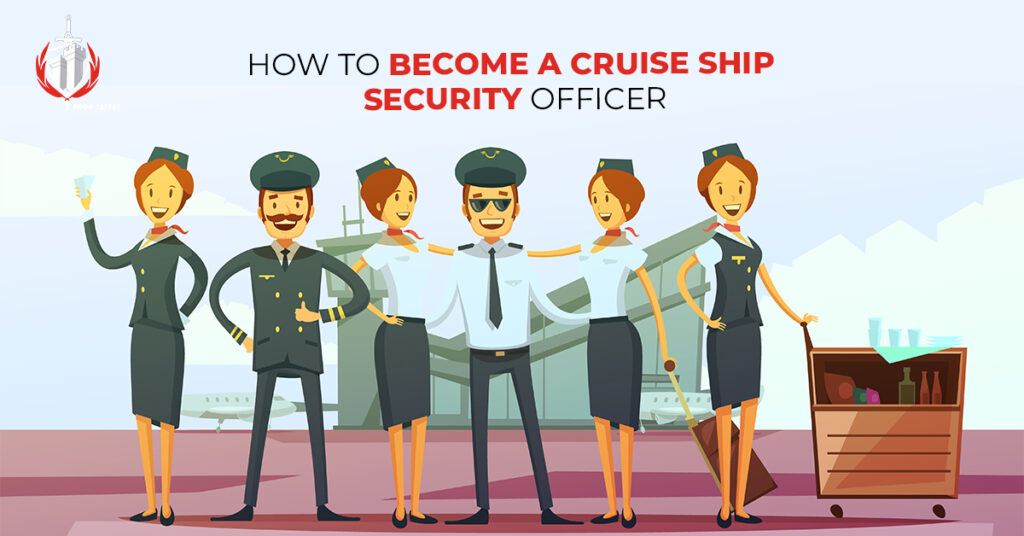
Introduction
Starting a journey into cruise ship security opens doors to a super important job. Cruise ship security officers are like protectors on floating cities in the sea. They ensure everyone on the ship stays safe and happy, watching out for all the travelers.
Becoming a cruise ship security officer is not just a job; it’s a meaningful adventure where you help keep sea trips safe and enjoyable. In sunny California, where the waves meet the sun, skilled security guards on cruise ships are really needed. You’ll need some certificates, stay fit, and learn about securing things to get there. Cruise ship security is a mission to keep sea adventures safe and fun, giving you a chance to grow and have exciting responsibilities.
So, if you want to begin your career as a cruise ship officer , this is your guide to kick-start your journey. Cruise into cruise ship security and let the sea of possibilities guide you to a cool and important job. So, let’s begin to explore your career possibilities in cruise ship security.
Role of a Cruise Ship Security Officer
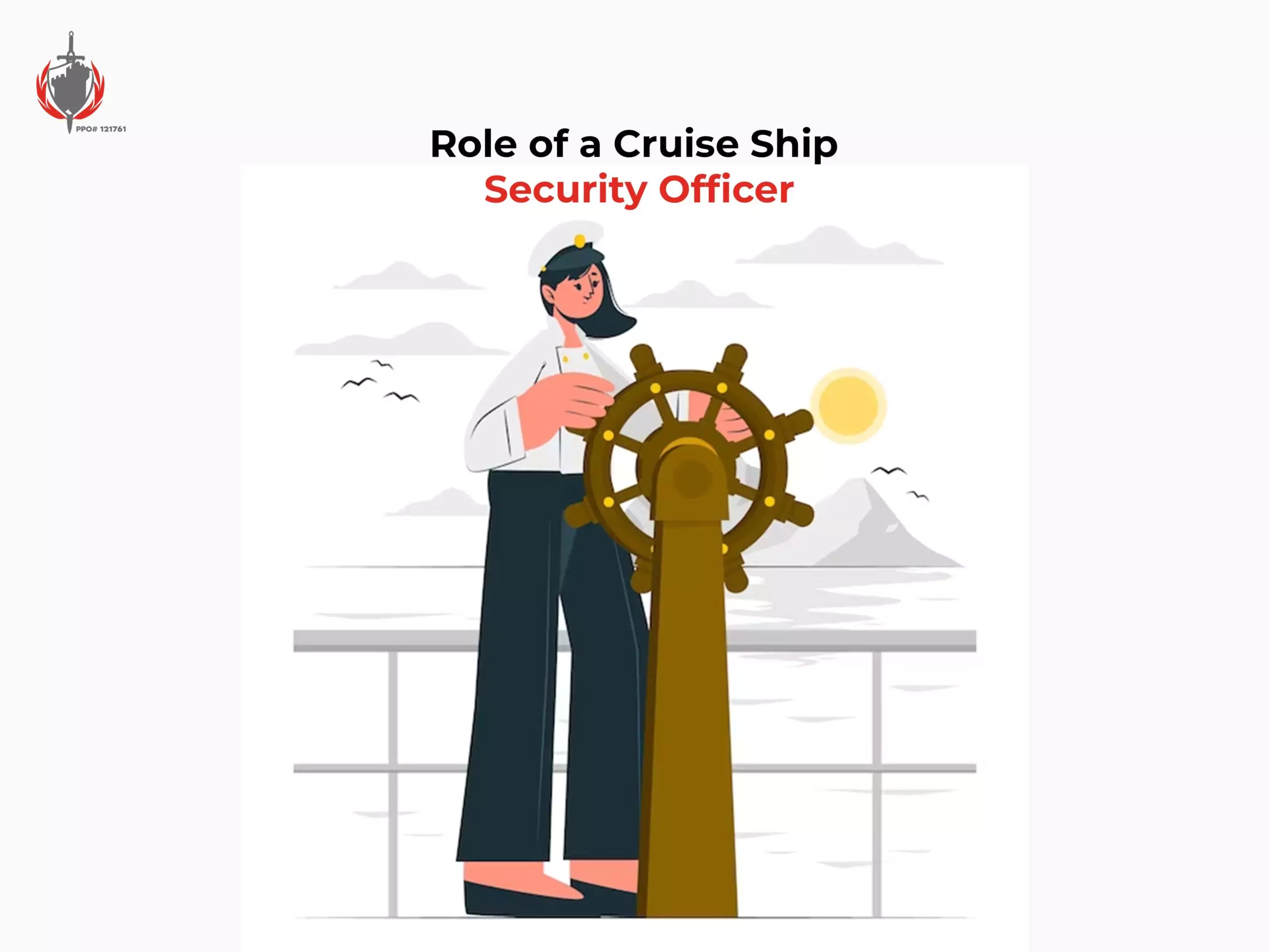
Have you ever wondered who makes sure your cruise is safe and fun? That’s the Cruise Ship Security Officer! Their excellent job goes beyond checking tickets – they watch over everything to ensure you’re safe. From using fancy cameras to checking every corner, they stop problems before they happen. Imagine handling big crowds and different people every day – that’s their daily adventure. The most important part? Making sure you and everyone on the ship have a great time, no worries. So, these security heroes quietly work to make your journey awesome and safe when cruising the sea. Smooth sailing, thanks to the Cruise Ship Security Officers!
Qualifications and Requirements
You’ll need some things to become a Cruise Ship Security Officer and keep everyone safe on sea journeys. First, finish high school or something like that. Get certificates for security and first aid – they’re like superhero tools. Then, you’ll undergo special training to learn how to handle problems and keep things safe on the ship. But it’s not just about papers and courses – you need extraordinary skills, like talking nicely to people, being ready for anything, and staying calm if things get tricky. So, if you’re considering this adventure, ensure you’ve got these things – it’s your ticket to a fun and essential job at sea!
Cruise Ship Security Protocols
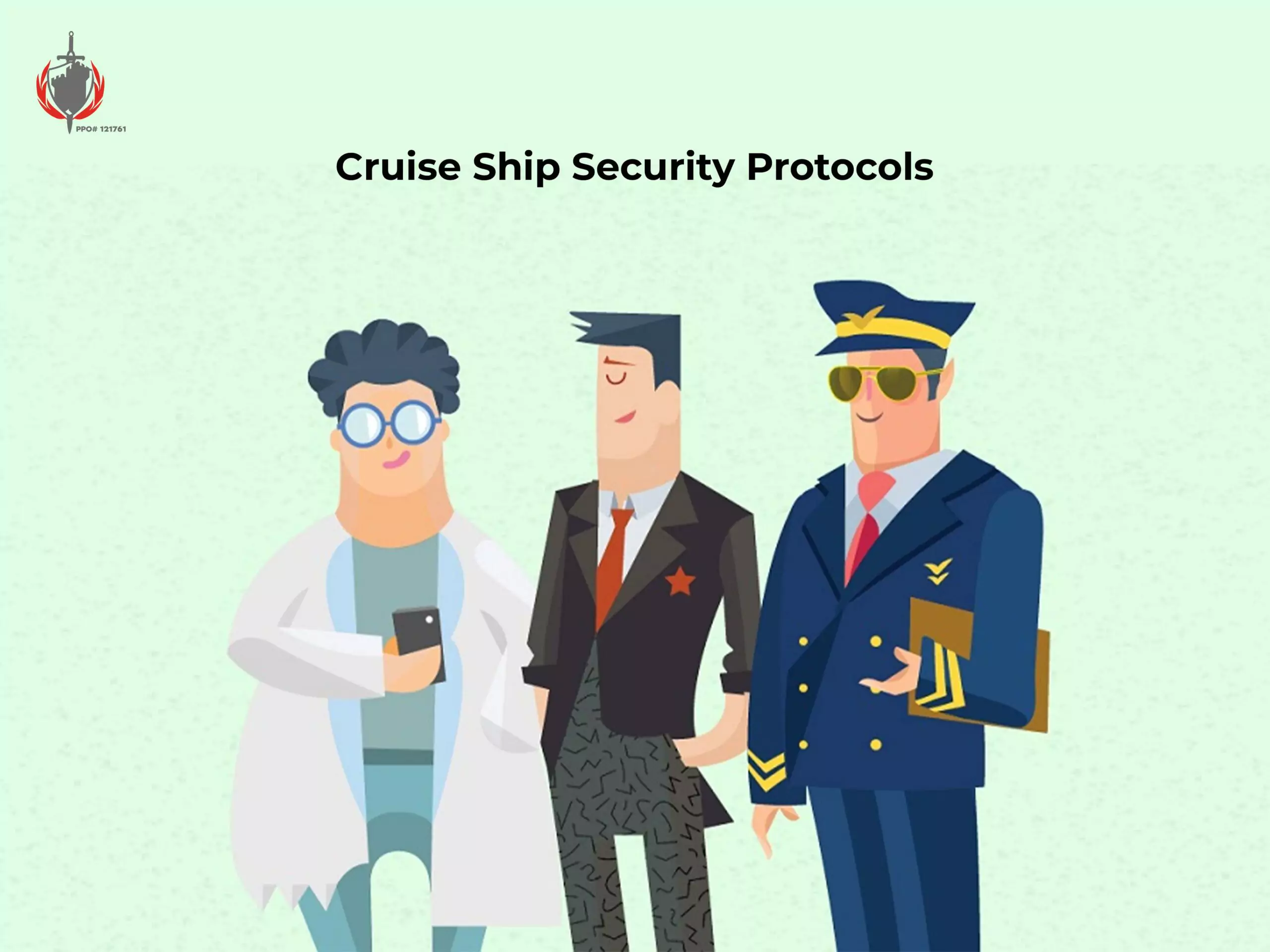
Keeping everyone safe on a cruise involves having special rules, like a plan. These rules, called security protocols, cover everything from watching over the ship to dealing with problems quickly. To do this, Cruise Ship Security Officers learn what to do in emergencies and how to work together with other ship staff to keep everything secure. It’s like a significant team effort, making sure everyone on the ship has a safe and happy journey. So, when you’re on a cruise, know these simple yet important rules are in place to make your adventure smooth and worry-free!
Career Path and Advancement Opportunities
When it comes to a career in cruise ship security, starting small can lead to big adventures. Begin with entry-level positions to gain valuable experience, whether checking passes or keeping an eye on things. As you learn the ropes, there’s a chance for real growth within the cruise ship security world. You could climb up the ladder, taking on more responsibilities and becoming a leader in security. What are the perks of this career journey? Besides the satisfaction of keeping the seas safe, there’s the chance to explore different roles and places. Choosing a career in cruise ship security means more than just a job – it’s a ticket to a journey full of opportunities and personal growth. So, if you’re looking for a career with a view, cruise ship security might be your ideal destination.
Cruise Ship Security in California
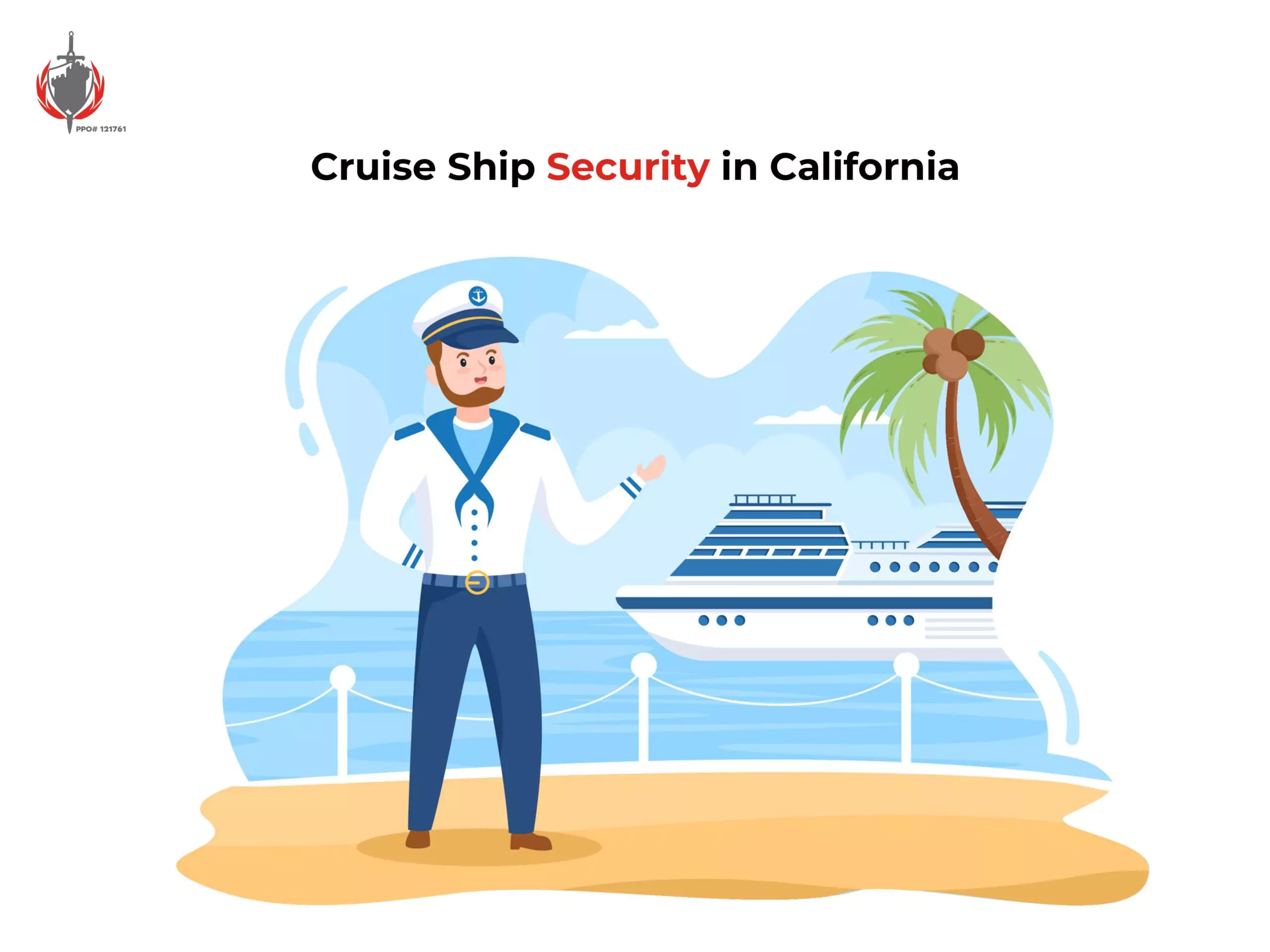
Now, let’s talk about cruise ship security in California – it’s a bit special! The sunny shores bring some unique things to consider when keeping everyone safe on the cruise. The Cruise Ship Security Guards are heroes, ensuring people feel protected while cruising along California’s beaches. And guess what? There are some big companies doing this important job in California. So, if you’re considering cruises and security, know that these guards and companies are working hard to ensure smooth sailing along California’s beautiful coasts.
You might also like 14 Different Types of Security Guards and What They Do
Training and Preparation
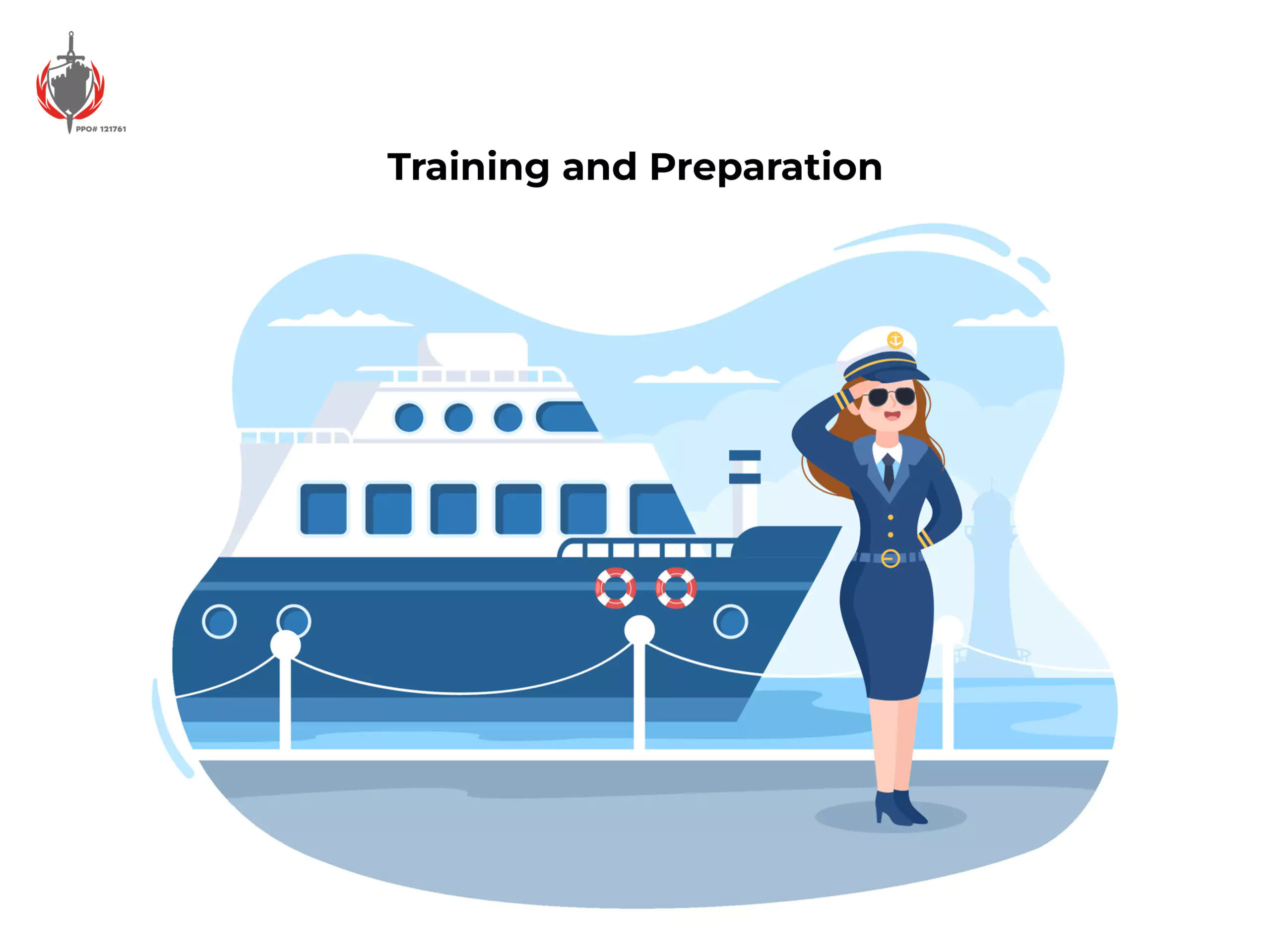
If you’re considering a cruise ship security officer job, here’s your guide to getting ready. Start by figuring out what you need to know and do to be all set for this excellent job. Take some courses and get certifications – they’re like your special tools for the job. And don’t forget to listen to the experienced folks who have been there before. Their advice is like a map, helping you navigate the training journey. So, gear up, get ready, and set sail into California’s world of cruise ship security . You’ve got this!
Application Process
If you are thinking of getting a cruise ship security job, Easy-peasy! First, figure out the steps to apply – it’s like making a plan. Then, know what they usually want during the hiring process, maybe some forms and talking about yourself. And here’s an excellent tip: learn to shine and stand out. It’s your time to show them why you’re the best for the team. So, get ready, set sail, and smoothly go through the application process. Your dream job on the big seas might be a few steps away!
As we wrap up our journey into cruise ship security, remember, this job is like a giant sea adventure! Cruise Ship Security Officers are the heroes, ensuring everyone stays safe and happy on the ship. From California’s sunny coasts to the vast oceans, they work hard to keep your sea trips smooth and worry-free.To start your adventure in cruise ship security , we talked about what you need – certificates and excellent skills. However, applying for the job might seem tricky, but with our guide, you’re ready to go. Just like sailing, this job is not just about following rules. It’s about being part of a team, ready for anything to keep everyone safe. And guess what? You can grow in this job, starting from the basics to becoming a leader.
So, whether you’re dreaming of guarding California’s beaches or sailing the open sea, cruise ship security is full of possibilities. As you set sail on this incredible career, may your journey be as smooth as the sea, filled with exciting moments and the joy of making sea adventures safe for everyone. Good luck with your future adventure in cruise
Leave a Comment Cancel Reply
Your email address will not be published. Required fields are marked *
Save my name, email, and website in this browser for the next time I comment.

Get Protected And Stay Protected
Call Strong Tower Security Corp Today At: 844-787-1810
- Privacy Policy
Social Links
Contact info.

We're always ready to respond
URL copied to the clipboard!
Although we work hard to prevent incidents, regrettably incidents do sometimes occur. For this reason, it is important to be prepared to effectively respond to incidents. The Group’s safety and security preparedness efforts include training our crew to handle situations to minimize their impact on guests and crew.
Security training.
Each Royal Caribbean Group ship is staffed with a security team that is part of the ship’s permanent crew. The Staff Captain, who is also the second in command, oversees the Security Department. The Security Officer is the head of the security team and is responsible for day-to-day security operations onboard. The Security Officer is typically supported by one or more Deputy Security Officers and Supervisors, who direct the activities of a team of guards.
We recruit our onboard security professionals from around the world and hire candidates with backgrounds in the military, law enforcement or private security sectors. Our recruiting process involves conducting face-to-face interviews with candidates before they are considered for hire. We conduct such interviews in many places around the world, to find the best talent available.
We require our security personnel to be fully familiar with international regulations and provide them with internal specialized training as well as training that results in certification from government-accredited companies. In addition, each security team member who works on a Royal Caribbean Group ship with a U.S. itinerary must obtain a visa from the U.S. Department of State. This requirement helps strengthen our recruitment and screening process, as any applicant for the security team who is denied a visa by the U.S. Government will not be hired.
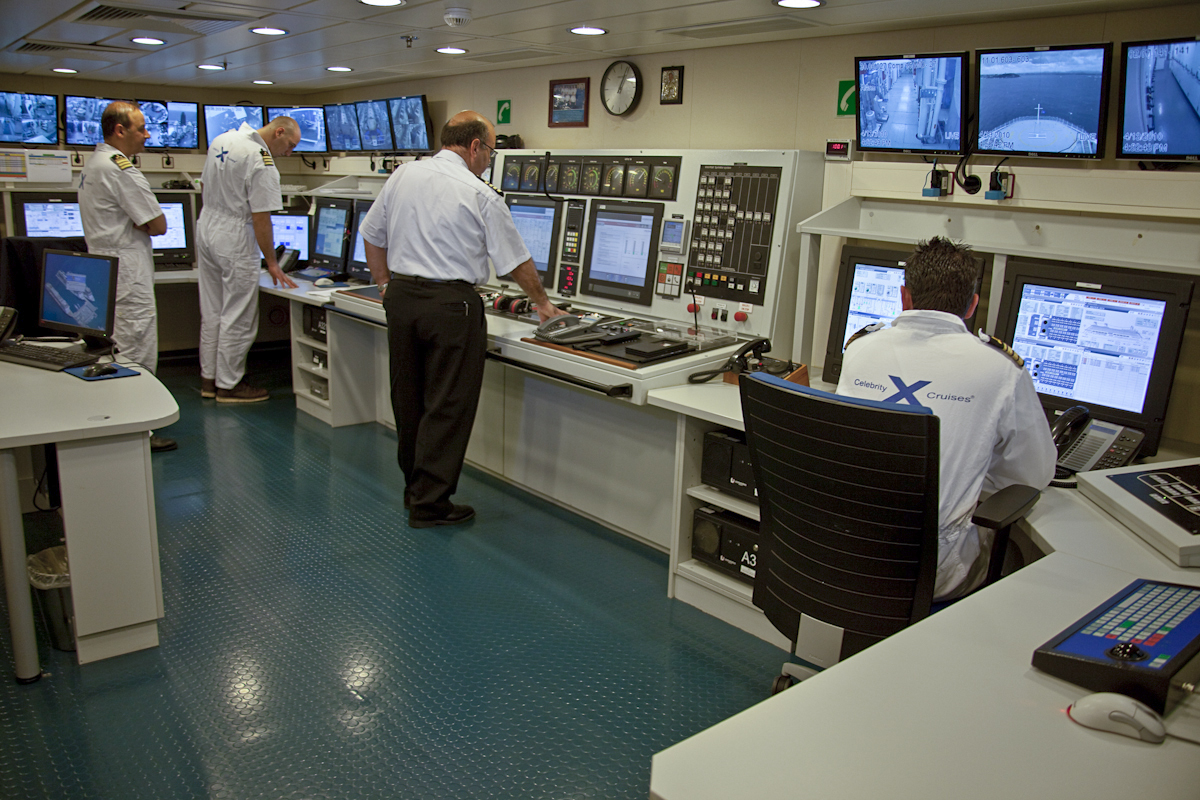
Each Security Officer is independently certified by an outside organization as having met the knowledge requirements of the Group’s internal security processes, as well as the U.S. Government (CVSSA) security requirements and standards. On an annual basis, every Security Officer in our fleet participates in a week-long shoreside security seminar held in Miami that is continually reviewed and modified to incorporate new measures and national and international requirements. This curriculum also includes role-playing in different shipboard security scenarios to allow the Security Officers to practice their skills. In addition, U.S. federal law enforcement agencies, including the FBI, the Drug Enforcement Administration, Customs and Border Protection, and Homeland Security Investigations, have participated and provided up-to-date presentations in their respective fields of expertise.
Our Security Officer training also places an important emphasis on access security. Access security training topics include technical equipment, recognition of characteristics of persons who may threaten security, crowd control and management and conflict resolution.
Crew training
In addition to the specialized training that our officers and security staff receive, every crew member must undergo ship familiarization and emergency assignment training upon reporting onboard and before performing their duties. This training is overseen by the Safety Officer and the Security Officer, and includes Security Awareness Training, Pre-Departure Safety Training, Ship Safety Orientation Training, Crowd Management Training and Personnel Nominated to Assist Passengers in an Emergency Training. Specific training modules are also delivered for each crew functional area.
Crews are regularly trained and drilled on a variety of topics and scenarios. Some of these are mandated by regulations, while others are a part of the Group’s Above and Beyond Compliance focus. As an example, our crew practices its abandon ship procedures much more frequently than is currently mandated (twice per month versus the once every three months required by regulations). Other types of required drills include: Fire Fighting, Search and Rescue, Medical, Emergency Steering, Blackout Recovery, Crowd Management, Lifeboat Command, Damage Control, Chemical and Oil Spill, Man Overboard, and Security Threats.
Crew members also take part in a variety of other company-required training topics such as leadership, safety observation, ethics, communication and environmental policy training. In addition, all crew members must complete pre-departure safety training, which includes a walk through the vessel with the safety officer to identify different safety systems, escape routes, and guest safety issues.
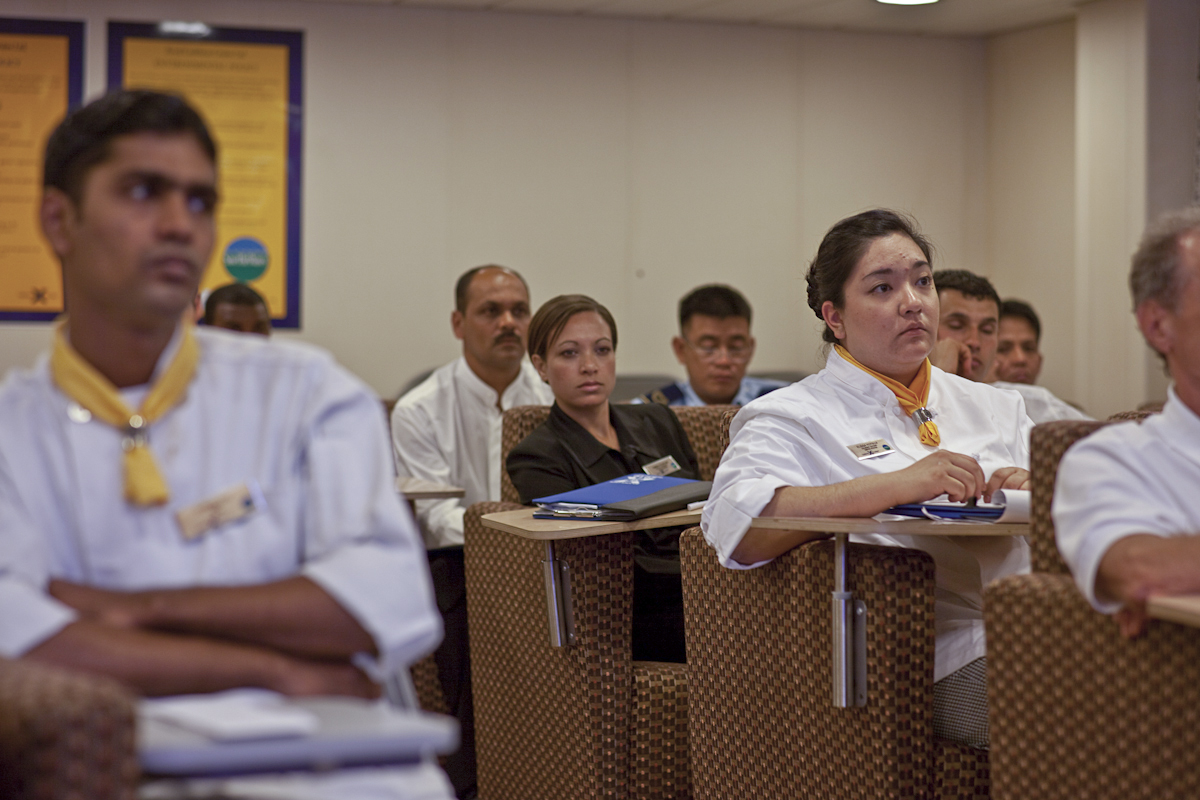
We also have special systems and procedures in place to ensure effective preparedness in case of fire. While each of our ships is equipped with advanced fire detection and suppression systems, fire safety really begins with prevention. Our ships are constructed and outfitted to comply with stringent international fire safety regulations, including requirements for fire integrity of bulkheads (walls) and windows, and fire resistance characteristics of fixtures onboard (such as furniture and carpets). Our ships are inspected throughout construction by third-party safety inspectors from recognized classification societies, and flag and port state safety agencies, such as the U.S. Coast Guard.
Even though fire risk is minimal, fire suppression systems are installed throughout each ship. The primary fire suppression system on most ships is a water-mist system, which converts water into a mist state that presents more surface area for smoke and heat to be absorbed. Water-mist systems are very effective and also safe for people who may be near them when they are activated. In areas such as engine spaces and galleys, we have installed both water mist and CO2 systems. In addition, we have gone above and beyond compliance with regulations by installing foam systems in certain technical spaces and wet chemical extinguishers in all of our galleys. These wet chemical extinguishers are similar to ones found in land-based kitchens and are especially effective in the case of a deep fat fryer fire.
Our ships are also equipped with an extensive series of fire sensors, which are monitored by crew members on the bridge and in the engine control rooms. If a fire detector indicates there may be a fire onboard, response personnel are immediately dispatched to the area to evaluate the situation. If indicated, mobile firefighting groups respond, outfitted with full firefighter gear, breathing apparatus and special heat-seeking systems that use thermal-imaging cameras. These cameras (both hand-held and helmet-mounted) help to quickly identify the source of a fire and to locate any people who may be in the affected area. Responding crew also have access to an Impulse Fire Extinguisher (IFEX), which shoots a blast of water using pressurized air and is ideal for rapid response in quickly suppressing a fire. With these tools, our highly trained personnel on the bridge and on the scene can manage fire-related situations effectively.
CVSSA Training Curriculum

This program will assist maritime organizations in ensuring the safety and security of cruise ship passengers traveling to and from American ports.
Completion of the program confirms that personnel have met the basic requirements defined by the federal bureau of investigation (fbi), the u.s. coast guard (uscg), and the maritime administration (marad) on crime prevention, detection, evidence preservation, and reporting., about the cvssa training curriculum, curriculum objectives.
- Contribute to the enhancement of safety and security through heightened awareness
- Recognize security and safety risks, threats, and vulnerabilities
- Conduct proper evidence preservation
- Report and record criminal offenses
- Understand the importance of following maritime security laws and regulations
- Recognize the security regulations and best practices that you are responsible for onboard your ship
- Understand how your company and ship security officers work with law enforcement to enhance shipboard safety and security
- Recognize the responsibilities of your company, ship, and law enforcement when responding to criminal threats or incidents
- Effectively use and maintain security equipment and systems
- Recognize the operational limitations of equipment and systems
- Understand the importance of retaining video surveillance records
- Identify risks to your ships, passengers and crew
- Recognize vulnerabilities in your ships’ infrastructure and operations
- Prepare appropriate responses to credible threats and vulnerabilities identified to your ship, its passengers, and crew
- Identify law enforcement techniques for entering and securing a crime scene
- Recognize the importance and techniques associated with crime scene photography
- Understand the actions required to process different types of crime scenes
- Know the requirements and procedures for controlling access to a crime scene
- Define the procedures for properly executing the transfer of evidence and other documentation associated with the crime to the responding law enforcement agency or agencies
- Recall the procedures for returning the crime scene to the ship and restoring full cruise operations
- Understand the CVSSA requirements for documenting and reporting crimes that occur onboard
- Recognize your role in complying with CVSSA-mandated administrative requirements
The Moxie Advantage
Moxie Media can provide engaging training curriculums to assist cruise personnel directly or through cruise companies and their instructors in providing highly effective eLearning training. These training resources allow vessel employees to experience actual cruise industry work life and locations through stimulating courses featuring high definition video, audio, animation, interactive exercises, simulations, quizzes and automated testing. Utilizing these resources allows cruise industry training instructors to dedicate more time working one-on-one with students focusing on the critical security concepts essential to safeguarding passenger and crew operations.

Security Dynamics
- IMO World Maritime University, (WMU)
- Federal Law Enforcement Training Center (FLETC)
- USCG Maritime Law Enforcement Academy (MLEA)
- Maritime Security Institute
CVSSA Curriculum Pricing
Internet based curriculum:
$595 per student
Topics covered.
- Introduction
Maritime Security Policy
Security Responsibilities
Security Equipment
- Risks Identification, Vulnerability Recognition, and Response
- Crime Scene Actions
Security Administration
Preview Videos

Introduction to CVSSA

Risk Identification, Vulnerability, Recognition, & Response
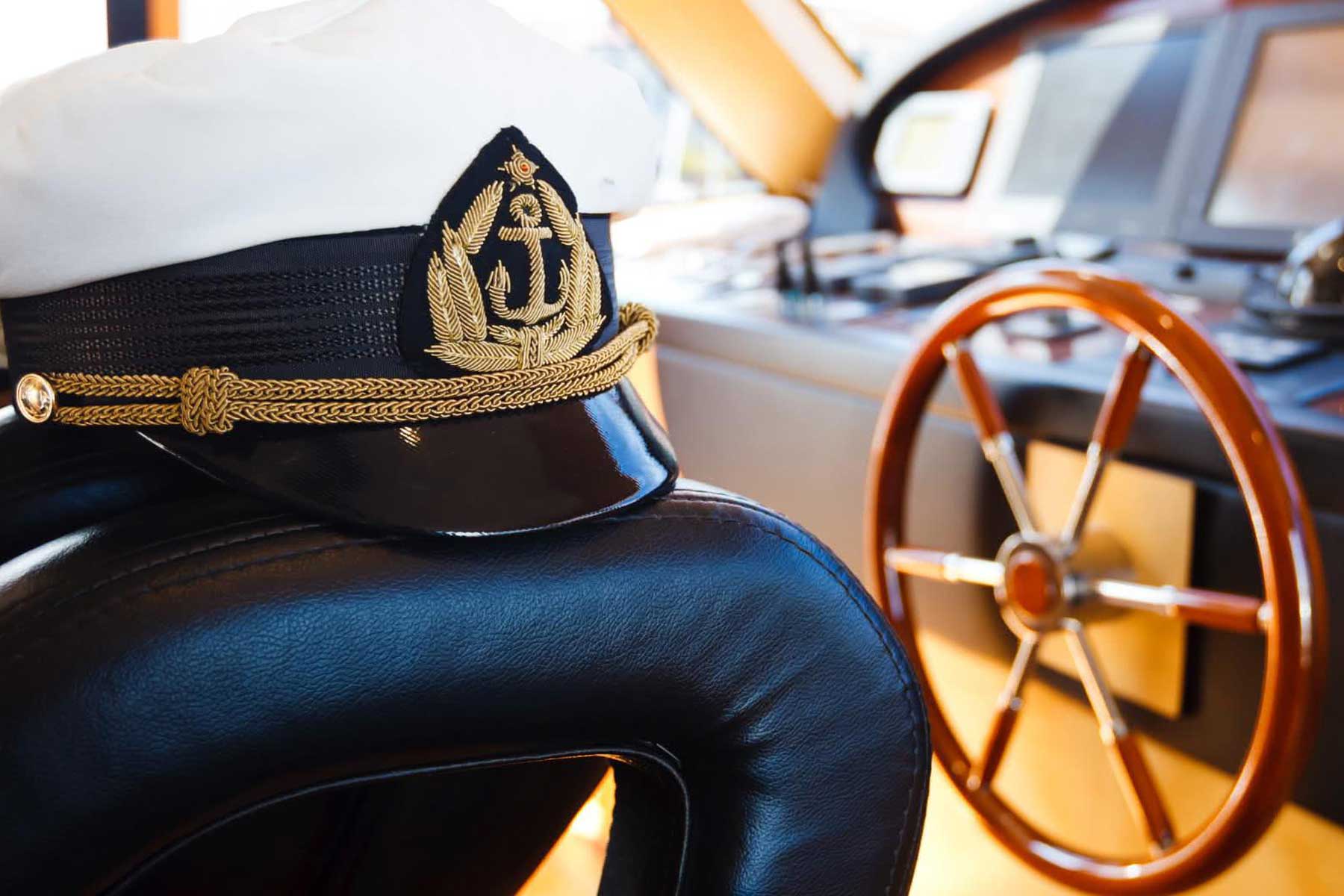
Overview of Crime Scene Investigation
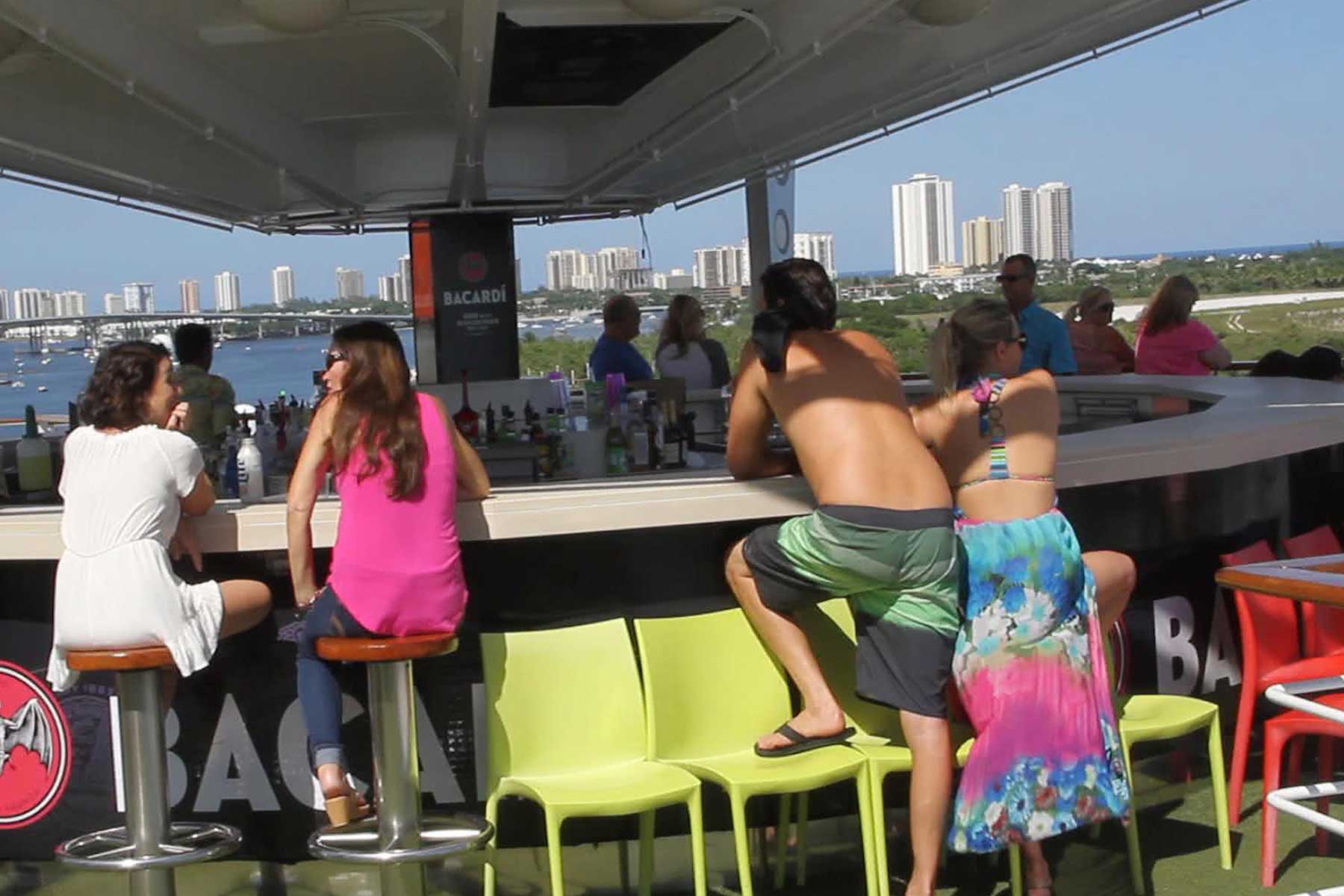
Access Control
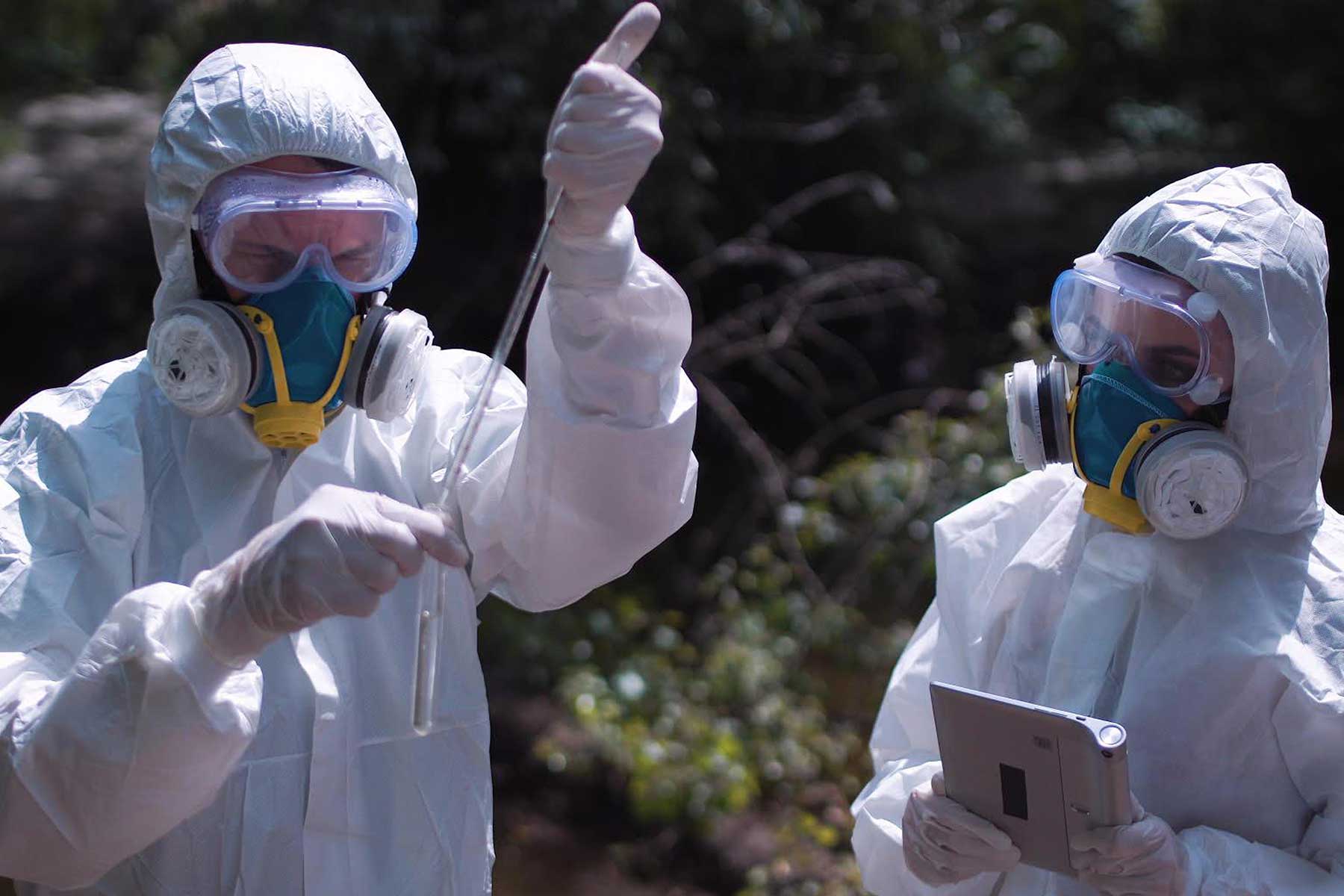
Techniques Used by Law Enforcement

Actions Required for Different Crime Scenes
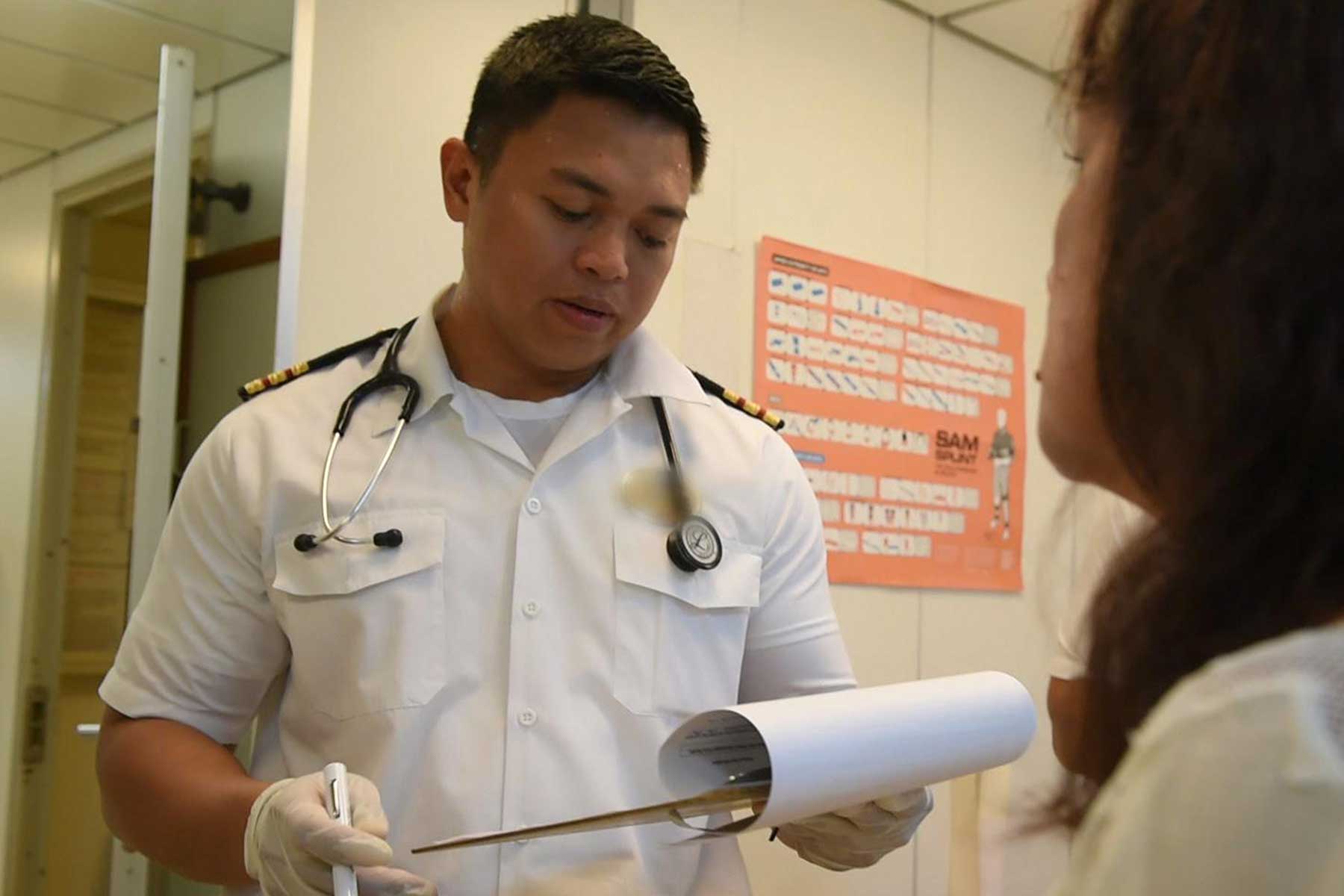
Processing, Documenting and Handing Over the Crime Scene
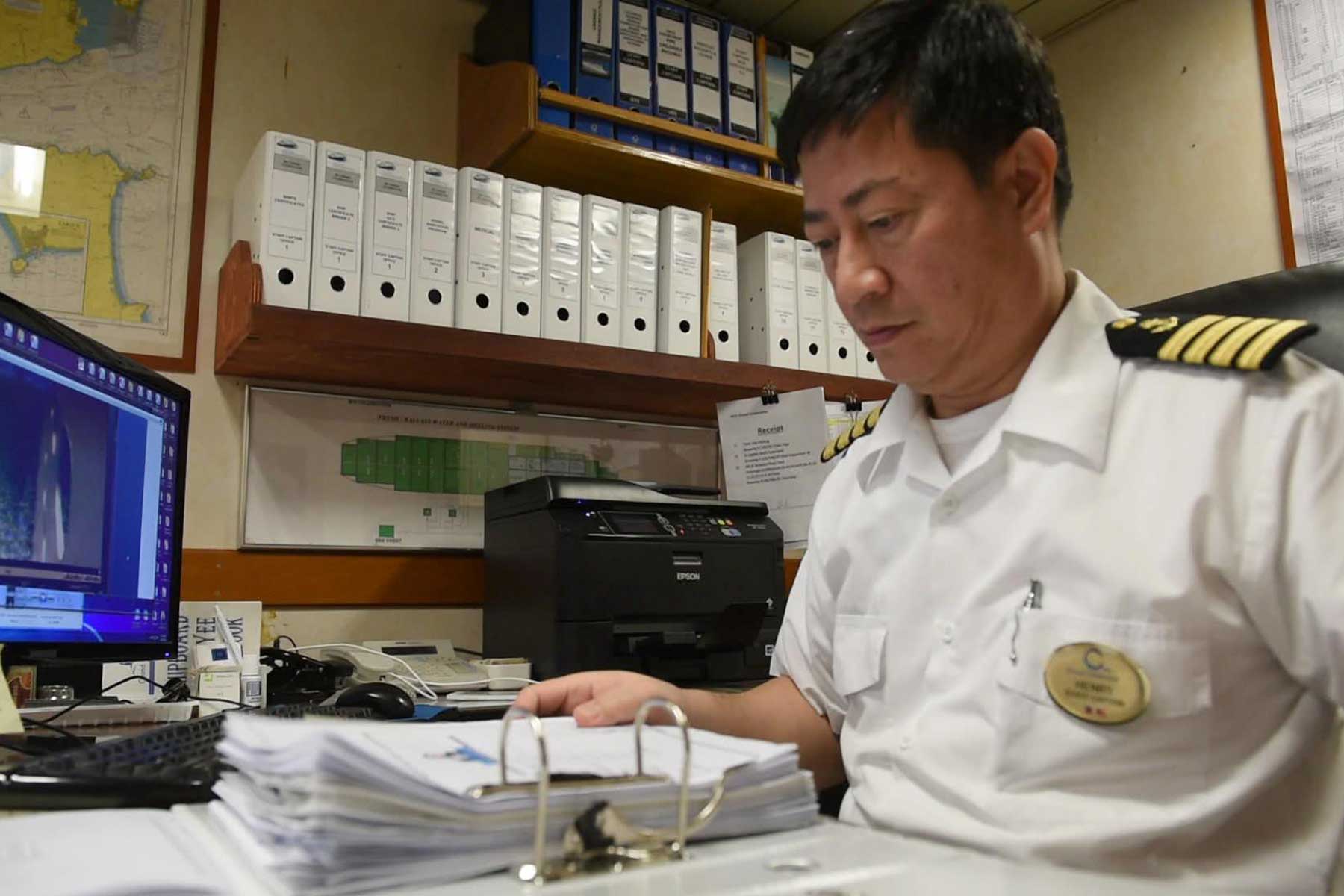
How Does it Work?

This curriculum complies with CVSSA training requirements for internet eLearning based training. A CVSSA certificate can be issued to a crewmember upon fulfillment of all of the requirements. The CVSSA prescribes security and safety requirements for any passenger vessel that is authorized to carry and has onboard sleeping facilities for at least 250 passengers, that is not engaged in a coastwise voyage, and that embarks or disembarks passengers in the United States. It provides new requirements for vessel design, public access to information about crime aboard cruise ships, provisions for emergency medical treatment, and crime prevention and criminal evidence gathering. In passing the CVSSA, Congress found that serious incidents, including sexual assault and the disappearance of passengers at sea, have occurred on cruise vessel voyages, that passengers lack adequate understanding of their vulnerability to crime on board cruise vessels, that inadequate resources are available to assist cruise vessel crime victims, and that detecting and investigating cruise vessel crimes is difficult. Among other things, CVSSA establishes minimum standards for the training and certification of vessel security personnel, crewmembers, and law enforcement officials in all aspects of prevention, detection, evidence preservation and reporting of criminal activities in international shipboard environment. CVSSA is a step in the right direction providing a proper level of training for the ship and vessel security, medical, and deck department personnel who will ultimately be held accountable for the proper and effective response to a crime scene. This curriculum must be administered by a CVSSA accredited training provider.
Target Audience
- Cruise Vessel Ship Security Officer
- Company Security Officer
- Port Facility Security Officer
- Cruise Ship Security Staff
- Cruise Ship Housekeeping Staff
- All cruise ship staff
- Law Enforcement
- Cruise ship administration staff
- Other Security Related Personnel
Mode of Delivery
This course is hosted online through Moxie Media's Learning Management System. The curriculum may be taken from any location with internet connectivity. The student registers with the training provider and the training provider enrolls the student for the courses the student must complete. The training provider will have administrative access to the hosting site to monitor the students' progress and completion.
Minimum computer requirements:
- Windows 7 or newer
- Microsoft Edge, Mozilla Firefox, Google Chrome (preferred)
- Email for course documents and training assistance
- Sound card with speakers or headphones
- Broadband internet connection
- Available on most Android and IOs devices
Outcome and Certification
Students who successfully complete this course and pass the final assessment will be issued a certificate.
Registration and Enrollment
Registration is simple and easy and only takes about 5 minutes. Click " Register Now " here or at the top of the page. After successfully filling out the registration form, uploading a copy of an accepted form of ID, and paying the course fee, your instructor will email you a welcome packet with instructions on getting started, as well as all required course documentation. The curriculum may be taken from any location with internet connectivity. The student registers with the training provider and the training provider enrolls the student for the courses the student must complete. The training provider will have administrative access to the hosting site to monitor the students' progress, completion, etc. Have questions? Call or email us at: 504-733-6907 or [email protected] .
Final Assessment
Upon successful completion of the 7 courses, exercises, and student survey, a student will be given a final exam for which they must pass with an 80% score. The student will have two attempts to pass this test. If the student fails they will have to register and pay for the course again. An accredited instructor is available to answer questions at any time. The student upon successful completion of the final test will be emailed a certificate.
Privacy Policy
Our trainees’ privacy is important to us. We collect personal information (such as name, email address, phone number, and personal I.D.) in order to verify identities, process orders, and properly set up LMS accounts and assign course documents. We do not share this information with outside parties except to the extent necessary to complete orders or set up and manage users on the Learning Management System. To prevent unauthorized access, maintain data accuracy, and ensure the correct use of information, we have put in place appropriate physical, electronic, and managerial procedures to safeguard and secure the information we collect online. Our online store is securely hosted and PCI (Payment Card Industry) compliant so the payment information entered during purchase of the training program is protected and kept safe.
Moxie Media, Inc. • 504.733.6907 • [email protected]
- PRO Courses Guides New Tech Help Pro Expert Videos About wikiHow Pro Upgrade Sign In
- EDIT Edit this Article
- EXPLORE Tech Help Pro About Us Random Article Quizzes Request a New Article Community Dashboard This Or That Game Popular Categories Arts and Entertainment Artwork Books Movies Computers and Electronics Computers Phone Skills Technology Hacks Health Men's Health Mental Health Women's Health Relationships Dating Love Relationship Issues Hobbies and Crafts Crafts Drawing Games Education & Communication Communication Skills Personal Development Studying Personal Care and Style Fashion Hair Care Personal Hygiene Youth Personal Care School Stuff Dating All Categories Arts and Entertainment Finance and Business Home and Garden Relationship Quizzes Cars & Other Vehicles Food and Entertaining Personal Care and Style Sports and Fitness Computers and Electronics Health Pets and Animals Travel Education & Communication Hobbies and Crafts Philosophy and Religion Work World Family Life Holidays and Traditions Relationships Youth
- Browse Articles
- Learn Something New
- Quizzes Hot
- This Or That Game New
- Train Your Brain
- Explore More
- Support wikiHow
- About wikiHow
- Log in / Sign up
- Occupations
- Transport Careers
How to Become a Cruise Ship Captain
Last Updated: July 10, 2023 Approved
wikiHow is a “wiki,” similar to Wikipedia, which means that many of our articles are co-written by multiple authors. To create this article, 16 people, some anonymous, worked to edit and improve it over time. There are 8 references cited in this article, which can be found at the bottom of the page. wikiHow marks an article as reader-approved once it receives enough positive feedback. In this case, 84% of readers who voted found the article helpful, earning it our reader-approved status. This article has been viewed 285,890 times. Learn more...
A cruise ship captain is the master of a cruise vessel. Captains usually have a college degree along with years of experience in shipping or naval navigation. They must be very experienced in analyzing speed, weather conditions and other factors that affect a ship's navigation, while controlling a staff of officers. The skills required of a captain include communication, customer service, delegation, and organization. The US Department of Labor Statistics expects the demand for ship captains to go up by 17 percent until 2016, but the competition for cruise ship captain positions will remain competitive. In fact, you may need to finish 4 to 8 years of schooling and obtain decades of experience to qualify. If your dream is to become a cruise ship captain, begin your preparations now and create a backup plan for alternate careers that use the same set of qualifications.
Receiving the Right Education

- In the United States, many aspiring captains attend a Maritime High School, which are generally located on the coasts or Great Lakes. Maritime High Schools are competitive in admissions and follow a particular curriculum established by the U.S. Maritime Administration, emphasizing English, math, and science with additional courses in maritime skills, law, and career training. Because this is such a competitive line of work, a diploma from a Maritime High School is highly recommended to increase your chances of becoming a cruise ship captain.

- The US Government recommends three units of math (algebra, geometry, and trigonometry); three units of English; one unit of physics or chemistry; and eight additional units in additional math and/or science, foreign languages, economics, and social studies.
- If possible, look for part-time work (during evenings, weekends, and summer breaks) in a shipyard or on board a ship or sea-going vessel of any kind. You will learn about ship parts, worker roles, chain of command, and ship repair, as well as gaining experience on the sea, which will help you to know for sure that a career as a captain is ideal for you. If you do not live near the sea or large lakes, try to find summer work on board a ship.

- A diploma and an above-average grade point average in high school are necessary for admission to a Maritime Academy, and even if you do not choose to attend an academy or college, you must have a high school equivalency to gain additional career experience at the helm of a ship.

- Attending a Maritime Academy is the fastest track to move up the ladder on a maritime vessel. Maritime Academies in the United States include California, the Great Lakes, Maine, Massachusetts, Texas A&M, and the U.S. Merchant Academy. These are funded by the United States Maritime Administration to ensure that the government has a steady stream of properly trained merchant marine officers. [1] X Research source
- In the event that you cannot find a position as a cruise ship captain (which is unfortunately a high chance, given how competitive the industry is), a diploma from one of these schools can help you find employment with the US government or as a merchant marine captain. If you are based in another country, seek naval education or experience, according to the best path in your region.
Obtaining Needed Experience and Certifications

- If possible, try to get an internship on a cruise ship. This will help you gain experience and determine that this is the right career choice for you. If you have the opportunity to do more than one internship while in college, try to get one on a cruise line and one on a commercial or government ship. This will help you to see the difference in these career paths.

- Although your career goal is captain, you have to start on the deck to gain needed experience. If you did not get a Bachelor's degree, you will have to spend thousands of hours -- and many years-- gaining experience as a deckhand before you can move up the ship hierarchy and become a deck officer or third mate, which qualifies you to take exams to become a captain. If you did get the Bachelor's degree, you can skip the deckhand stage altogether. [2] X Research source
- The exams test your knowledge and readiness and also entail a thorough background check, including a review of your criminal record and citizenship as well a physical exam and vision and hearing evaluations. There are fees associated with these credentials, ranging from $50 to $100 USD. [3] X Research source

- A Master's degree is not always necessary to get a position, but because cruise ship positions are highly sought after, it might make a difference in your job search. Many cruise ship captains do not have a Master's degree. You will have to decide if your experience is enough or if you could benefit from a Master's degree on your resume; for instance, if you did not attend a maritime high school or Marine Academy, and/or if you have not had many years of experience on a vessel, you may need the additional education to be a viable candidate for a position on a cruise ship. [4] X Research source

- Certification exams require physicals, vision tests, drug screenings and written and practical exams. Merchant marine academies train their students in the topics that will be featured on these exams. People who gain their qualifications through experience may need to take exam prep courses to ensure they pass the exams. There are fees associated with these credentials, ranging from $50 to $100 USD. [5] X Research source

- The marine captain's license also qualifies you for positions with the United States government, including the Coast Guard. [6] X Research source
Finding Work

- In the vast majority of cases, marine captains are promoted after serving as deck officer or third mate on that ship. The time until promotion varies by organization and company, as well as by your own performance in each position.

- For example, most officer positions for Norwegian Cruise Lines are given to Norwegian citizens. The exception is their ship Pride of America, which only hires American citizens. [7] X Research source You will need to check the website of cruise line companies to find out their hiring requirements for particular job openings.

- Continue working as a merchant marine captain. According to the US Bureau of Labor Statistics, jobs in this industry are growing with an expected rate of 14% growth between now and 2022, outpacing the number of new captains available, so the odds of finding a position in a freight ship are much higher than the odds of finding a position as a cruise ship captain. [8] X Research source
- Consider joining the U.S. Armed Forces or working for the U.S. government. Particularly if you attended a State Maritime Academy, the United States seeks capable and well trained captains who can meet its national security needs. [9] X Research source
Community Q&A
Things You'll Need
- High school diploma/GED certificate
- Merchant marine degree
- Deck hand experience
- Rating exam prep course
- Transportation Worker Identification Credential
- Merchant Mariner Credential
- Marine captain's license
- Marine captain experience
You Might Also Like

- ↑ https://www.marad.dot.gov/education/maritime-academies/
- ↑ http://www.allaboutcruisesandmore.com/how-to-become-a-cruise-ship-captain
- ↑ http://www.ecfr.gov/cgi-bin/text-idx?c=ecfr&sid=ae63e8c8b8556b036cfde87e4a7bb8de&rgn=div5&view=text&node=46:1.0.1.2.10&idno=46
- ↑ http://study.com/articles/Ship_Captain_Job_Duties_and_Information_About_Becoming_a_Ship_Captain.html
- ↑ http://study.com/become_a_ship_captain.html
- ↑ https://www.ncl.com/about/careers/shipboard-employment/faq
- ↑ http://study.com/articles/Become_a_Boat_Captain_Step-by-Step_Career_Guide.html
About This Article
To become a cruise ship captain, start by focusing on getting good grades in math, English, and science courses in high school so you’ll be eligible to attend a Maritime Academy after you graduate. While you’re still in school, try to find a job in a shipyard or on board a ship to learn the ins and outs of being at sea. Then, while you’re attending a university, apply for an internship to get practical experience and make connections. After graduation, look for a job as a third mate or deck officer on a ship to develop the qualifications you’ll need as a captain. To learn how to qualify for the marine captain’s licensing exam, keep reading. Did this summary help you? Yes No
- Send fan mail to authors
Reader Success Stories
Susan Altadonna
Oct 12, 2016
Did this article help you?

Conor Russell
Apr 12, 2018
Dalia Rivera
May 17, 2017
Ajay Aloshious
Jun 13, 2017
May 31, 2017

Featured Articles

Trending Articles

Watch Articles

- Terms of Use
- Privacy Policy
- Do Not Sell or Share My Info
- Not Selling Info
wikiHow Tech Help Pro:
Develop the tech skills you need for work and life
- Maritime Skills Training
- Maritime English Testing
- STCW ISPS Training
- Port Security Training
- Personal Security Training
- Close Protection Training
- Client Management Systems
- Support Packages
- Affiliate Services
- Course Build Services
- Latest News
- Latest Videos
- Testimonials
STCW Ship Security Officer (SSO) Course for Cruise Ships
- Categories:
Course Introduction
Course features.
- 100% Online Course & Assessments
- Maritime & Coastguard Agency (MCA) Approved
- Fully STCW ISPS Recognised Course
- Fully Compliant with IMO Model 3.19
- This Course is IMO Whitelisted
- No Expiry on the Official Course Certificate
- Comprehensive Set of Course Notes to Keep
- Learning Confirmation Exercises Throughout
- Interactive Learning Materials
- Rapid Turnaround on Course Certification
- Flexible Learning at Your Own Pace
- Course Tailored for this Specific Sector
- Take Online or Offline (See Brochure)

- Certifications
Vessel-Tailored Ship Security Officer Course
This Ship Security Officer (SSO) Course has been tailored specifically for potential SSO’s who work on board Passenger Ships and Cruise Ships . We also provide the following tailored versions of the Ship Security Officer Course for the following sectors, so if you are on one of these types of vessels, it is better you select it from the links provided below:
- Superyacht, Motor Yacht & Mega Yacht Potential SSO
- Commercial Cargo, Mobile Offshore Platforms and Ferry Potential SSO
About This Course
The fully online, UK DfT Maritime & Coastguard Agency (STCW ISPS) Proficiency as Ship Security Officer (SSO) Course, is a mandatory training requirement under STCW ISPS for members of a Cruise Ship’s Crew intending to act as a Ship Security Officer. The SSO is responsible for the security measures implemented on board, in accordance with the Ship Security Plan (SSP) and the ISPS Code. Amongst many other responsibilities, the SSO is responsible for the implementation of the security measures that are laid out within the Ship Security Plan at all times the Cruise Ship is underway, or in Port. As well as the ongoing maintenance of the Ship Security Plan, the SSO must ensure that all Cruise Ship crew members and staff, especially those tasked with Designated Security Duties, fulfil their obligations towards the security integrity of the ship. The course will provide the Learner with the information required to complete the required instruction under STCW, the MNTB KUPs, IMO Model Course 3.19, and the Maritime & Coastguard Agency (MCA). For information on the course Awarding Body and Certification, please view the Certifications Tab.
Course Learning Outcomes
- Understand the importance of ship security and the roles and responsibilities of organisations and individuals involved in it
- Know how to assess security risk, threat and vulnerability to the ship, its personnel, cargo, and operations
- Understand the capabilities and limitations of security methods, equipment, and systems
- Know how to implement a ship security plan and related regulatory requirements
- Know how to determine the effectiveness of current security arrangements, procedures, and equipment
- Understand how to promote security awareness and vigilance on board ship
Regulations Addressed
- MNTB Security Courses Criteria (2nd Edition)
- Regulation VI/5 of the STCW Convention and Code (2010)
- IMO Model Course 3.19 (2012 Edition)
- Chapter XI-2 of the annex to the International Convention for the Safety of Life at Sea (SOLAS) Convention (as amended)
- The International Ship & Port Security (ISPS) Code as amended (STCW Table A-VI/5)
Pre-Requisites
Under the mandatory requirement of the UK Department for Transport, Maritime & Coastguard Agency (MCA), learners wishing to undertake the course must be able to demonstrate 12 months sea service, or as at the discretion of the MCA, appropriate sea service (minimum of 3 months) and knowledge of ships operations to enable them to achieve the objectives of the training provided. By taking this course, you are stating that you do possess the relevant requirements and meet with the relevant pre-requisites.
Course Brochure
For the full Proficiency as Ship Security Officer course description and details, download the course brochure here or from the button at the top of the page.
- The Development of the International Ship and Port Facility Security Code.
- Understand the roles and responsibilities of relevant bodies and organisations.
- The roles and responsibilities of Contracting Governments, Designated Authorities, and Recognised Security Organisations.
- The Security Roles & Responsibilities of Crew and Port Security Personnel.
- Measures and Procedures for Maritime Security [MARSEC] Levels.
- Recognition of weapons, dangerous substances, and devices.
- Recognition of persons who may pose a threat to the security of the ship.
- Identifying techniques used to circumvent security measures.
- The handling of Sensitive Security-Related Information [SSRI] and Communications.
- Identifying security threats including Maritime Piracy & Armed Robbery against Shipping.
- Declarations of Security [DoS].
- The On-Scene Security Survey.
- The Ship Security Assessment [SSA].
- The Ship Security Plan [SSP].
- The provisions for maintaining security.
- Criteria for setting Maritime Security [MARSEC] levels under the ISPS Code.
- Actions to prevent weapons, dangerous substances and devices being brought on board.
- Guidance and measure for Anti-Piracy and Anti-Armed Robbery.
- Responses to Emergency Situations including Maritime Piracy & Armed Robbery against Shipping.
- Physical Searches & Non-Intrusive Inspections.
- Crowd Management & Control Requirements.
- Crew Training, Emergency Drills & Exercises.
- European Commission [DG MOVE] and European Maritime Safety Agency.
- Port and Flag States.
- UK DfT Maritime Security and the Maritime and Coastguard Agency (MCA).
- Recognised Security Organisations and limitations in their use.
- The Shipping Company.
- Masters Authority and Discretion for Ship Safety and Security.
- Authority of the Duly Authorised Officer [DAO].
- The legal implications for seafarers and security personnel.
- The requirement for the provision of the ship identification number [SIN], Automatic Identification System [AIS], Ship Security Alert System [SSAS] and Long-Range Identification and Tracking [LRIT].
- The purpose and control of the continuous synopsis record [CSR].
- The purpose and use of the Long-Range Identification and Tracking [LRIT].
Official MCA Approved (STCW ISPS) Proficiency as Ship Security Officer Certification
Security encrypted pdf certificate.
Upon successful completion of the online course, verification of Learner ID, and associated official Assessment, Learners will receive an electronic security-encrypted version of your official course certificate (in secure PDF format). Certificates are usually emailed to the Learner within 24 to 48 hours of confirmation of the course results, or the next working day if the course is successfully completed on a Friday.
Awarding Body
The Proficiency Ship Security Officer (SSO) Course is fully Approved by the UK DfT Maritime & Coastguard Agency (MCA) and is internationally recognised and accepted. It includes the 2010 Manila Amendments and meets the requirements of Section A-VI/5, paragraphs 1 to 4 of the STCW Convention and Code and taking into account the guidance given in Section B-VI/5 of the Code, and Table A-VI/5.
Hardcopy, Embossed Stamped Certificate
Learners may also request an embossed stamped, hardcopy certificate to be posted to their home address. This is a free-of charge service for SSO Candidates. Please note that VIRSEC is not responsible for any loss or delay of the certificate once it has been dispatched to Royal Mail. Should a Carrier Service be requested, then the relevant charges will be applied, and all payments must be made before the certificate is posted.
Certification Renewal
Under the Awarding Body (Maritime & Coastguard Agency), there are currently no expiry dates placed on the (STCW ISPS) Proficiency as Ship Security Officer course certificates. Learners do not currently have to undertake a refresher or re-certification of this course unless directed to do so by the company they are working for.
Expedited Course Certificate Service
Should a Learner require the certificate to be expedited, either after office hours, at weekends, during holidays, or other means, a surcharge of £49.95 GBP (+VAT) will be charged and sent by Secure Payment Link. Please note that all payments must be made before the certificate is sent.
Yes, the fully online Proficiency as Ship Security Officer (SSO) Course, also referred to as Vessel Security Officer (VSO) is fully Approved under the UK Department for Transport, Maritime & Coastguard Agency (MCA). The course complies with the requirements placed upon it by the STCW Convention & Code, the International Ship & Port Facility Security (ISPS) Code, and meets with the Knowledge, Understanding & Proficiency (KUP) requirements laid out by the Merchant Navy Training Board (MNTB).
Yes, this course is fully compliant with the Standards of Training, Certification & Watchkeeping (STCW). Any country that is signed up to the ISPS Code and STCW Convention should accept our certification. We have to date provided our courses into 130 countries worldwide.
All our courses have a six (6) month access licence applied to them. This licence commences the day the course is purchased, and not from the day you first access the course.
No, VIRSEC provides you with a comprehensive set of Course Notes that you can download at the start of each of the Learning Outcomes. You can also use these notes to research any answers when taking the Official Assessment at the end of the course.
On the Proficiency as Ship Security Officer (SSO) Course, there is an Assessment on completion of the six Learning Outcomes. You must achieve a minimum score of 70% to successfully complete the Assessment.
If you fail the Assessment, you may retake it again straight away, or whenever you wish within the 6-month licence applicable to your course [licences commence the day the course is purchased, not the date they are accessed].
No, the course is 100% online and you are required to adhere to the strict requirements outlined in the course explanation as well as any requests made of you during the course such as completing and submitting your online Learner Verification.
Yes, you are required to submit an official form of ID such as a scan of your passport, driving licence, or other official photo ID. This is to ensure you are who you state yourself to be, and so we can use this ID to collect the relevant information that will populate your official course certificate. It is very easy to do and will only take you around five (5) minutes to do.
Yes, for the Ship Security Officer there is a requirement for an invigilator to be present during your Assessment only. This can be the Master, Ship Security officer or other Officer ranked member of the crew. They will be required to complete the Online Invigilator Verification Form on our website [also linked from the course itself]. They must complete this form and be present at your Assessment. If you do not have access to an invigilator, please see the following question.
If you do not have access to an Invigilator, you must inform VIRSEC, and we will arrange for you to attend an online Remote Invigilation Session. This is currently a free of charge service we offer our learners, but you must make yourself available for the relevant session. You can arrange a Remote Invigilation Session by completing the online form accessed from the menu on the VIRSEC website under Online Forms. Please note that failing to attend an arranged Remote Invigilation Session may result in a charge for any subsequent requests.
When you complete the course correctly and pass the Official Assessment, we will verify your time spent on the course, your submitted ID, and your Official Assessment. Once we are satisfied, we will email you a secure, encrypted PDF of your certificate that you must print off and sign. These PDFs are security encrypted to prevent any tampering with information placed on them, and so you must print them off to sign with as black pen.
Yes, under the relevant Agencies and Conventions, the Security Awareness is an 21-hour course. This excludes any video content we have included [for interest], viewing of any websites linked from the course or documents also linked from the course.
We are allowed a slight variation in timings due to individual reading speeds, but we will fail you if you exceed the allowed variance. Please note that the Course Notes are purely there for reference and revision, and any time spent reading these do not count towards your time spent on the course. This is also covered in the course itself, so make sure you spend the time necessary to study properly.
You can take a break from the course at any time of your choosing. We also recommend that you have regular breaks and often build reminders into our courses. It is strongly recommended that if you are going to take a significant break, we recommend that you log out. The system will remember your progress so you may continue from that point when you log back in.
If you complete the course in an unrealistic time (too quickly) we will have no alternative but to fail you. It is important that you treat this like you would any officially Approved course taught in a classroom environment. The fact that it is online is not reason to abuse the requirements. As stated in other FAQs, we do allow a slight variance in timings due to individual reading speeds.
No, we do not take into consideration your time served, nor your rank. This is an ISPS Course, and there is an acceptable minimum time set by the relevant Awarding Body and Governing Bodies. If you abuse this, or do not meet with any of these requirements, you will fail the course regardless of the score achieved in the Assessment(s). You will be required to re-take the course and associated assessments.
VIRSEC are not responsible for you leaving your course until the last minute, and you run the risk of not receiving your certificate in the time needed. Certificates take up to 48 hours during the working week to turn around, and should this fall over a weekend, you may not receive the certificate until the next working day [holidays excluded]. If you require your certificate to be expedited, you may request this from VIRSEC, but we are under absolutely no obligation to do this and there will be an additional charge applied.
Learners are able to purchase courses and take them 365 days a year, 24 hours a day as we are an online company, with access to both our e-Commerce website and Learning Management System [LMS]. However, the company is open during the hours listed on its website [0900 to 1700 hrs GMT/BST Monday to Thursday, 0900 to 1500 hrs Friday, Closed Saturday & Sunday and Bank Holidays]. Support requests may be made but will be managed during these listed office hours.
VIRSEC do have a Chat Facility on their website and you may make a request for support. However, this is only manned during the hours listed on its website [0900 to 1700 hrs GMT/BST Monday to Thursday, 0900 to 1500 hrs Friday, Closed Saturday & Sunday and Bank Holidays]. Responses to comments or enquiries may take up to 24 hours, or until the next working day as detailed.
SSO TESTIMONIAL REFERENCE BY: Dean B (Royal Navy)
VIRSEC's Online (STCW ISPS) Proficiency as Ship Security Officer course exceeded my expectations in every aspect. The user-friendly platform allowed for effortless navigation, providing flexibility in learning at my own pace. Communication from Virsec was outstanding, with a support team promptly addressing queries, fostering a reliable and trusting learning environment. The course content was not only comprehensive but also highly relevant, presented in a clear and digestible manner. Real-world scenarios and practical assessments enhanced its applicability. The well-balanced pacing ensured a thorough understanding without overwhelming the learner. VIRSEC's commitment to a holistic learning experience, combining theoretical knowledge with practical skills, sets it apart. I wholeheartedly recommend this course for its accessibility, excellent communication, and thoughtfully crafted content. It's a standout choice for maritime security education, providing an enriching and rewarding experience.
SSO Testimonial Reference by: Hamish B.
Very good course. Very thorough and really expanded my knowledge. Extremely helpful to have this course online. Thank you.
SSO Testimonial Reference by: Paul T.
Brilliant course and structure with variations in learning material. The combination of videos and running assessments through each module help to keep the focus and information retention. Will thoroughly recommend this course to other crew in the future.
SSO Testimonial Reference by: Gary H.
I was originally booked in to complete the Proficiency as a Ship Security Officer course, with a different provider, in a class based environment. Due to the Covid-19 Lock Down the original course was cancelled and I found VIRSEC. The International Cruise Company I work for confirmed that VIRSEC met all the requirements to provide this course to MCA Standards. I found this course to be extremely easy to work through, with well set out objectives and knowledge modules. Exams are completed at the end of each learning module with questions relating to that module. This makes the whole learning and testing process very effective. In addition at the end of each objective there is additional reference material simply set out and easy to find in a reference slide. Throughout the process the team at VIRSEC have been available and they have quickly responded to any questions. Overall I have found the course provided to be excellent and I would fully recommend it.
SSO Testimonial Reference by: Peter H.
Excellent course. The software worked really well with no technical issues at all. The ability to stop/start the course made it very manageable to complete the course without stress or urgency. Taking away travel time and accommodation costs of having to go to a college made the experience even more worthwhile.
SSO Testimonial Reference by: Duncan M.
The VIRSEC ISPS SSO is a thorough and comprehensive online course which fits the requirements of MCA training. I was surprised by the depth and clarity of the content within the course. It has opened my eyes to the possibilities of online course programmes.
SSO Testimonial Reference by: Mike S.
This course was fantastically laid out with great resources on a super platform. It was easy to navigate, understand and learn and would use this company again for other short courses.
SSO Testimonial Reference by: Moctar F.
I couldn’t ask for more about this course. It provided me with the right knowledge. I am now more than confident to perform my duty as a security officer.
SSO Testimonial Reference by: Fraser R.
The online SSO course is a brilliant way to gain your SSO cert. I didn’t have to travel away from my home on my leave and sit listening to a man with a PowerPoint clicker for the best part of a week. You can do it at your own pace, at your own desk with a nice cup of tea in between modules. The video sections and reading material are very specific. The download links and hyperlink “keep for reference” reminders, I am sure will come in handy in the future.
SSO Testimonial Reference by: Thomas M.
Overall the course was extremely helpful in outlining the regulatory, legal, and practical elements of the SSO role. The course information at times containing multiple dates, names, regulations, sub parts was slightly overwhelming but then expected in an online course when there is so much to take in. I did however enjoy the course overall and found the interface easy to use. Also the staff (Liv) was very helpful and quick to respond to any queries I had. Thank you.
SSO Testimonial Reference by: Lewis M-A.
A lot of great stuff in here and accompanied by all the relevant documents and where to find other supporting information. Even better that it is available to download to keep as reference material later after the course. My only criticism is the amount of information for me is potentially too much and can be overwhelming to see it all in lengthy slides. I am glad I have the reference material though to keep me in check later down the line. Thank you.
Related Courses
VIRSEC are dedicated to delivering only the very highest standard of cost-effective, flexible, online training to our customers.

STCW Security Awareness (PSA) Course

STCW Designated Security Duties (PDSD) Course

STCW Ship Security Officer (SSO) Course

STCW Security Awareness (PSA) Course for Superyachts

Lithium-Ion Battery Safety Awareness for Superyachts

Anti-Kidnap & Hostage-Taking Awareness Training For Mexico

Security Awareness for Young People Travelling Overseas

Maritime English Test for Cruise Ship Staff
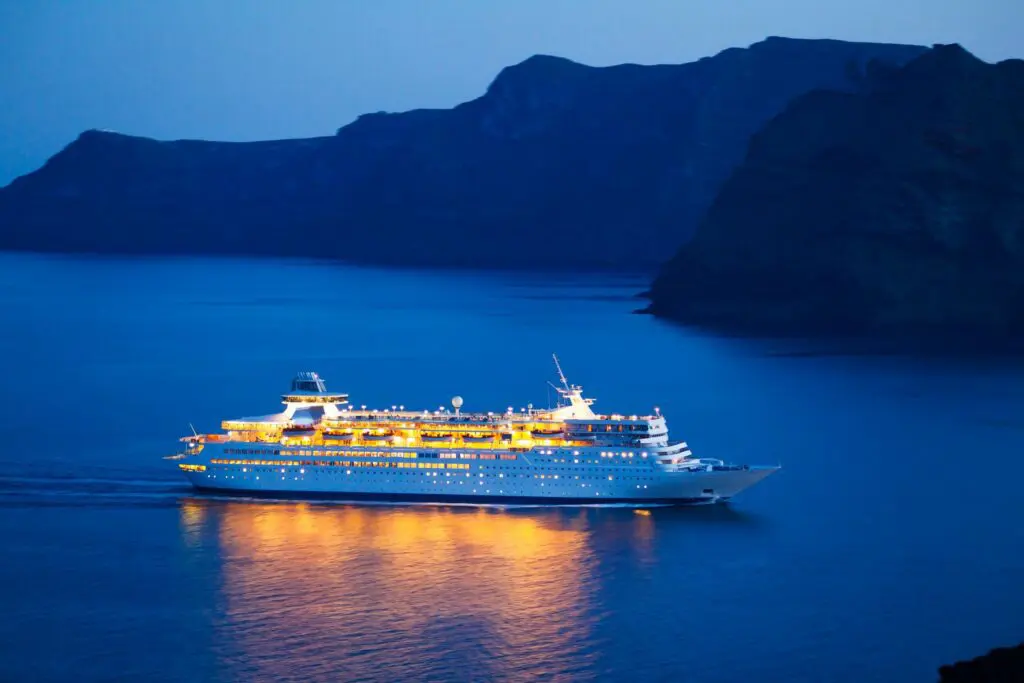
Cruise Academy
Promote your career.
Get certified!
Cruise Courses
Security awareness for cruise ships.
Mandatory for all crewmembers of cruise ships – Panama accepted
Security Awareness – NL/EU
Mandatory for all seafarers – MCA (UK) accepted
Crowd Management
For seafarers who deal with passengers on board
Crisis Management and Human Behavior
For officers and crew responsible for the safety of passengers
Designated Security Duties
Mandatory for seafarers who have designated security duties – Panama accepted
Food Safety and Hygiene for Galley Staff
For galley staff and food handlers on board ships – HACCP compliant
Are you looking to progress your career working on cruise ships?
Embark on a voyage to career growth in the cruise ship industry through our specialized online courses. Tailored to cater to the unique demands of cruise operations, our courses offer a transformative learning experience that equips you with essential skills and insights to excel in this dynamic sector. Embracing the flexibility of online learning, you can enhance your expertise at your own pace, seamlessly integrating education with your busy cruise ship schedule. Whether you’re a seasoned cruise professional aiming to enhance your skills or a passionate newcomer eager to embark on your maritime journey, our courses provide the compass to steer you towards success. Invest in your professional odyssey and set sail for excellence with our industry-leading online cruise ship courses.
How it works
Go digital and save time. Simply sign up and you can start the course immediately.
2. Take the course
You will need a PC, laptop, tablet or smartphone (iOS or Android). You can take the course online or download the course.
3. Assessment
The Assessment consists of multiple-choice questions. Upon successful completion of the assesment you will receive your certificate.
4. Certificate
You will receive a download link for your certificate. You are free to (re)print your certificate anytime. A signed and stamped original hard-copy by mail can be ordered.
About STCW.online

Emergency Control Maritime Training BV (dba STCW.online) is a Rotterdam based maritime training institute. Several of our STCW courses are approved by The Netherlands (EU) Shipping Authorities under ID: NL45 or LISCR, the Liberian register. ISO 9001:2015 certified. STCW.online is a trade name.
The STCW online courses are in compliance with the STCW Regulations of the IMO .
Cruise Job Directory
Directory of Cruise Ship Job Information
How to Apply as a Cruise Ship Deck Officer

Deck Officers (aka: Navigation Officers) maintain watches on the bridge while the ship is at sea and in port. Some of their responsibilities include passage planning, safe navigation of the ship, crew safety training, ship stability, and maintenance of deck and safety equipment.
The career path of a Deck Officer starts as a Deck Cadet. Through continuous education and sea time a Deck Officer may rise through the ranks from Cadet to Third Officer to Second Officer and then to First Officer. Many cruise lines split the duties of a First Officer into two positions, Navigator and Safety Officer with the First Officer in charge of safety as the more senior of the two. The pinnacle of a Deck Officer’s career is to eventually be promoted to Staff Captain and then to Captain.
When applying for a cruise ship job as a Deck Officer, depending on the rank will dictate how much training and experience is required. Deck Officer’s licenses and certificates must be in compliance with all international conventions and regulations as required by STCW95. Here are a list of the major cruise lines and details on how to apply as a Deck Officer.
Carnival Cruise Lines – Carnival Cruise Lines recruits most of their officers through their approved network of employment agencies, also known as manning agencies. These agencies help locate, screen and interview potential crew members on Carnival’s behalf.
Celebrity Cruises – Celebrity Cruises lists their current “Job Openings” on their employment website and qualified candidates are encouraged to apply online. If you don’t see a job posting for a position that matches your qualifications, check with your nearest hiring partner. Celebrity has a network of hiring partners to assist in meeting recruitment goals around the world.
Crystal Cruises – For shipboard contracts as a Deck Officer with Crystal Cruises , visit the International Cruise Management Agency (ICMA) website and apply online. ICMA is an authorized recruitment partner for Crystal Cruises. They are the only partner that is authorized to process applications for Deck Officers.
Cunard Line – Visit the Carnival UK Careers website for more information about applying for a cruise ship job as a Deck Officer with Cunard Line . Applicants may view current vacancies and apply online as well as register their personal details with the Carnival UK database for job alerts. They also offer a cadet program for eligible UK residents.
Disney Cruise Line – To apply for a cruise ship job with Disney Cruise Line as a Marine and Technical Operations Deck Officer, visit the Disney Parks and Resorts careers website where candidates may apply online.
Holland America Line – Candidates desiring employment as a Nautical Officer in the Deck Department on board Holland America Line should visit their employment pages for more information. Viking Recruitment also manages over 300 of Holland America’s officers.
Norwegian Cruise Line – To apply to Norwegian Cruise Line as a Deck Officer, visit Norwegian’s employment pages. Norwegian’s website features current shipboard positions available. Applicants may attach their resume in an email along with a cover letter to be considered for a personal or webcam interview. Additionally, Norwegian Cruise Line has recruiting agents throughout the world. If you are from one of the countries that they list on their website, submit your resume to the hiring partner.
Oceania Cruises – To apply for a cruise ship job as a Deck Officer with Oceania Cruises , visit the employment pages of their website. At the bottom right hand side of their website, click on the ‘Ship Position’ tab for a list of current job openings. Next click on the job title you want to apply for. Applicants may apply through Oceania’s online application form.
P&O Cruises – Visit the Carnival UK Careers website for more information about applying for a cruise ship job as a Deck Officer with P&O Cruises . Applicants may view current vacancies and apply online as well as register their personal details with the Carnival UK database for job alerts. They also offer a cadet program for eligible UK residents.
Princess Cruises – Princess Cruises cooperates with a world-wide network of Recruiting Agencies. Contact the recruitment agency that is closest to your permanent residence. Candidates located in the United Kingdom and interested in employment in the Deck and Technical departments may submit resumes directly to the Princess Cruises Recruitment department in Southampton. Princess Cruises also offers cadetships to eligible candidates.
Regent Seven Seas Cruises – To apply, visit the Regent Seven Seas Cruises employment pages of their website. Select the option “Ship” for a list of job vacancies. Applicants may apply online for their selected choice.
Royal Caribbean – Royal Caribbean International lists their current “Job Openings” on their employment website and qualified candidates are encouraged to apply online. If you don’t see a job posting for a position that matches your qualifications, check with your nearest hiring partner. Royal Caribbean has a network of hiring partners to assist in meeting recruitment goals around the world.

FinanceBuzz
16 Things You Must Do Every Time You Board a Cruise Ship
Posted: December 31, 2023 | Last updated: April 7, 2024
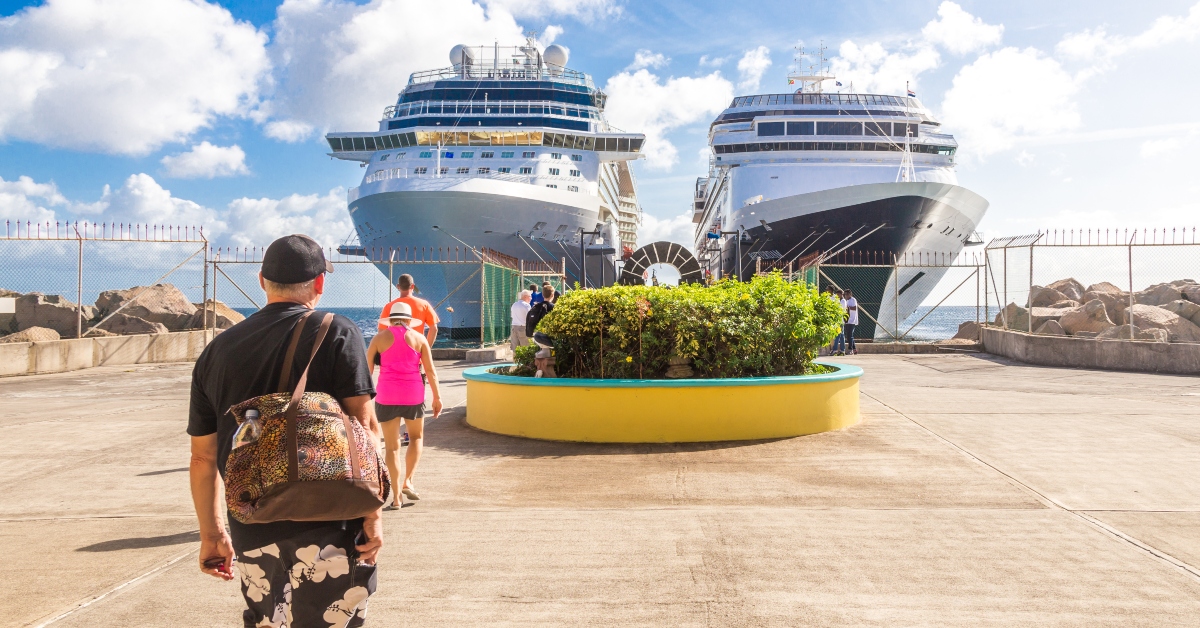
Planning for a cruise can be a year-long event. By the time you've booked your journey with one of the top travel credit cards and boarding day arrives you might not know what to do first.
Should you visit the buffet? Get situated in your cabin? Plunge into the pool?
Start your ocean journey on the right foot by following our checklist of 16 things to do as soon as you board your cruise ship.
Earn Points and Miles: Find the best travel credit card for nearly free travel

Pack a carry-on bag
Tackle the first important step before you board your cruise ship and pack a carry-on bag full of essentials you need to access during your first day on board the night before you leave.
Include a swimsuit, change of clothes, essential medications, a toothbrush, and any activities to keep you occupied during lulls in the action.
Get expert advice on making more money - sent straight to your inbox.
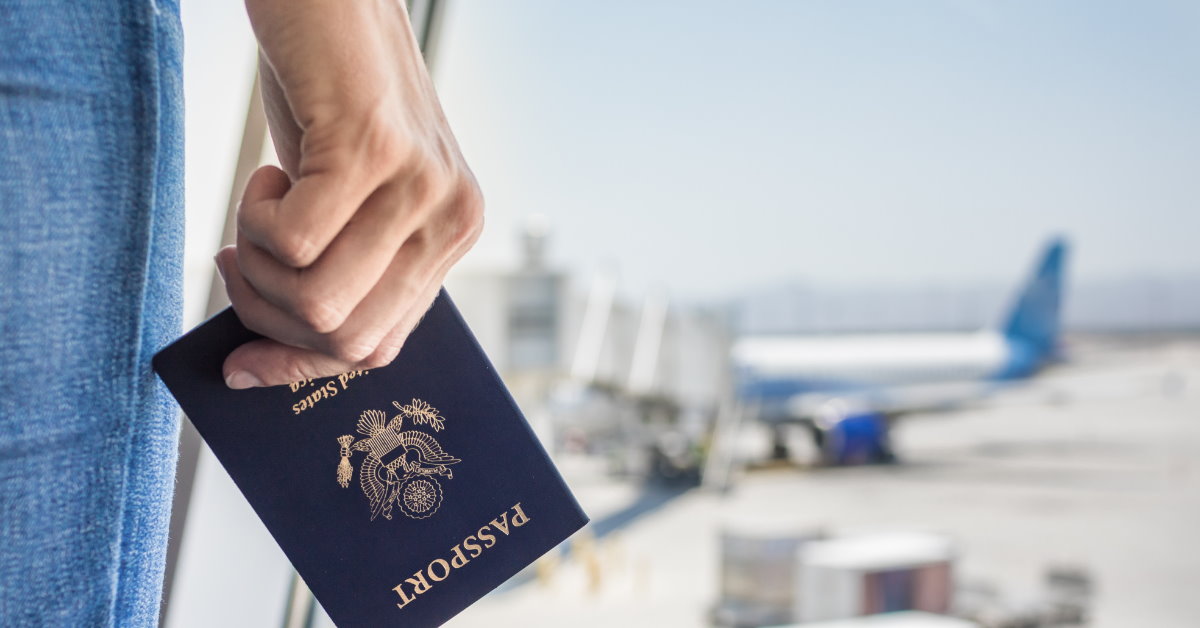
Verify that travel documents are in order
You’ll need to present identification to board your cruise ship. As you’re putting together your carry-on bag, double-check your driver’s license and passport if needed.
These things should be secure within your carry-on but easy to access quickly.

Check out the schedule on the cruise app
Most major cruise lines have mobile apps you can access throughout your trip.
While you’re waiting to board, scroll through the first day’s schedule as listed on the app to find out:
- Where you can find lunch
- What time the muster drill will be at
- How to access your cabin
- Whether any special events are planned for the evening
Grow Your $$: 11 brilliant ways to build wealth after 40

Find your cabin
Once you’ve safely boarded the ship, make your way to your cabin and start to get situated.
Your bags might not be waiting for you yet, but you should be able to access the room. Have a look around and report any concerns to the staff ASAP.
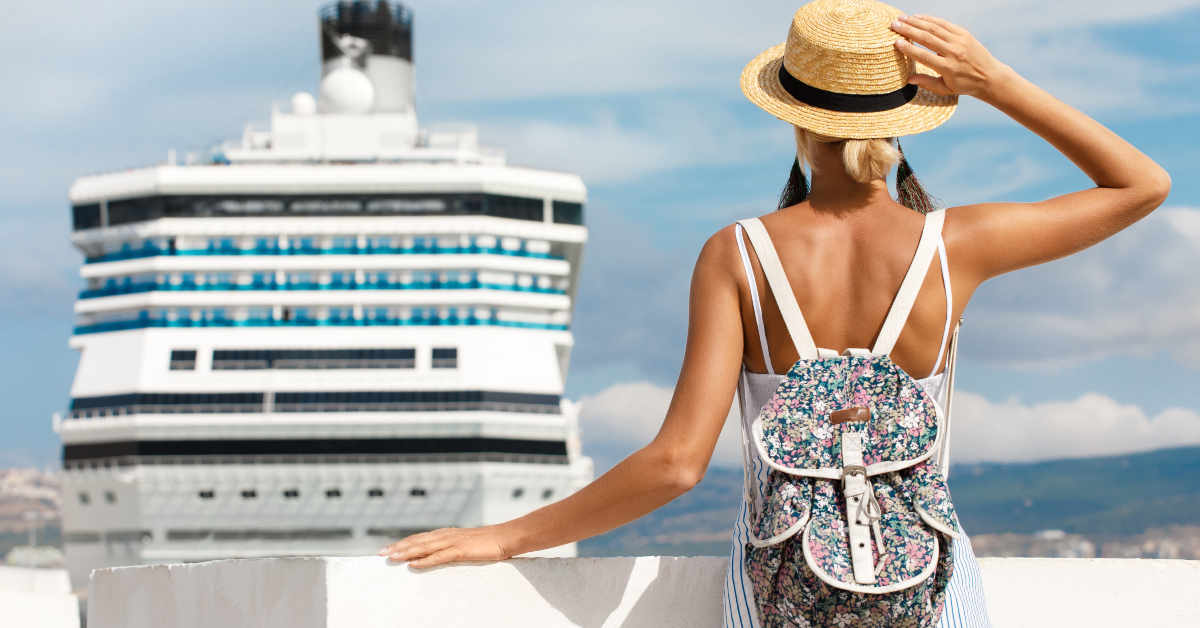
Unpack your carry-on
Get ahead of the tedious task of unpacking by sorting through whatever you brought in your carry-on bag.
You’ll have plenty more to organize once your bags arrive, so you might as well give your future self a helping hand by unpacking what you can now instead of adding to any chaos later.
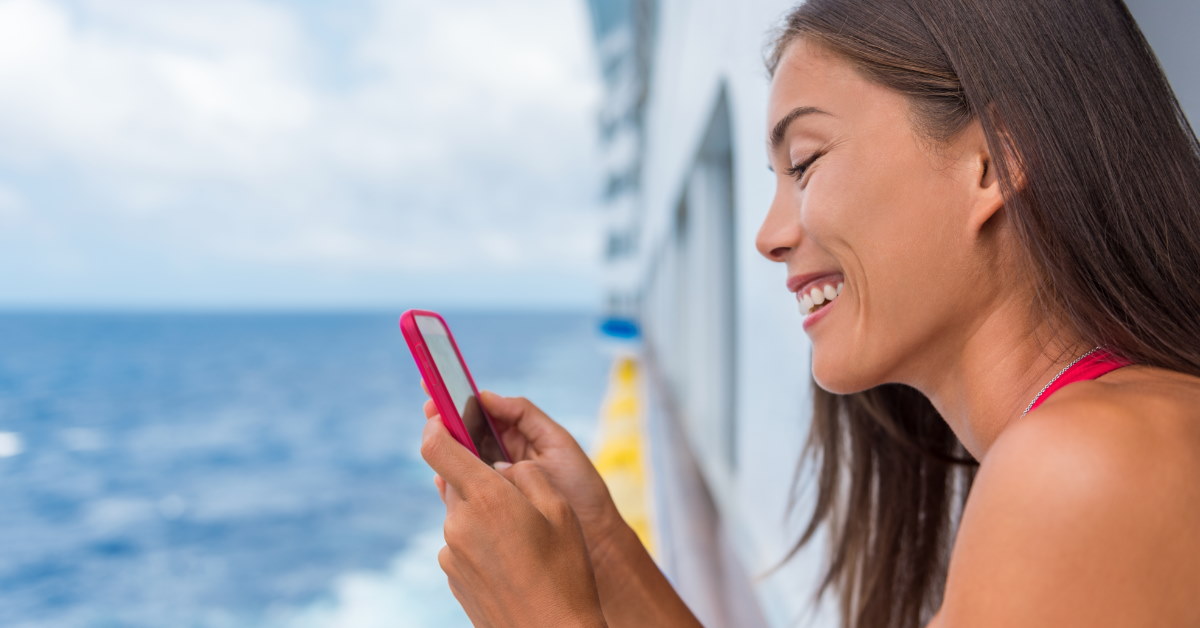
Find out if the internet works
If you purchased an internet package for your journey, take the time to log into the system and figure out how well it works.
If you didn’t buy a Wi-Fi package ahead of time but find that you can’t live without it, now is your chance to sign up.
Retire Sooner: Take this quiz to see if you can retire early

Set your phone to airplane mode
You might still have some phone service before you embark, but it’s bound to get spotty as soon as you leave the port.
Forgetting to turn on airplane mode can mean racking up roaming charges without even noticing you’re doing so. Set your phone to airplane mode now instead of leaving it until later.
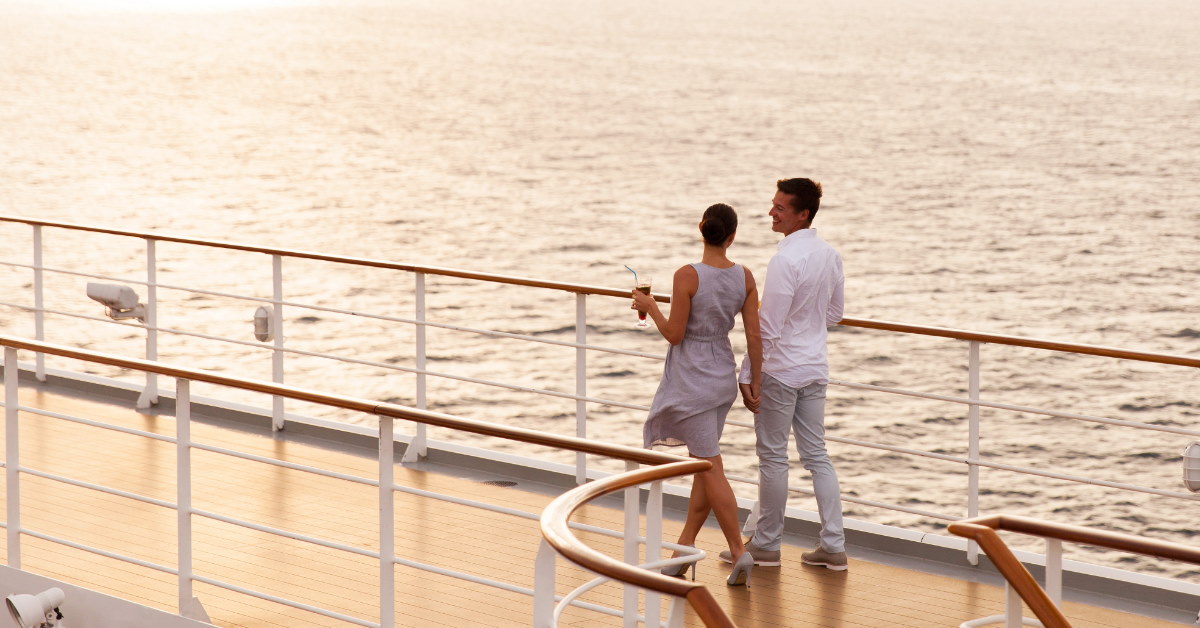
Dress for the day’s events
If you were waiting until you checked in to change into your swimsuit and gear up for a fun first day of hanging around the pool, now’s your chance.
You’ve made it on board, so feel free to slip into something a bit more comfortable.

Apply sunscreen
Hoping to spend at least some of your first day exploring your cruise ship’s decks? No one wants to kick off their vacation with a sunburn.
Get ahead of the sun by applying sunscreen before you leave your cabin for the first time.
9 nearly secret things to do if you fly Southwest

Take anti-nausea medication
Cruise ships are large enough that you likely won’t feel any dramatic rocking as you sail unless you encounter a storm. Still, people who tend to get motion sick on dry land can get seasick on cruise ships.
If you’re one of those people, don’t forget to take anti-nausea medication so you can explore the ship without getting too dizzy.
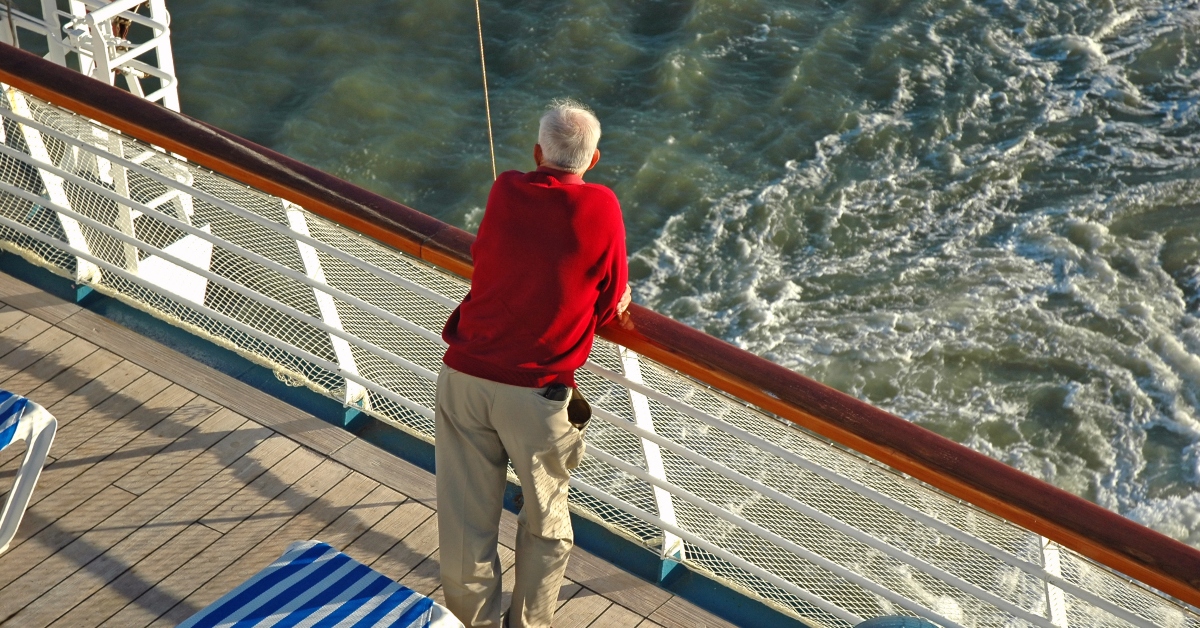
Attend the mandatory muster drill
Cruise lines provide passengers with comprehensive safety training before the ship embarks on its journey.
All passengers are required to attend the safety training — called a muster drill — and wear their life jackets for the duration of the drill.
You can expect the muster drill to happen 30 to 90 minutes before embarking, but check your ship’s schedule for exact details.
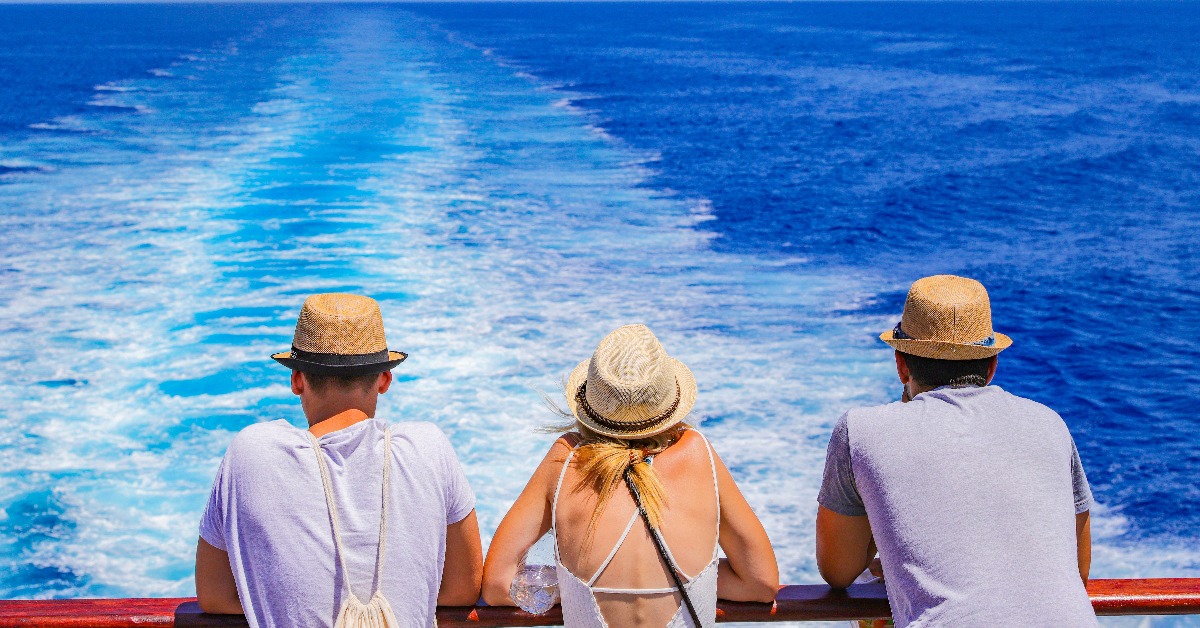
Explore your surroundings
Cruise ships are massive, so there are plenty of areas to explore, activities to find, and decks to get used to.
While you’re waiting for the mandatory muster drill, pull up a map of the ship on your cruise line’s app and start familiarizing yourself with the place you’ll call home for the next week or so.

Consider choosing an e-muster
Some cruises now host their muster drills entirely via their app instead of in-person safety training.
Find out if your cruise line requires an in-person drill or if you can complete an e-course instead, then take care of the course right away.

Double-check reservations — or make them in the first place
You might need to make a reservation to enjoy the cruise line activities you’ve been most excited about, such as a spa day or meal at a fancy restaurant.
Hopefully, you signed up for events well in advance. If so, take a moment to verify that the details are in order. If you didn’t sign up early, you should be able to use your app to find any open spots.
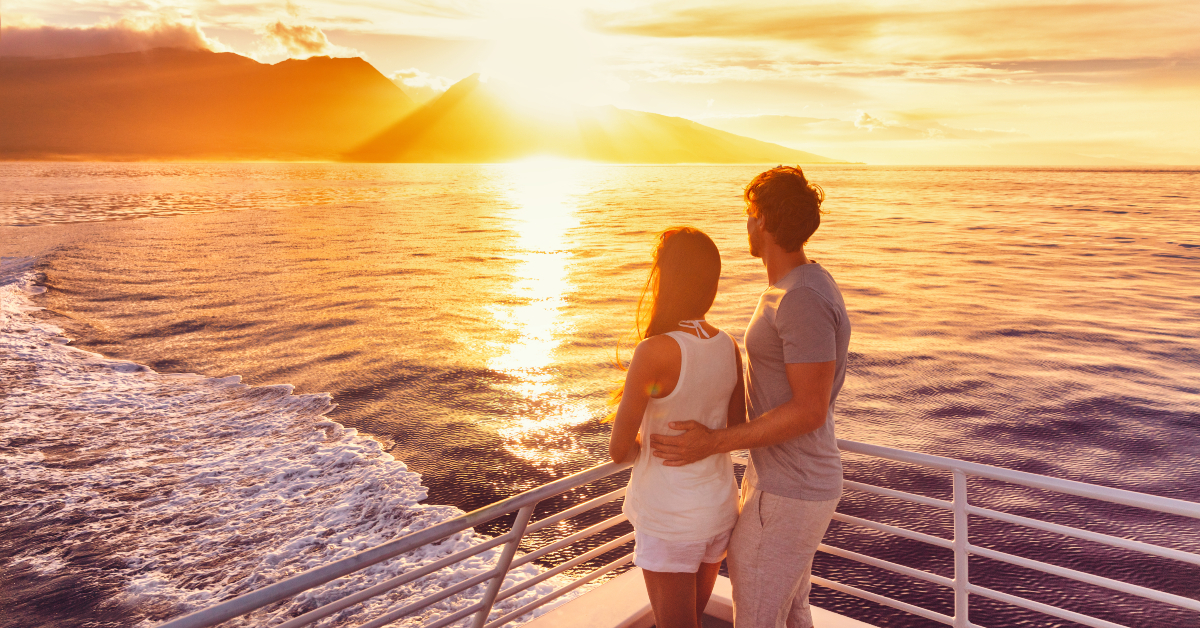
Find the best spot to enjoy embarking
There’s nothing quite like the rush of watching your ship pull away from the shoreline and head out to sea at the start of your grand adventure.
Document the moment by finding the ideal spot to watch the moment you leave port — you won’t want to miss it.

Unpack the rest of your bags
You’ve already unpacked your carry-on. Next up, unpack your luggage as soon as it arrives in your cabin.
The sooner you check this tedious task off your list, the faster you can get to the cruise ship activities you’ve been looking forward to for so long.
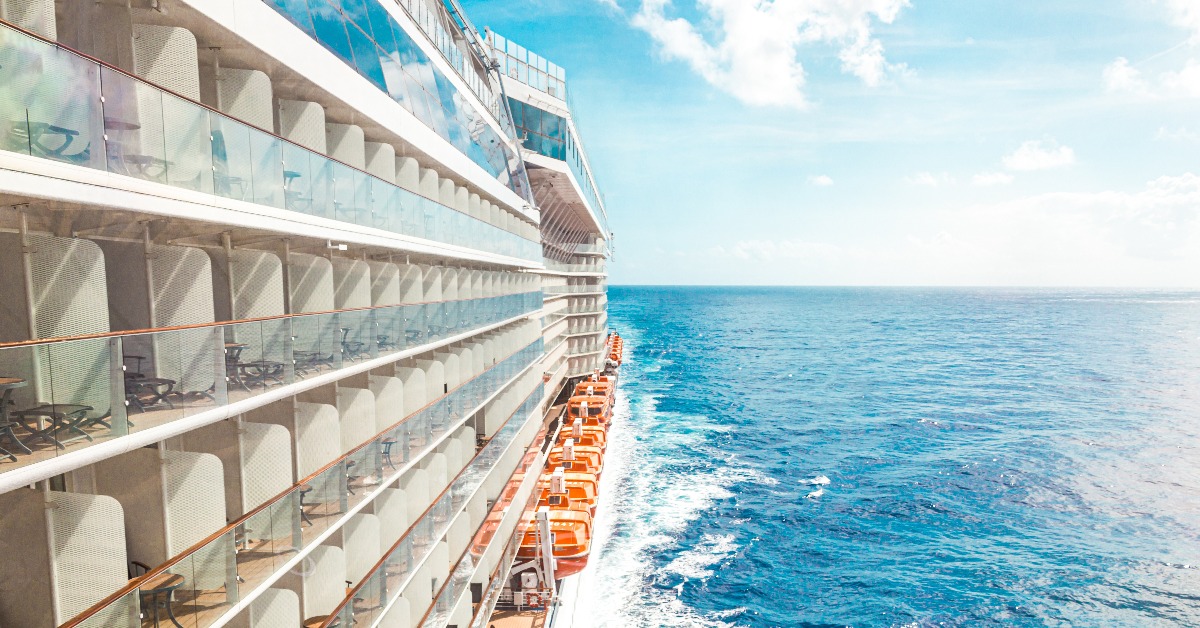
Bottom line
Follow this simple 16-step checklist to avoid wasting money and enjoy every minute of your cruise, from the start of your journey to the end.
You’ve spent ages preparing for your cruise. Don’t let a second of it go to waste.
More from FinanceBuzz:
- 6 genius hacks Costco shoppers should know.
- Can you retire early? Take this quiz and find out.
- 7 things to do if you're scraping by financially.
- 9 simple ways to make up to an extra $200/day
More for You
Ex-WNBA player Val Whiting makes clear stance on transgender athletes in women's sports
Boeing plane part falls off, strikes wing flap during takeoff in Denver: FAA
Vitamin Once Prescribed to Lower Heart Disease Risk May Actually Raise It, Study Finds
Greta Thunberg dragged away from Dutch climate protest by police
Toy Company Launches Life-Sized M3GAN Doll Replica
Joe Biden 'Drives Me Crazy'—Former Obama Strategist
What to do when your own number appears to ring your home phone
I’m a Mechanic: 4 Signs You’re Buying a Lemon
Ukraine appeared to strike a Russian tank equipped with a makeshift electronic warfare system — but that may worry Ukraine
Experts Say These Are The 5 Worst Foods For Your Cholesterol
Timothée Chalamet Breaks Global Box Office Record With Dune 2
How to turn an old PC into a NAS
Florida no longer in play as a swing state as GOP voters surge over Dems by nearly 900K: DeSantis
The Toyota Crossover That Outsells Its Entire Hybrid Lineup
"Why he was crying? I didn't care" - Scottie Pippen showed no sympathy for John Paxson when he cried during an apology call
USA vs. China aircraft carriers
This Mads Mikkelsen Movie Is One of the Best Modern Westerns
12 Low-Sugar Fruits You Should Be Eating, Recommended by Dietitians
How to delete your personal information from the internet
These 5 popular fast-food chains went out of business, but why?

Crying Myself to Sleep on the Biggest Cruise Ship Ever
Seven agonizing nights aboard the Icon of the Seas

Listen to this article
Listen to more stories on curio
Updated at 2:44 p.m. ET on April 6, 2024.
This article was featured in the One Story to Read Today newsletter. Sign up for it here .
MY FIRST GLIMPSE of Royal Caribbean’s Icon of the Seas, from the window of an approaching Miami cab, brings on a feeling of vertigo, nausea, amazement, and distress. I shut my eyes in defense, as my brain tells my optic nerve to try again.
The ship makes no sense, vertically or horizontally. It makes no sense on sea, or on land, or in outer space. It looks like a hodgepodge of domes and minarets, tubes and canopies, like Istanbul had it been designed by idiots. Vibrant, oversignifying colors are stacked upon other such colors, decks perched over still more decks; the only comfort is a row of lifeboats ringing its perimeter. There is no imposed order, no cogent thought, and, for those who do not harbor a totalitarian sense of gigantomania, no visual mercy. This is the biggest cruise ship ever built, and I have been tasked with witnessing its inaugural voyage.
Explore the May 2024 Issue
Check out more from this issue and find your next story to read.
“Author embarks on their first cruise-ship voyage” has been a staple of American essay writing for almost three decades, beginning with David Foster Wallace’s “A Supposedly Fun Thing I’ll Never Do Again,” which was first published in 1996 under the title “Shipping Out.” Since then, many admirable writers have widened and diversified the genre. Usually the essayist commissioned to take to the sea is in their first or second flush of youth and is ready to sharpen their wit against the hull of the offending vessel. I am 51, old and tired, having seen much of the world as a former travel journalist, and mostly what I do in both life and prose is shrug while muttering to my imaginary dachshund, “This too shall pass.” But the Icon of the Seas will not countenance a shrug. The Icon of the Seas is the Linda Loman of cruise ships, exclaiming that attention must be paid. And here I am in late January with my one piece of luggage and useless gray winter jacket and passport, zipping through the Port of Miami en route to the gangway that will separate me from the bulk of North America for more than seven days, ready to pay it in full.
The aforementioned gangway opens up directly onto a thriving mall (I will soon learn it is imperiously called the “Royal Promenade”), presently filled with yapping passengers beneath a ceiling studded with balloons ready to drop. Crew members from every part of the global South, as well as a few Balkans, are shepherding us along while pressing flutes of champagne into our hands. By a humming Starbucks, I drink as many of these as I can and prepare to find my cabin. I show my blue Suite Sky SeaPass Card (more on this later, much more) to a smiling woman from the Philippines, and she tells me to go “aft.” Which is where, now? As someone who has rarely sailed on a vessel grander than the Staten Island Ferry, I am confused. It turns out that the aft is the stern of the ship, or, for those of us who don’t know what a stern or an aft are, its ass. The nose of the ship, responsible for separating the waves before it, is also called a bow, and is marked for passengers as the FWD , or forward. The part of the contemporary sailing vessel where the malls are clustered is called the midship. I trust that you have enjoyed this nautical lesson.
I ascend via elevator to my suite on Deck 11. This is where I encounter my first terrible surprise. My suite windows and balcony do not face the ocean. Instead, they look out onto another shopping mall. This mall is the one that’s called Central Park, perhaps in homage to the Olmsted-designed bit of greenery in the middle of my hometown. Although on land I would be delighted to own a suite with Central Park views, here I am deeply depressed. To sail on a ship and not wake up to a vast blue carpet of ocean? Unthinkable.
Allow me a brief preamble here. The story you are reading was commissioned at a moment when most staterooms on the Icon were sold out. In fact, so enthralled by the prospect of this voyage were hard-core mariners that the ship’s entire inventory of guest rooms (the Icon can accommodate up to 7,600 passengers, but its inaugural journey was reduced to 5,000 or so for a less crowded experience) was almost immediately sold out. Hence, this publication was faced with the shocking prospect of paying nearly $19,000 to procure for this solitary passenger an entire suite—not including drinking expenses—all for the privilege of bringing you this article. But the suite in question doesn’t even have a view of the ocean! I sit down hard on my soft bed. Nineteen thousand dollars for this .

The viewless suite does have its pluses. In addition to all the Malin+Goetz products in my dual bathrooms, I am granted use of a dedicated Suite Deck lounge; access to Coastal Kitchen, a superior restaurant for Suites passengers; complimentary VOOM SM Surf & Stream (“the fastest Internet at Sea”) “for one device per person for the whole cruise duration”; a pair of bathrobes (one of which comes prestained with what looks like a large expectoration by the greenest lizard on Earth); and use of the Grove Suite Sun, an area on Decks 18 and 19 with food and deck chairs reserved exclusively for Suite passengers. I also get reserved seating for a performance of The Wizard of Oz , an ice-skating tribute to the periodic table, and similar provocations. The very color of my Suite Sky SeaPass Card, an oceanic blue as opposed to the cloying royal purple of the standard non-Suite passenger, will soon provoke envy and admiration. But as high as my status may be, there are those on board who have much higher status still, and I will soon learn to bow before them.
In preparation for sailing, I have “priced in,” as they say on Wall Street, the possibility that I may come from a somewhat different monde than many of the other cruisers. Without falling into stereotypes or preconceptions, I prepare myself for a friendly outspokenness on the part of my fellow seafarers that may not comply with modern DEI standards. I believe in meeting people halfway, and so the day before flying down to Miami, I visited what remains of Little Italy to purchase a popular T-shirt that reads DADDY’S LITTLE MEATBALL across the breast in the colors of the Italian flag. My wife recommended that I bring one of my many T-shirts featuring Snoopy and the Peanuts gang, as all Americans love the beagle and his friends. But I naively thought that my meatball T-shirt would be more suitable for conversation-starting. “Oh, and who is your ‘daddy’?” some might ask upon seeing it. “And how long have you been his ‘little meatball’?” And so on.
I put on my meatball T-shirt and head for one of the dining rooms to get a late lunch. In the elevator, I stick out my chest for all to read the funny legend upon it, but soon I realize that despite its burnished tricolor letters, no one takes note. More to the point, no one takes note of me. Despite my attempts at bridge building, the very sight of me (small, ethnic, without a cap bearing the name of a football team) elicits no reaction from other passengers. Most often, they will small-talk over me as if I don’t exist. This brings to mind the travails of David Foster Wallace , who felt so ostracized by his fellow passengers that he retreated to his cabin for much of his voyage. And Wallace was raised primarily in the Midwest and was a much larger, more American-looking meatball than I am. If he couldn’t talk to these people, how will I? What if I leave this ship without making any friends at all, despite my T-shirt? I am a social creature, and the prospect of seven days alone and apart is saddening. Wallace’s stateroom, at least, had a view of the ocean, a kind of cheap eternity.
Worse awaits me in the dining room. This is a large, multichandeliered room where I attended my safety training (I was shown how to put on a flotation vest; it is a very simple procedure). But the maître d’ politely refuses me entry in an English that seems to verge on another language. “I’m sorry, this is only for pendejos ,” he seems to be saying. I push back politely and he repeats himself. Pendejos ? Piranhas? There’s some kind of P-word to which I am not attuned. Meanwhile elderly passengers stream right past, powered by their limbs, walkers, and electric wheelchairs. “It is only pendejo dining today, sir.” “But I have a suite!” I say, already starting to catch on to the ship’s class system. He examines my card again. “But you are not a pendejo ,” he confirms. I am wearing a DADDY’S LITTLE MEATBALL T-shirt, I want to say to him. I am the essence of pendejo .
Eventually, I give up and head to the plebeian buffet on Deck 15, which has an aquatic-styled name I have now forgotten. Before gaining entry to this endless cornucopia of reheated food, one passes a washing station of many sinks and soap dispensers, and perhaps the most intriguing character on the entire ship. He is Mr. Washy Washy—or, according to his name tag, Nielbert of the Philippines—and he is dressed as a taco (on other occasions, I’ll see him dressed as a burger). Mr. Washy Washy performs an eponymous song in spirited, indeed flamboyant English: “Washy, washy, wash your hands, WASHY WASHY!” The dangers of norovirus and COVID on a cruise ship this size (a giant fellow ship was stricken with the former right after my voyage) makes Mr. Washy Washy an essential member of the crew. The problem lies with the food at the end of Washy’s rainbow. The buffet is groaning with what sounds like sophisticated dishes—marinated octopus, boiled egg with anchovy, chorizo, lobster claws—but every animal tastes tragically the same, as if there was only one creature available at the market, a “cruisipus” bred specifically for Royal Caribbean dining. The “vegetables” are no better. I pick up a tomato slice and look right through it. It tastes like cellophane. I sit alone, apart from the couples and parents with gaggles of children, as “We Are Family” echoes across the buffet space.
I may have failed to mention that all this time, the Icon of the Seas has not left port. As the fiery mango of the subtropical setting sun makes Miami’s condo skyline even more apocalyptic, the ship shoves off beneath a perfunctory display of fireworks. After the sun sets, in the far, dark distance, another circus-lit cruise ship ruptures the waves before us. We glance at it with pity, because it is by definition a smaller ship than our own. I am on Deck 15, outside the buffet and overlooking a bunch of pools (the Icon has seven of them), drinking a frilly drink that I got from one of the bars (the Icon has 15 of them), still too shy to speak to anyone, despite Sister Sledge’s assertion that all on the ship are somehow related.
Kim Brooks: On failing the family vacation
The ship’s passage away from Ron DeSantis’s Florida provides no frisson, no sense of developing “sea legs,” as the ship is too large to register the presence of waves unless a mighty wind adds significant chop. It is time for me to register the presence of the 5,000 passengers around me, even if they refuse to register mine. My fellow travelers have prepared for this trip with personally decorated T-shirts celebrating the importance of this voyage. The simplest ones say ICON INAUGURAL ’24 on the back and the family name on the front. Others attest to an over-the-top love of cruise ships: WARNING! MAY START TALKING ABOUT CRUISING . Still others are artisanally designed and celebrate lifetimes spent married while cruising (on ships, of course). A couple possibly in their 90s are wearing shirts whose backs feature a drawing of a cruise liner, two flamingos with ostensibly male and female characteristics, and the legend “ HUSBAND AND WIFE Cruising Partners FOR LIFE WE MAY NOT HAVE IT All Together BUT TOGETHER WE HAVE IT ALL .” (The words not in all caps have been written in cursive.) A real journalist or a more intrepid conversationalist would have gone up to the couple and asked them to explain the longevity of their marriage vis-à-vis their love of cruising. But instead I head to my mall suite, take off my meatball T-shirt, and allow the first tears of the cruise to roll down my cheeks slowly enough that I briefly fall asleep amid the moisture and salt.

I WAKE UP with a hangover. Oh God. Right. I cannot believe all of that happened last night. A name floats into my cobwebbed, nauseated brain: “Ayn Rand.” Jesus Christ.
I breakfast alone at the Coastal Kitchen. The coffee tastes fine and the eggs came out of a bird. The ship rolls slightly this morning; I can feel it in my thighs and my schlong, the parts of me that are most receptive to danger.
I had a dangerous conversation last night. After the sun set and we were at least 50 miles from shore (most modern cruise ships sail at about 23 miles an hour), I lay in bed softly hiccupping, my arms stretched out exactly like Jesus on the cross, the sound of the distant waves missing from my mall-facing suite, replaced by the hum of air-conditioning and children shouting in Spanish through the vents of my two bathrooms. I decided this passivity was unacceptable. As an immigrant, I feel duty-bound to complete the tasks I am paid for, which means reaching out and trying to understand my fellow cruisers. So I put on a normal James Perse T-shirt and headed for one of the bars on the Royal Promenade—the Schooner Bar, it was called, if memory serves correctly.
I sat at the bar for a martini and two Negronis. An old man with thick, hairy forearms drank next to me, very silent and Hemingwaylike, while a dreadlocked piano player tinkled out a series of excellent Elton John covers. To my right, a young white couple—he in floral shorts, she in a light, summery miniskirt with a fearsome diamond ring, neither of them in football regalia—chatted with an elderly couple. Do it , I commanded myself. Open your mouth. Speak! Speak without being spoken to. Initiate. A sentence fragment caught my ear from the young woman, “Cherry Hill.” This is a suburb of Philadelphia in New Jersey, and I had once been there for a reading at a synagogue. “Excuse me,” I said gently to her. “Did you just mention Cherry Hill? It’s a lovely place.”
As it turned out, the couple now lived in Fort Lauderdale (the number of Floridians on the cruise surprised me, given that Southern Florida is itself a kind of cruise ship, albeit one slowly sinking), but soon they were talking with me exclusively—the man potbellied, with a chin like a hard-boiled egg; the woman as svelte as if she were one of the many Ukrainian members of the crew—the elderly couple next to them forgotten. This felt as groundbreaking as the first time I dared to address an American in his native tongue, as a child on a bus in Queens (“On my foot you are standing, Mister”).
“I don’t want to talk politics,” the man said. “But they’re going to eighty-six Biden and put Michelle in.”
I considered the contradictions of his opening conversational gambit, but decided to play along. “People like Michelle,” I said, testing the waters. The husband sneered, but the wife charitably put forward that the former first lady was “more personable” than Joe Biden. “They’re gonna eighty-six Biden,” the husband repeated. “He can’t put a sentence together.”
After I mentioned that I was a writer—though I presented myself as a writer of teleplays instead of novels and articles such as this one—the husband told me his favorite writer was Ayn Rand. “Ayn Rand, she came here with nothing,” the husband said. “I work with a lot of Cubans, so …” I wondered if I should mention what I usually do to ingratiate myself with Republicans or libertarians: the fact that my finances improved after pass-through corporations were taxed differently under Donald Trump. Instead, I ordered another drink and the couple did the same, and I told him that Rand and I were born in the same city, St. Petersburg/Leningrad, and that my family also came here with nothing. Now the bonding and drinking began in earnest, and several more rounds appeared. Until it all fell apart.
Read: Gary Shteyngart on watching Russian television for five days straight
My new friend, whom I will refer to as Ayn, called out to a buddy of his across the bar, and suddenly a young couple, both covered in tattoos, appeared next to us. “He fucking punked me,” Ayn’s frat-boy-like friend called out as he put his arm around Ayn, while his sizable partner sizzled up to Mrs. Rand. Both of them had a look I have never seen on land—their eyes projecting absence and enmity in equal measure. In the ’90s, I drank with Russian soldiers fresh from Chechnya and wandered the streets of wartime Zagreb, but I have never seen such undisguised hostility toward both me and perhaps the universe at large. I was briefly introduced to this psychopathic pair, but neither of them wanted to have anything to do with me, and the tattooed woman would not even reveal her Christian name to me (she pretended to have the same first name as Mrs. Rand). To impress his tattooed friends, Ayn made fun of the fact that as a television writer, I’d worked on the series Succession (which, it would turn out, practically nobody on the ship had watched), instead of the far more palatable, in his eyes, zombie drama of last year. And then my new friends drifted away from me into an angry private conversation—“He punked me!”—as I ordered another drink for myself, scared of the dead-eyed arrivals whose gaze never registered in the dim wattage of the Schooner Bar, whose terrifying voices and hollow laughs grated like unoiled gears against the crooning of “Goodbye Yellow Brick Road.”
But today is a new day for me and my hangover. After breakfast, I explore the ship’s so-called neighborhoods . There’s the AquaDome, where one can find a food hall and an acrobatic sound-and-light aquatic show. Central Park has a premium steak house, a sushi joint, and a used Rolex that can be bought for $8,000 on land here proudly offered at $17,000. There’s the aforementioned Royal Promenade, where I had drunk with the Rands, and where a pair of dueling pianos duel well into the night. There’s Surfside, a kids’ neighborhood full of sugary garbage, which looks out onto the frothy trail that the behemoth leaves behind itself. Thrill Island refers to the collection of tubes that clutter the ass of the ship and offer passengers six waterslides and a surfing simulation. There’s the Hideaway, an adult zone that plays music from a vomit-slathered, Brit-filled Alicante nightclub circa 1996 and proves a big favorite with groups of young Latin American customers. And, most hurtfully, there’s the Suite Neighborhood.

I say hurtfully because as a Suite passenger I should be here, though my particular suite is far from the others. Whereas I am stuck amid the riffraff of Deck 11, this section is on the highborn Decks 16 and 17, and in passing, I peek into the spacious, tall-ceilinged staterooms from the hallway, dazzled by the glint of the waves and sun. For $75,000, one multifloor suite even comes with its own slide between floors, so that a family may enjoy this particular terror in private. There is a quiet splendor to the Suite Neighborhood. I see fewer stickers and signs and drawings than in my own neighborhood—for example, MIKE AND DIANA PROUDLY SERVED U.S. MARINE CORPS RETIRED . No one here needs to announce their branch of service or rank; they are simply Suites, and this is where they belong. Once again, despite my hard work and perseverance, I have been disallowed from the true American elite. Once again, I am “Not our class, dear.” I am reminded of watching The Love Boat on my grandmother’s Zenith, which either was given to her or we found in the trash (I get our many malfunctioning Zeniths confused) and whose tube got so hot, I would put little chunks of government cheese on a thin tissue atop it to give our welfare treat a pleasant, Reagan-era gooeyness. I could not understand English well enough then to catch the nuances of that seafaring program, but I knew that there were differences in the status of the passengers, and that sometimes those differences made them sad. Still, this ship, this plenty—every few steps, there are complimentary nachos or milkshakes or gyros on offer—was the fatty fuel of my childhood dreams. If only I had remained a child.
I walk around the outdoor decks looking for company. There is a middle-aged African American couple who always seem to be asleep in each other’s arms, probably exhausted from the late capitalism they regularly encounter on land. There is far more diversity on this ship than I expected. Many couples are a testament to Loving v. Virginia , and there is a large group of folks whose T-shirts read MELANIN AT SEA / IT’S THE MELANIN FOR ME . I smile when I see them, but then some young kids from the group makes Mr. Washy Washy do a cruel, caricatured “Burger Dance” (today he is in his burger getup), and I think, Well, so much for intersectionality .
At the infinity pool on Deck 17, I spot some elderly women who could be ethnic and from my part of the world, and so I jump in. I am proved correct! Many of them seem to be originally from Queens (“Corona was still great when it was all Italian”), though they are now spread across the tristate area. We bond over the way “Ron-kon-koma” sounds when announced in Penn Station.
“Everyone is here for a different reason,” one of them tells me. She and her ex-husband last sailed together four years ago to prove to themselves that their marriage was truly over. Her 15-year-old son lost his virginity to “an Irish young lady” while their ship was moored in Ravenna, Italy. The gaggle of old-timers competes to tell me their favorite cruising stories and tips. “A guy proposed in Central Park a couple of years ago”—many Royal Caribbean ships apparently have this ridiculous communal area—“and she ran away screaming!” “If you’re diamond-class, you get four drinks for free.” “A different kind of passenger sails out of Bayonne.” (This, perhaps, is racially coded.) “Sometimes, if you tip the bartender $5, your next drink will be free.”
“Everyone’s here for a different reason,” the woman whose marriage ended on a cruise tells me again. “Some people are here for bad reasons—the drinkers and the gamblers. Some people are here for medical reasons.” I have seen more than a few oxygen tanks and at least one woman clearly undergoing very serious chemo. Some T-shirts celebrate good news about a cancer diagnosis. This might be someone’s last cruise or week on Earth. For these women, who have spent months, if not years, at sea, cruising is a ritual as well as a life cycle: first love, last love, marriage, divorce, death.
Read: The last place on Earth any tourist should go
I have talked with these women for so long, tonight I promise myself that after a sad solitary dinner I will not try to seek out company at the bars in the mall or the adult-themed Hideaway. I have enough material to fulfill my duties to this publication. As I approach my orphaned suite, I run into the aggro young people who stole Mr. and Mrs. Rand away from me the night before. The tattooed apparitions pass me without a glance. She is singing something violent about “Stuttering Stanley” (a character in a popular horror movie, as I discover with my complimentary VOOM SM Surf & Stream Internet at Sea) and he’s loudly shouting about “all the money I’ve lost,” presumably at the casino in the bowels of the ship.
So these bent psychos out of a Cormac McCarthy novel are angrily inhabiting my deck. As I mewl myself to sleep, I envision a limited series for HBO or some other streamer, a kind of low-rent White Lotus , where several aggressive couples conspire to throw a shy intellectual interloper overboard. I type the scenario into my phone. As I fall asleep, I think of what the woman who recently divorced her husband and whose son became a man through the good offices of the Irish Republic told me while I was hoisting myself out of the infinity pool. “I’m here because I’m an explorer. I’m here because I’m trying something new.” What if I allowed myself to believe in her fantasy?

“YOU REALLY STARTED AT THE TOP,” they tell me. I’m at the Coastal Kitchen for my eggs and corned-beef hash, and the maître d’ has slotted me in between two couples. Fueled by coffee or perhaps intrigued by my relative youth, they strike up a conversation with me. As always, people are shocked that this is my first cruise. They contrast the Icon favorably with all the preceding liners in the Royal Caribbean fleet, usually commenting on the efficiency of the elevators that hurl us from deck to deck (as in many large corporate buildings, the elevators ask you to choose a floor and then direct you to one of many lifts). The couple to my right, from Palo Alto—he refers to his “porn mustache” and calls his wife “my cougar” because she is two years older—tell me they are “Pandemic Pinnacles.”
This is the day that my eyes will be opened. Pinnacles , it is explained to me over translucent cantaloupe, have sailed with Royal Caribbean for 700 ungodly nights. Pandemic Pinnacles took advantage of the two-for-one accrual rate of Pinnacle points during the pandemic, when sailing on a cruise ship was even more ill-advised, to catapult themselves into Pinnacle status.
Because of the importance of the inaugural voyage of the world’s largest cruise liner, more than 200 Pinnacles are on this ship, a startling number, it seems. Mrs. Palo Alto takes out a golden badge that I have seen affixed over many a breast, which reads CROWN AND ANCHOR SOCIETY along with her name. This is the coveted badge of the Pinnacle. “You should hear all the whining in Guest Services,” her husband tells me. Apparently, the Pinnacles who are not also Suites like us are all trying to use their status to get into Coastal Kitchen, our elite restaurant. Even a Pinnacle needs to be a Suite to access this level of corned-beef hash.
“We’re just baby Pinnacles,” Mrs. Palo Alto tells me, describing a kind of internal class struggle among the Pinnacle elite for ever higher status.
And now I understand what the maître d’ was saying to me on the first day of my cruise. He wasn’t saying “ pendejo .” He was saying “Pinnacle.” The dining room was for Pinnacles only, all those older people rolling in like the tide on their motorized scooters.
And now I understand something else: This whole thing is a cult. And like most cults, it can’t help but mirror the endless American fight for status. Like Keith Raniere’s NXIVM, where different-colored sashes were given out to connote rank among Raniere’s branded acolytes, this is an endless competition among Pinnacles, Suites, Diamond-Plusers, and facing-the-mall, no-balcony purple SeaPass Card peasants, not to mention the many distinctions within each category. The more you cruise, the higher your status. No wonder a section of the Royal Promenade is devoted to getting passengers to book their next cruise during the one they should be enjoying now. No wonder desperate Royal Caribbean offers (“FINAL HOURS”) crowded my email account weeks before I set sail. No wonder the ship’s jewelry store, the Royal Bling, is selling a $100,000 golden chalice that will entitle its owner to drink free on Royal Caribbean cruises for life. (One passenger was already gaming out whether her 28-year-old son was young enough to “just about earn out” on the chalice or if that ship had sailed.) No wonder this ship was sold out months before departure , and we had to pay $19,000 for a horrid suite away from the Suite Neighborhood. No wonder the most mythical hero of Royal Caribbean lore is someone named Super Mario, who has cruised so often, he now has his own working desk on many ships. This whole experience is part cult, part nautical pyramid scheme.
From the June 2014 issue: Ship of wonks
“The toilets are amazing,” the Palo Altos are telling me. “One flush and you’re done.” “They don’t understand how energy-efficient these ships are,” the husband of the other couple is telling me. “They got the LNG”—liquefied natural gas, which is supposed to make the Icon a boon to the environment (a concept widely disputed and sometimes ridiculed by environmentalists).
But I’m thinking along a different line of attack as I spear my last pallid slice of melon. For my streaming limited series, a Pinnacle would have to get killed by either an outright peasant or a Suite without an ocean view. I tell my breakfast companions my idea.
“Oh, for sure a Pinnacle would have to be killed,” Mr. Palo Alto, the Pandemic Pinnacle, says, touching his porn mustache thoughtfully as his wife nods.
“THAT’S RIGHT, IT’S your time, buddy!” Hubert, my fun-loving Panamanian cabin attendant, shouts as I step out of my suite in a robe. “Take it easy, buddy!”
I have come up with a new dressing strategy. Instead of trying to impress with my choice of T-shirts, I have decided to start wearing a robe, as one does at a resort property on land, with a proper spa and hammam. The response among my fellow cruisers has been ecstatic. “Look at you in the robe!” Mr. Rand cries out as we pass each other by the Thrill Island aqua park. “You’re living the cruise life! You know, you really drank me under the table that night.” I laugh as we part ways, but my soul cries out, Please spend more time with me, Mr. and Mrs. Rand; I so need the company .
In my white robe, I am a stately presence, a refugee from a better limited series, a one-man crossover episode. (Only Suites are granted these robes to begin with.) Today, I will try many of the activities these ships have on offer to provide their clientele with a sense of never-ceasing motion. Because I am already at Thrill Island, I decide to climb the staircase to what looks like a mast on an old-fashioned ship (terrified, because I am afraid of heights) to try a ride called “Storm Chasers,” which is part of the “Category 6” water park, named in honor of one of the storms that may someday do away with the Port of Miami entirely. Storm Chasers consists of falling from the “mast” down a long, twisting neon tube filled with water, like being the camera inside your own colonoscopy, as you hold on to the handles of a mat, hoping not to die. The tube then flops you down headfirst into a trough of water, a Royal Caribbean baptism. It both knocks my breath out and makes me sad.
In keeping with the aquatic theme, I attend a show at the AquaDome. To the sound of “Live and Let Die,” a man in a harness gyrates to and fro in the sultry air. I saw something very similar in the back rooms of the famed Berghain club in early-aughts Berlin. Soon another harnessed man is gyrating next to the first. Ja , I think to myself, I know how this ends. Now will come the fisting , natürlich . But the show soon devolves into the usual Marvel-film-grade nonsense, with too much light and sound signifying nichts . If any fisting is happening, it is probably in the Suite Neighborhood, inside a cabin marked with an upside-down pineapple, which I understand means a couple are ready to swing, and I will see none of it.
I go to the ice show, which is a kind of homage—if that’s possible—to the periodic table, done with the style and pomp and masterful precision that would please the likes of Kim Jong Un, if only he could afford Royal Caribbean talent. At one point, the dancers skate to the theme song of Succession . “See that!” I want to say to my fellow Suites—at “cultural” events, we have a special section reserved for us away from the commoners—“ Succession ! It’s even better than the zombie show! Open your minds!”
Finally, I visit a comedy revue in an enormous and too brightly lit version of an “intimate,” per Royal Caribbean literature, “Manhattan comedy club.” Many of the jokes are about the cruising life. “I’ve lived on ships for 20 years,” one of the middle-aged comedians says. “I can only see so many Filipino homosexuals dressed as a taco.” He pauses while the audience laughs. “I am so fired tonight,” he says. He segues into a Trump impression and then Biden falling asleep at the microphone, which gets the most laughs. “Anyone here from Fort Leonard Wood?” another comedian asks. Half the crowd seems to cheer. As I fall asleep that night, I realize another connection I have failed to make, and one that may explain some of the diversity on this vessel—many of its passengers have served in the military.
As a coddled passenger with a suite, I feel like I am starting to understand what it means to have a rank and be constantly reminded of it. There are many espresso makers , I think as I look across the expanse of my officer-grade quarters before closing my eyes, but this one is mine .

A shocking sight greets me beyond the pools of Deck 17 as I saunter over to the Coastal Kitchen for my morning intake of slightly sour Americanos. A tiny city beneath a series of perfectly pressed green mountains. Land! We have docked for a brief respite in Basseterre, the capital of St. Kitts and Nevis. I wolf down my egg scramble to be one of the first passengers off the ship. Once past the gangway, I barely refrain from kissing the ground. I rush into the sights and sounds of this scruffy island city, sampling incredible conch curry and buckets of non-Starbucks coffee. How wonderful it is to be where God intended humans to be: on land. After all, I am neither a fish nor a mall rat. This is my natural environment. Basseterre may not be Havana, but there are signs of human ingenuity and desire everywhere you look. The Black Table Grill Has been Relocated to Soho Village, Market Street, Directly Behind of, Gary’s Fruits and Flower Shop. Signed. THE PORK MAN reads a sign stuck to a wall. Now, that is how you write a sign. A real sign, not the come-ons for overpriced Rolexes that blink across the screens of the Royal Promenade.
“Hey, tie your shoestring!” a pair of laughing ladies shout to me across the street.
“Thank you!” I shout back. Shoestring! “Thank you very much.”
A man in Independence Square Park comes by and asks if I want to play with his monkey. I haven’t heard that pickup line since the Penn Station of the 1980s. But then he pulls a real monkey out of a bag. The monkey is wearing a diaper and looks insane. Wonderful , I think, just wonderful! There is so much life here. I email my editor asking if I can remain on St. Kitts and allow the Icon to sail off into the horizon without me. I have even priced a flight home at less than $300, and I have enough material from the first four days on the cruise to write the entire story. “It would be funny …” my editor replies. “Now get on the boat.”
As I slink back to the ship after my brief jailbreak, the locals stand under umbrellas to gaze at and photograph the boat that towers over their small capital city. The limousines of the prime minister and his lackeys are parked beside the gangway. St. Kitts, I’ve been told, is one of the few islands that would allow a ship of this size to dock.
“We hear about all the waterslides,” a sweet young server in one of the cafés told me. “We wish we could go on the ship, but we have to work.”
“I want to stay on your island,” I replied. “I love it here.”
But she didn’t understand how I could possibly mean that.
“WASHY, WASHY, so you don’t get stinky, stinky!” kids are singing outside the AquaDome, while their adult minders look on in disapproval, perhaps worried that Mr. Washy Washy is grooming them into a life of gayness. I heard a southern couple skip the buffet entirely out of fear of Mr. Washy Washy.
Meanwhile, I have found a new watering hole for myself, the Swim & Tonic, the biggest swim-up bar on any cruise ship in the world. Drinking next to full-size, nearly naked Americans takes away one’s own self-consciousness. The men have curvaceous mom bodies. The women are equally un-shy about their sprawling physiques.
Today I’ve befriended a bald man with many children who tells me that all of the little trinkets that Royal Caribbean has left us in our staterooms and suites are worth a fortune on eBay. “Eighty dollars for the water bottle, 60 for the lanyard,” the man says. “This is a cult.”
“Tell me about it,” I say. There is, however, a clientele for whom this cruise makes perfect sense. For a large middle-class family (he works in “supply chains”), seven days in a lower-tier cabin—which starts at $1,800 a person—allow the parents to drop off their children in Surfside, where I imagine many young Filipina crew members will take care of them, while the parents are free to get drunk at a swim-up bar and maybe even get intimate in their cabin. Cruise ships have become, for a certain kind of hardworking family, a form of subsidized child care.
There is another man I would like to befriend at the Swim & Tonic, a tall, bald fellow who is perpetually inebriated and who wears a necklace studded with little rubber duckies in sunglasses, which, I am told, is a sort of secret handshake for cruise aficionados. Tomorrow, I will spend more time with him, but first the ship docks at St. Thomas, in the U.S. Virgin Islands. Charlotte Amalie, the capital, is more charming in name than in presence, but I still all but jump off the ship to score a juicy oxtail and plantains at the well-known Petite Pump Room, overlooking the harbor. From one of the highest points in the small city, the Icon of the Seas appears bigger than the surrounding hills.
I usually tan very evenly, but something about the discombobulation of life at sea makes me forget the regular application of sunscreen. As I walk down the streets of Charlotte Amalie in my fluorescent Icon of the Seas cap, an old Rastafarian stares me down. “Redneck,” he hisses.
“No,” I want to tell him, as I bring a hand up to my red neck, “that’s not who I am at all. On my island, Mannahatta, as Whitman would have it, I am an interesting person living within an engaging artistic milieu. I do not wish to use the Caribbean as a dumping ground for the cruise-ship industry. I love the work of Derek Walcott. You don’t understand. I am not a redneck. And if I am, they did this to me.” They meaning Royal Caribbean? Its passengers? The Rands?
“They did this to me!”
Back on the Icon, some older matrons are muttering about a run-in with passengers from the Celebrity cruise ship docked next to us, the Celebrity Apex. Although Celebrity Cruises is also owned by Royal Caribbean, I am made to understand that there is a deep fratricidal beef between passengers of the two lines. “We met a woman from the Apex,” one matron says, “and she says it was a small ship and there was nothing to do. Her face was as tight as a 19-year-old’s, she had so much surgery.” With those words, and beneath a cloudy sky, humidity shrouding our weathered faces and red necks, we set sail once again, hopefully in the direction of home.

THERE ARE BARELY 48 HOURS LEFT to the cruise, and the Icon of the Seas’ passengers are salty. They know how to work the elevators. They know the Washy Washy song by heart. They understand that the chicken gyro at “Feta Mediterranean,” in the AquaDome Market, is the least problematic form of chicken on the ship.
The passengers have shed their INAUGURAL CRUISE T-shirts and are now starting to evince political opinions. There are caps pledging to make America great again and T-shirts that celebrate words sometimes attributed to Patrick Henry: “The Constitution is not an instrument for the government to restrain the people; it is an instrument for the people to restrain the government.” With their preponderance of FAMILY FLAG FAITH FRIENDS FIREARMS T-shirts, the tables by the crepe station sometimes resemble the Capitol Rotunda on January 6. The Real Anthony Fauci , by Robert F. Kennedy Jr., appears to be a popular form of literature, especially among young men with very complicated versions of the American flag on their T-shirts. Other opinions blend the personal and the political. “Someone needs to kill Washy guy, right?” a well-dressed man in the elevator tells me, his gray eyes radiating nothing. “Just beat him to death. Am I right?” I overhear the male member of a young couple whisper, “There goes that freak” as I saunter by in my white spa robe, and I decide to retire it for the rest of the cruise.
I visit the Royal Bling to see up close the $100,000 golden chalice that entitles you to free drinks on Royal Caribbean forever. The pleasant Serbian saleslady explains that the chalice is actually gold-plated and covered in white zirconia instead of diamonds, as it would otherwise cost $1 million. “If you already have everything,” she explains, “this is one more thing you can get.”
I believe that anyone who works for Royal Caribbean should be entitled to immediate American citizenship. They already speak English better than most of the passengers and, per the Serbian lady’s sales pitch above, better understand what America is as well. Crew members like my Panamanian cabin attendant seem to work 24 hours a day. A waiter from New Delhi tells me that his contract is six months and three weeks long. After a cruise ends, he says, “in a few hours, we start again for the next cruise.” At the end of the half a year at sea, he is allowed a two-to-three-month stay at home with his family. As of 2019, the median income for crew members was somewhere in the vicinity of $20,000, according to a major business publication. Royal Caribbean would not share the current median salary for its crew members, but I am certain that it amounts to a fraction of the cost of a Royal Bling gold-plated, zirconia-studded chalice.
And because most of the Icon’s hyper-sanitized spaces are just a frittata away from being a Delta lounge, one forgets that there are actual sailors on this ship, charged with the herculean task of docking it in port. “Having driven 100,000-ton aircraft carriers throughout my career,” retired Admiral James G. Stavridis, the former NATO Supreme Allied Commander Europe, writes to me, “I’m not sure I would even know where to begin with trying to control a sea monster like this one nearly three times the size.” (I first met Stavridis while touring Army bases in Germany more than a decade ago.)
Today, I decide to head to the hot tub near Swim & Tonic, where some of the ship’s drunkest reprobates seem to gather (the other tubs are filled with families and couples). The talk here, like everywhere else on the ship, concerns football, a sport about which I know nothing. It is apparent that four teams have recently competed in some kind of finals for the year, and that two of them will now face off in the championship. Often when people on the Icon speak, I will try to repeat the last thing they said with a laugh or a nod of disbelief. “Yes, 20-yard line! Ha!” “Oh my God, of course, scrimmage.”
Soon we are joined in the hot tub by the late-middle-age drunk guy with the duck necklace. He is wearing a bucket hat with the legend HAWKEYES , which, I soon gather, is yet another football team. “All right, who turned me in?” Duck Necklace says as he plops into the tub beside us. “I get a call in the morning,” he says. “It’s security. Can you come down to the dining room by 10 a.m.? You need to stay away from the members of this religious family.” Apparently, the gregarious Duck Necklace had photobombed the wrong people. There are several families who present as evangelical Christians or practicing Muslims on the ship. One man, evidently, was not happy that Duck Necklace had made contact with his relatives. “It’s because of religious stuff; he was offended. I put my arm around 20 people a day.”
Everyone laughs. “They asked me three times if I needed medication,” he says of the security people who apparently interrogated him in full view of others having breakfast.
Another hot-tub denizen suggests that he should have asked for fentanyl. After a few more drinks, Duck Necklace begins to muse about what it would be like to fall off the ship. “I’m 62 and I’m ready to go,” he says. “I just don’t want a shark to eat me. I’m a huge God guy. I’m a Bible guy. There’s some Mayan theory squaring science stuff with religion. There is so much more to life on Earth.” We all nod into our Red Stripes.
“I never get off the ship when we dock,” he says. He tells us he lost $6,000 in the casino the other day. Later, I look him up, and it appears that on land, he’s a financial adviser in a crisp gray suit, probably a pillar of his North Chicago community.

THE OCEAN IS TEEMING with fascinating life, but on the surface it has little to teach us. The waves come and go. The horizon remains ever far away.
I am constantly told by my fellow passengers that “everybody here has a story.” Yes, I want to reply, but everybody everywhere has a story. You, the reader of this essay, have a story, and yet you’re not inclined to jump on a cruise ship and, like Duck Necklace, tell your story to others at great pitch and volume. Maybe what they’re saying is that everybody on this ship wants to have a bigger, more coherent, more interesting story than the one they’ve been given. Maybe that’s why there’s so much signage on the doors around me attesting to marriages spent on the sea. Maybe that’s why the Royal Caribbean newsletter slipped under my door tells me that “this isn’t a vacation day spent—it’s bragging rights earned.” Maybe that’s why I’m so lonely.
Today is a big day for Icon passengers. Today the ship docks at Royal Caribbean’s own Bahamian island, the Perfect Day at CocoCay. (This appears to be the actual name of the island.) A comedian at the nightclub opined on what his perfect day at CocoCay would look like—receiving oral sex while learning that his ex-wife had been killed in a car crash (big laughter). But the reality of the island is far less humorous than that.
One of the ethnic tristate ladies in the infinity pool told me that she loved CocoCay because it had exactly the same things that could be found on the ship itself. This proves to be correct. It is like the Icon, but with sand. The same tired burgers, the same colorful tubes conveying children and water from Point A to B. The same swim-up bar at its Hideaway ($140 for admittance, no children allowed; Royal Caribbean must be printing money off its clientele). “There was almost a fight at The Wizard of Oz ,” I overhear an elderly woman tell her companion on a chaise lounge. Apparently one of the passengers began recording Royal Caribbean’s intellectual property and “three guys came after him.”
I walk down a pathway to the center of the island, where a sign reads DO NOT ENTER: YOU HAVE REACHED THE BOUNDARY OF ADVENTURE . I hear an animal scampering in the bushes. A Royal Caribbean worker in an enormous golf cart soon chases me down and takes me back to the Hideaway, where I run into Mrs. Rand in a bikini. She becomes livid telling me about an altercation she had the other day with a woman over a towel and a deck chair. We Suites have special towel privileges; we do not have to hand over our SeaPass Card to score a towel. But the Rands are not Suites. “People are so entitled here,” Mrs. Rand says. “It’s like the airport with all its classes.” “You see,” I want to say, “this is where your husband’s love of Ayn Rand runs into the cruelties and arbitrary indignities of unbridled capitalism.” Instead we make plans to meet for a final drink in the Schooner Bar tonight (the Rands will stand me up).
Back on the ship, I try to do laps, but the pool (the largest on any cruise ship, naturally) is fully trashed with the detritus of American life: candy wrappers, a slowly dissolving tortilla chip, napkins. I take an extra-long shower in my suite, then walk around the perimeter of the ship on a kind of exercise track, past all the alluring lifeboats in their yellow-and-white livery. Maybe there is a dystopian angle to the HBO series that I will surely end up pitching, one with shades of WALL-E or Snowpiercer . In a collapsed world, a Royal Caribbean–like cruise liner sails from port to port, collecting new shipmates and supplies in exchange for the precious energy it has on board. (The actual Icon features a new technology that converts passengers’ poop into enough energy to power the waterslides . In the series, this shitty technology would be greatly expanded.) A very young woman (18? 19?), smart and lonely, who has only known life on the ship, walks along the same track as I do now, contemplating jumping off into the surf left by its wake. I picture reusing Duck Necklace’s words in the opening shot of the pilot. The girl is walking around the track, her eyes on the horizon; maybe she’s highborn—a Suite—and we hear the voice-over: “I’m 19 and I’m ready to go. I just don’t want a shark to eat me.”
Before the cruise is finished, I talk to Mr. Washy Washy, or Nielbert of the Philippines. He is a sweet, gentle man, and I thank him for the earworm of a song he has given me and for keeping us safe from the dreaded norovirus. “This is very important to me, getting people to wash their hands,” he tells me in his burger getup. He has dreams, as an artist and a performer, but they are limited in scope. One day he wants to dress up as a piece of bacon for the morning shift.
THE MAIDEN VOYAGE OF THE TITANIC (the Icon of the Seas is five times as large as that doomed vessel) at least offered its passengers an exciting ending to their cruise, but when I wake up on the eighth day, all I see are the gray ghosts that populate Miami’s condo skyline. Throughout my voyage, my writer friends wrote in to commiserate with me. Sloane Crosley, who once covered a three-day spa mini-cruise for Vogue , tells me she felt “so very alone … I found it very untethering.” Gideon Lewis-Kraus writes in an Instagram comment: “When Gary is done I think it’s time this genre was taken out back and shot.” And he is right. To badly paraphrase Adorno: After this, no more cruise stories. It is unfair to put a thinking person on a cruise ship. Writers typically have difficult childhoods, and it is cruel to remind them of the inherent loneliness that drove them to writing in the first place. It is also unseemly to write about the kind of people who go on cruises. Our country does not provide the education and upbringing that allow its citizens an interior life. For the creative class to point fingers at the large, breasty gentlemen adrift in tortilla-chip-laden pools of water is to gather a sour harvest of low-hanging fruit.
A day or two before I got off the ship, I decided to make use of my balcony, which I had avoided because I thought the view would only depress me further. What I found shocked me. My suite did not look out on Central Park after all. This entire time, I had been living in the ship’s Disneyland, Surfside, the neighborhood full of screaming toddlers consuming milkshakes and candy. And as I leaned out over my balcony, I beheld a slight vista of the sea and surf that I thought I had been missing. It had been there all along. The sea was frothy and infinite and blue-green beneath the span of a seagull’s wing. And though it had been trod hard by the world’s largest cruise ship, it remained.
This article appears in the May 2024 print edition with the headline “A Meatball at Sea.” When you buy a book using a link on this page, we receive a commission. Thank you for supporting The Atlantic.
Advertisement
Supported by
Tangled in Steel With No Way Out: How the Crew Stuck in Baltimore Is Faring
Twenty-two seafarers from India find themselves not only trapped in the ship that struck the Francis Scott Key Bridge, but also in an unexpected spotlight.
- Share full article

By Eduardo Medina
Reporting from Baltimore
Even from miles away, the destruction of the Francis Scott Key Bridge in Baltimore is a jarring visual: Chunks of steel jut above the water like metallic icebergs. Twisted gray beams protrude in crooked positions. From a park near Fort McHenry, visitors can see the giant cargo ship that struck the bridge and remains lodged in the wreckage.
Less visible, however, are the 22 crew members from India who have remained on the ship, named the Dali, since the disaster on Tuesday.
Little is publicly known about them other than that they are seafarers who embarked on a journey aboard the 985-foot-long cargo ship that was on its way to Sri Lanka, carrying 4,700 shipping containers, when it lost power and struck the Key Bridge, causing the structure to collapse.
Since the accident, which killed six construction workers, the crew members have found themselves in an unexpected spotlight. While keeping the ship operable, they are answering a deluge of questions from officials investigating the nighttime catastrophe, as the evidence of what occurred lies around them in mangled ruins stretching across the bow and deck.
While officials investigate what could have caused the tragedy, another question has emerged this week: What could the crew members, who have limited access to the outside world, be going through right now?
“They must feel this weight of responsibility that they couldn’t stop it from happening,” said Joshua Messick, the executive director of the Baltimore International Seafarers’ Center , a religious nonprofit that seeks to protect the rights of mariners.
Even so, officials have praised the crew’s swift mayday message that was transmitted over the radio as the ship lost power on Tuesday. Before the Dali struck the bridge, traveling at a rapid eight knots, the mayday call helped police officers stop traffic from heading onto the bridge, most likely saving many lives, the authorities said. A local harbor pilot with more than 10 years of experience was onboard, as well as an apprentice pilot in training.
As the ship remains stuck in the Port of Baltimore, where it may remain for weeks, the lives of the crew members have entered an uncertain phase. But one thing is certain: They will no longer cruise through the sea around South Africa toward their destination in Sri Lanka anytime soon.
But they are not going to imminently dock at the port either, as they must wait for enough debris to be cleared to free the ship and reopen the channel to one of the busiest ports in the United States. On Saturday, the governor of Maryland said officials planned to remove the first piece of the debris.
So, for now, crew members are most likely working a grueling schedule to maintain the ship that is similar to the one they would be if they were out at sea. The difference, though, is that they are in an immobile state as the eyes of the world fixate on them, experts said.
“The captain of the vessel and the crew have a duty to the ship,” said Stephen Frailey, a partner at Pacific Maritime Group, which helps with marine salvage and wreck removal.
According to Chris James, who works for a consulting firm assisting the ship’s management company, Synergy Marine, the crew members have ample supplies of food and water, as well as plenty of fuel to keep the generators going. Indeed, when Jennifer Homendy, the chair of the National Transportation Safety Board, went onboard the ship this week, she observed the cook cooking. “It smelled very good,” she said.
But there is still no exact timeline for when the ship might be extracted from the wreckage, Mr. James said. Once the N.T.S.B. and the Coast Guard finish their investigations, he said, “we’ll look at potentially swapping the crew out and getting them home.”
India, the home country of the crew members, is one of the world’s largest hubs for seafarers, according to John A. Konrad, a ship captain and the chief executive of gCaptain, a maritime and offshore industry news website. Though Indian captains and engineers are paid less than their American counterparts, Mr. Konrad said, they make a decent living when they work for three or more months out of the year at sea.
Working on a cargo ship, he said, is a 24-hour ordeal with no weekends off: Every day, decks are checked for maintenance and safety, cooks and cleaners serve the other members, and workers in the engine room keep things on track.
Cargo ship crew members do have some leisurely activities available to them onboard, though, such as video game breaks in cabins, workouts in gyms, table tennis sessions and movie nights. The Dali crew has at least a TV, magazines and books onboard, said Andrew Middleton, who runs Apostleship of the Sea, a program that ministers to sailors coming through the port.
Clistan Joy Sequeira, an Indian seafarer who was not on the Dali but who docked in Baltimore from another cargo ship on Friday, said in an interview that he feared the repercussions that the bridge collapse could have on his industry and his country.
“I’m scared that because this crew is Indian, our international image will suffer,” said Mr. Sequeira, 31. “Maybe we lose jobs.”
Some in Baltimore’s port community have had some contact with the Dali crew, albeit brief, through third parties or WhatsApp. Mr. Messick said he sent the crew two Wi-Fi hot spots on Friday because they did not have internet onboard.
Mr. Middleton said he had been keeping in touch with two crew members, reminding them that “we’re here for them.”
“When I’ve asked how they’re doing, their answers range from ‘good’ to ‘great,’” he said. “So, by their own accounts, they’re OK.”
Mr. Messick said he had also sent a care package to the crew through a salvage company helping with operations. In the package were candy, home-baked muffins from a concerned local and thank-you cards from children.
With so many questions still unanswered about the crew members’ next steps, Mr. Messick said he was eager to provide them with trauma care and emotional support. On Friday, he wrote a letter to the captain, which was delivered by another vessel.
“We’re here to support you,” it read.
Mike Baker contributed reporting.
Eduardo Medina is a Times reporter covering the South. An Alabama native, he is now based in Durham, N.C. More about Eduardo Medina

IMAGES
VIDEO
COMMENTS
Decision-making is a key part of being a cruise ship captain. "There are never two days alike," says Belinda Bennett of life on board Wind Star. "Broken machinery has to be dealt with, and ...
Proficiency in Security Awareness (as of 1st January 2014) Although these modules can be done separately it is far more cost effective to be done as a package - the STCW Basic Safety Training package - which will save you over 25%: STCW-95 Basic Safety Training package. Additional courses to help kick start your career in the cruise industry:
Half stripes can appear in three ways. The first is the rank itself. You can be a 1/2 stripe officer, this could be as a cadet, or certain positions in the Hotel Department. The second is at the top of the epaulette. If the half stripe is at the top of the epaulette it means that it is a ranked position.
This training covers areas such as guest services, ship operations, company culture, and the specific roles and responsibilities expected of a cruise ship officer within the company. 3. Leadership Development: As a cruise ship officer, you will be in a leadership position, responsible for supervising and managing a team.
That being said, you can take several approaches to becoming a licensed security officer aboard a cruise ship, including the following steps: 1. Attend an accredited maritime training program. Many cruise ship security officers must attend an accredited maritime training academy, as this can be a requirement across many cruise lines.
To become a cruise ship officer, you'll need to meet specific education and training requirements. Pursuing a career in this field offers exciting career opportunities and a promising salary potential. To start, a bachelor's degree in hospitality management or a related field is often required.
However, it does provide an advantage. Additionally, you need to have excellent grades, since most cruise ships hire captains who rank in the top five to 10% of their class. A bachelor's degree ...
Being an officer on a cruise ship comes with its own set of challenges and rewards. Here, we explore the experiences you can expect in this role: Challenges: Long Working Hours: Officers on a cruise ship often work long hours, ranging from 10 to 12 hours a day, and may have to work for several months without a break.
The cruise line industry has grown tremendously, increasing the number of cruise ships and cruise ship employment opportunities. In addition to the great experience and knowledge of our instructors. Our hands-on curriculum is constantly evolving, and this up-to-date training gives our students a competitive edge over competition!
You'll need some things to become a Cruise Ship Security Officer and keep everyone safe on sea journeys. First, finish high school or something like that. Get certificates for security and first aid - they're like superhero tools. Then, you'll undergo special training to learn how to handle problems and keep things safe on the ship.
Cruise captain salaries Cruise ship captain salaries may depend on professionals' training, experience and location. The national average salary for a cruise ship captain is $70,329 per year.Professionals may also want to consider factors such as the cost of living in various locations when they are not at sea when considering their prospective salary for this role.
Apprentices must be: At least 19 years old: You need to be at least 21 years old to receive an officer endorsement. Since the apprenticeship program takes two years, you need to be at least 19 when you apply. There is no upper age limit for the program, but apprentices must be in good physical health. In possession of a high school diploma: The ...
Security training. Each Royal Caribbean Group ship is staffed with a security team that is part of the ship's permanent crew. The Staff Captain, who is also the second in command, oversees the Security Department. The Security Officer is the head of the security team and is responsible for day-to-day security operations onboard.
CVSSA is a step in the right direction providing a proper level of training for the ship and vessel security, medical, and deck department personnel who will ultimately be held accountable for the proper and effective response to a crime scene. ... Cruise Vessel Ship Security Officer; Windows 7 or newer; Microsoft Edge, Mozilla Firefox, Google ...
Have you ever wondered where cruise ship officers receive additional professional training to progress through the ranks ? This video aims to give you an ins...
1. Work as a marine captain. You must hold the position as marine captain for a number of years before applying to become a cruise ship captain. Develop an excellent track record. In the vast majority of cases, marine captains are promoted after serving as deck officer or third mate on that ship.
The aim of this Online Proficiency as Ship Security Officer Course, also referred to a Vessel Security Officer (VSO), is to provide the essential education and training meeting with the Knowledge, Understanding and Proficiency (KUP) requirements, the 2010 Manila Amendments, and the requirements of Section A-VI/5, paragraphs 1 to 4 of the STCW ...
This STCW Ship Security Officer online course provides training about how to develop, implement, maintain andsupervise Ship Security Plans, and how to identify threats, vulnerabilities and assessment of security risks. The Ship Security Officer online course (SSO) is in accordance with the Mandatory Minimum Requirements for the Issue of ...
Seven Seas Preparatory Academy provides STCW Certification and training for the Yachting, Cruise Ship, and US Merchant Marine. Courses include STCW Basic Training Blended (2 days), STCW online courses, Deckhand training, Yacht Stewardess training, and Interior crew training. We provide STCW Basic Tr
process follows in Section 3. You will be graded by the Bridge Watch Officer with input from the Bridge Training Officer. ***All 1First Class deck cadets will be assigned approximately two 4/C MT major cadets to mentor. Your role is to be a source of knowledge and advice for the 4/C cadets. You
Security officer: In charge of daily security operations. Supervisors: Overlooks all other security personnel to ensure the ship's safety. The job description of each of these positions differs ...
About STCW.online. Emergency Control Maritime Training BV (dba STCW.online) is a Rotterdam based maritime training institute. Several of our STCW courses are approved by The Netherlands (EU) Shipping Authorities under ID: NL45 or LISCR, the Liberian register. ISO 9001:2015 certified. STCW.online is a trade name.
Cruise Ship Jobs as a Deck Officer. Deck Officers (aka: Navigation Officers) maintain watches on the bridge while the ship is at sea and in port. Some of their responsibilities include passage planning, safe navigation of the ship, crew safety training, ship stability, and maintenance of deck and safety equipment.
1 / 14. Are you ready for an adventure? ©Bicho_raro / iStock. The only way to travel through Hawaii's fifth-largest and least-visited island is in slow motion. Carry oodles of patience, forget ...
In a collapsed world, a Royal Caribbean-like cruise liner sails from port to port, collecting new shipmates and supplies in exchange for the precious energy it has on board. (The actual Icon ...
After selling their art gallery in Stuart, FL, in 2021, they explored the U.S. full time in a motorhome. But 18 months later, John, 76, a retired doctor, was exhausted by all the driving. "The ...
A local harbor pilot with more than 10 years of experience was onboard, as well as an apprentice pilot in training. As the ship remains stuck in the Port of Baltimore, where it may remain for ...
Juneau, Alaska begins a voluntary cap of five ships per day in 2024 as residents seek more restrictions (CLIA Alaska) Published Apr 4, 2024 6:50 PM by The Maritime Executive. Juneau, Alaska is ...